PRESENTATION OF PROJECT "GENOCIDE AGAINST
BOSNIACS"
13 January 2017
The project "Genocide against Bosniacs 1992-1995. Carried out for the purpose of dividing the Republic of Bosnia and Herzegovina and the creation of a Greater Serbia" was promoted on January 12 at the National Theatre in Sarajevo. The project aims to present the roots, causes, objectives, scope and consequences of the aggression on
the Republic of Bosnia and Herzegovina in 1992-1995, and to remind the victims of terrible crimes, his commissioners and executors of the genocidal plan.
Web portal genocid.ba/genocide.ba should represent the interface collected and systematized archives, data and information that will enable the scientific, professional and general public knowledge of the scale and categories
of the crimes, as well as the categorization of victims, killing and wounding, rape and sexual abuse, camps and
other places of detention, enforced disappearances and mass graves, and the extent of destroyed and devastated cultural, educational, scientific and religious buildings. The web portal will also have a Calendar of events
1992-1995, audio and visual testimony of the victims, photo galleries, etc. Interactive map will have the present
sites and their related crimes and categorization of the victims, and with this, the precise extent of the genocide
and other crimes against humanity and international law will be.
A the presentation, Bakir Izetbegovic, member of the Presidency of Bosnia and Herzegovina from the Bosniak
people, Husein ef. Kavazovic, Reis-ul-ulema of the Islamic Community in Bosnia and Herzegovina, Rasim Muratovic, director of the Institute for Research of Crimes against Humanity and International Law, University
of Sarajevo, and Amor Masovic, president of the Commission for Missing Persons Federation talked about the importance of this project.
The answer to the historical revisionism is a presentation of relevant facts, which is the goal of this project. Reflecting on the causes of aggression, exploring the circumstances that led to the brutal and massive crimes committed in the recent past, a systematic analysis of the scale of the crimes, adhering to the criteria of scientific responsibility, precision and perseverance in the objective presentation of the facts, systematic and responsible scientific research of the crime, this popular and receptive way we can ensure the availability of relevant
information.
THE OPENING OF THE EXHIBITION
"WHEN TIME STOOD STILL"
14 December2016
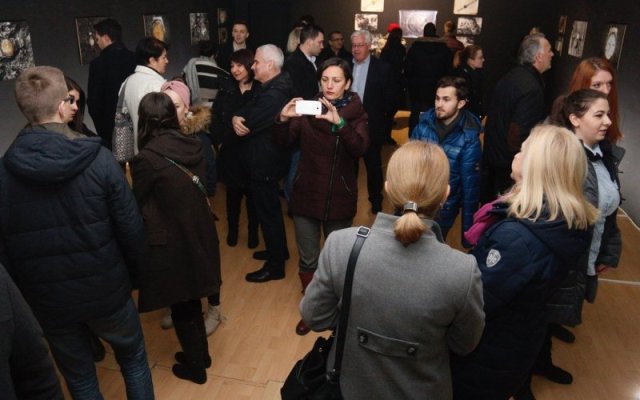
Institute for Research of Crimes against Humanity and International Law, University of Sarajevo and the
Historical Museum of Bosnia and Herzegovina opened an exhibition "When the time has stopped."
The exhibition has been opened tonight in the Historical Museum in Sarajevo. The exhibition shows
watches and other personal items that were found in a mass grave Tomasica, but also other mass graves from Prijedor and Sanski Most.
At the opening ceremony it was pointed out that the aim is to warn visitors of a time when the victims were killed whose personal things have been found, but also the fact that the time affects everything as well as the oblivion.
The idea for the exhibition was created during the work on the monograph Tomasica when it was noticed that
there’s a large number of photos with personal items. Authors of the exhibition, Dr. Mujo Begic, Fellow of the Institute and Edis Vojić, wanted to break away victims in this way from oblivion.
After Sarajevo, the exhibition will be opened in Mostar, Jablanica, Konjic, Travnik and Tuzla, and later on in the United States.
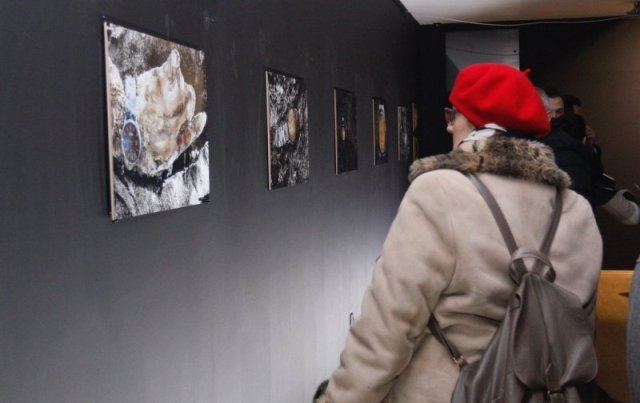
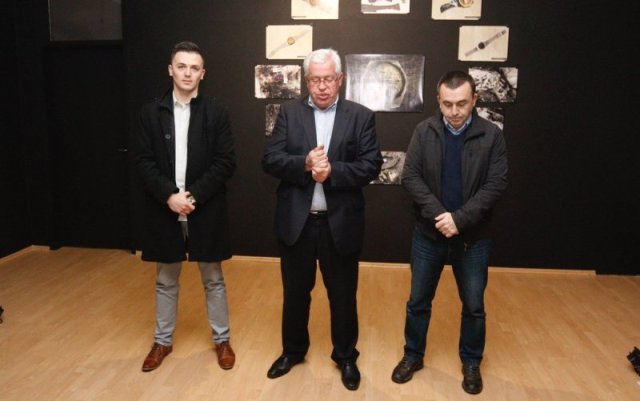
DR. DAVID PETTIGREW ACCOMPANIED BY THE DELEGATION
OF THE INSTITUTE VISITS VISEGRAD
18 July 2016
The delegation, led by the employees and associates of the Institute for Research of Crimes against Humanity and International Law, University of Sarajevo, dr. Ermin Kuka and Mr. Haris Suljovic accompanied by Dr. David Pettigrew, professor at the Southern Connecticut State University (SAD) paid a visit to Visegrad on Thursday, 14 July 2016.
On that occasion they carried on conversation with Mrs. Bakira Hasecic, the president of the association of
“Women Victims of War” and Bilal Memisevic, the president of the Islamic community in Visegrad. During
its stay, the delegation visited the living pyre in Bikavac and the Pionirska Street, where dozens of Bosniaks from Visegrad were burnt alive during 1992.
ARNE JOHAN VETLESEN PAPER IN NORWEGIAN NEWSPAPERS "MORGENGLADET"
24 June 2016
Institute for research of crimes against humanity and international law, university of sarajevo, hosted one of the most prominent norwegian philosophers dr. arne johan vetlesen in may, 2016.
During his visit to Bosnia and Herzegovina, professor Vetlesen, accompanied by the associates of the Institute Dr. Ermin Kuka and Ilvana Salic, visited Visegrad and Gorazde. In Visegrad, the delegation was welcomed by Suljo Fejzic, the Chairman of the Assembly of Visegrad municipality. The aim of the visit was to introduce the essential facts about the crimes against humanity and international law in the area of Visegrad and Gorazde.
After having returned to Norway, professor Vetlessen wrote the text on this subject entitled by “Ofrene som skammer seg”, which he published in the Norwegian newspaper “Morgenbladet”, No.24 for the period 24-30
June 2016 (pp. 26-28). In this article, professor Vetlesen, from the psychological view,
approached the analysis and elaboration of the crimes against humanity and international law committed in Visegrad and Gorazde by Serbian aggressors and criminals.
DURING THE EVENT „THE MONTH OF REMEMBRANCE OF
THE SREBRENICA GENOCIDE“THE PUBLICATIONS OF THE INSTITUTE FOR RESEARCH OF CRIMES AGAINST HUMANITY
AND INTERNATIONAL LAW WERE
PROMOTED IN SREBRENICA
6 May 2016
Institute for Research of Crimes against Humanity and International Law, University of Sarajevo, organized the event called „Month of Remembrance of the Srebrenica genocide” marking the 21st anniversary of the genocide in Srebrenica in cooperation with Bosniak Institute- Adil Zulfikarpasic Foundation and International University of Sarajevo.
During the event, in the premises of the Bosniak Institute, among other things, the promotions of the
publications of the Institute were set up, along with the book “My smile is my revenge” by Dzeva Avdic, the
author. It is an autobiographical record of a nine-year-old girl- a witness of the Srebrenica genocide, as well as Proceedings of the International scientific conference “Srebrenica 1995-2015: Evaluation of heritage and
long-term consequences of genocide”, which was held on 9-11 July 2015 in Sarajevo, Tuzla and Potocari and organized by the Institute for Research of Crimes against Humanity and International Law, University of
Sarajevo, Potocari Memorial Center, University of Tuzla and University of Sarajevo.
Due to great interest as well as the significance of publications, on Friday 8 July 2016, the promotion of the
above-mentioned publications was arranged in Bosnia Cultural Center in Srebrenica.
The publications were promoted by Dr. Rasim Muratovic, director of the Institute for Research of Crimes against Humanity and International Law, University of Sarajevo, Dr. Meldijana Arnaut-Haseljic, Mr. Zilha Kosuta and Hasan Nuhanovic. The promotion was moderated by Sadzida Dzuvic and the promotion was attended by great number of citizens of Srebrenica and various other guests.
READ THE INTERVIEW THE DIRECTOR OF THE INSTITUTE
FOR RESEARCH OF CRIMES AGAINST HUMANITY AND INTERNATIONAL LAW, UNIVERSITY OF SARAJEVO, DR.
RASIM MURATOVIC, FOR ISLAMIC NEWS MAGAZINE
PREPOROD
3 June 2016
The interview which was given by the director of the Institute for Research of Crimes against Humanity and International Law, University of Sarajevo, for Islamic news magazine Preporod no.13/1071, on 1 July 2016.
Read the interview in full by clicking on the link below:
Newspaper
THE EVENT „MONTH OF MOURNING FOR GENOCIDE IN SREBRENICA“ WAS OPENED BY THE PROMOTION OF THE
BOOK „MY SMILE IS MY REVENGE”
3 June 2016
On Wednesday, 15 June 2016, in Bosniak Institute Adil Zulfikarpasic Foundation, the event “Month of
mourning for genocide in Srebrenica” was officially opened marking the twenty-first anniversary of the
Srebrenica genocide and organized by the Institute for Research of Crimes against Humanity and
International Law in cooperation with the Bosniak Institute, Adil Zulfikarpasic Foundation and the International University of Sarajevo. The event was opened by Mr. Amina Dzuvic- Rizvanbegovic, the director of the Bosniak Institute.
The event was opened by the promotion of the book “My smile is my revenge” authored by Dzeva Avdic, which is
the autobiographical record about the genocide in Srebrenica from the memory of nine-year-old girl.
The promoters of the book were: Dr. Rasim Muratovic, director of the Institute for Research of Crimes against Humanity and International Law, University of Sarajevo, and the Dr. Fahira Fejzic-Cengic, professor at the
Faculty of Political Sciences in Sarajevo. The audience was also addressed by Dzeva Avdic, the author of the book. Moderator of the promotion was Maida Dervisevic. The promotion was attended by numerous guests from the political, academic, cultural and social life, as well as members of the Association of victims of genocide. Mirza Hatunic, the student of the Music Academy of the University of Sarajevo, performed an occasional composition playing the guitar.
DELEGATION OF THE INSTITUTE HEADED BY DR. ARNE
JOHAN VETLESEN VISITED VISEGRAD
3 June 2016
Institute for Research of Crimes against Humanity and International Law in Sarajevo, within the month of May 2016, hosted Dr. Arne Johan Vetlesen.
Professor Arne Johan Vetlesen is one of the most famous Norwegian philosophers and the professor of Political Philosophy at the University of Oslo. He is the author of over twenty books and numerous research papers and essays in which he studies the concept of evil. .
During his visit to Bosnia and Herzegovina, professor Vetlesen visited Visegrad with the associates of the
Institute, Mr. Ermin Kuka and Ilvana Salic. Suljo Fejzic, the Chairman of the Municipal Assembly of Visegrad, hosted the delegation and informed professor of the events committed at the beginning of the aggression against Bosnia and Herzegovina in 1992, in Visegrad as well as of the events committed against the Bosniak population in the city. The delegation also visited the Pionirska street house in Visegrad, where 53 Bosniak civilians were
burned alive on 14 June 1992.
DR. ARNE JOHAN VETLESEN LECTURED IN MOSTAR
3 June 2016
Professor Arne Johan Vetlesen, one of the most famous Norwegian philosophers, pays a visit to Bosnia and Herzegovina, arranged by the Institute for the Research of Crimes against Humanity and International Law. Professor Vetlesen teaches Political philosophy at the University of Oslo. He is the author of more than twenty
books and numerous research papers and essays in which he studies the concept of evil.
On Wednesday, 1 June 2016, professor Vetlesen presented the topic “After genocide, the victims are ashamed”
at the Student hotel in Mostar marking the 24th anniversary of the crime against Bosniaks in Nevesinje. The
keynote speaker was Dr. Rasim Muratovic, director of the Institute, and the event was attended by over
two hundred guests from the academic, public and cultural life, as well as a number of survivors of the genocide.
A LECTURE GIVEN BY DR. ARNE JOHAN VETLESEN “LOGIC OF GENOCIDE: BETWEEN COLLECTIVE AND INDIVIDUAL ACTION”
1 June 2016
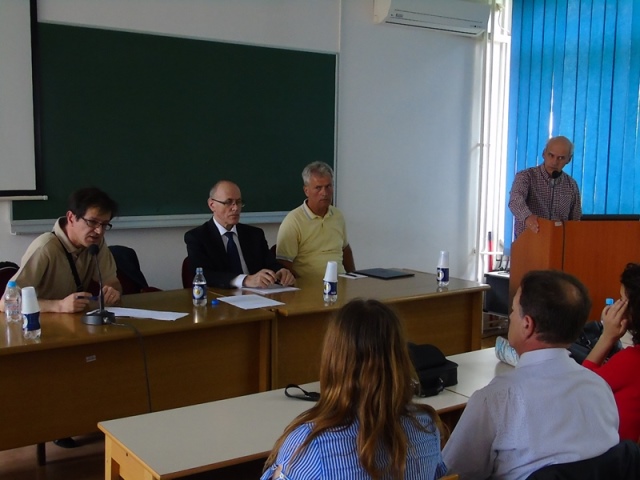
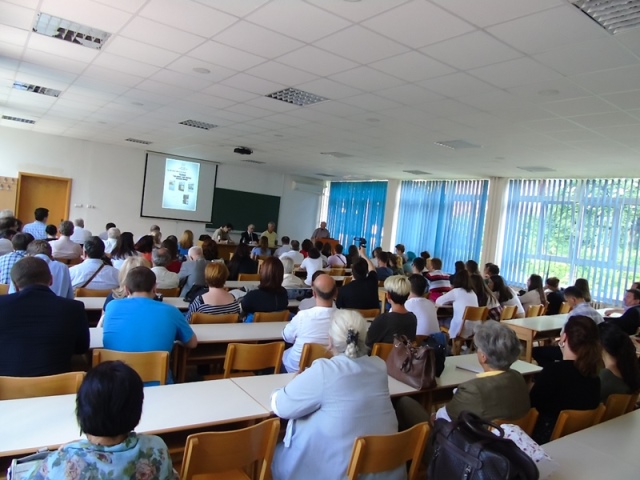
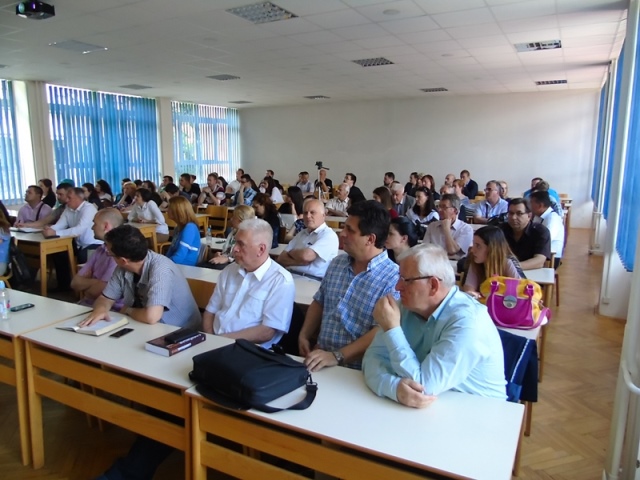
Having been organized by the Institute for Research of Crimes against Humanity and International Law in Sarajevo, on Tuesday, 31 May 2016, at the Faculty of Political Sciences in Sarajevo, Dr. Arne Johan VETLESEN gave a lecture on "The logic of genocide: between collective and individual action."
Dr.Rasim Muratovic, director of the Institute for Research of Crimes against Humanity and International Law, University of Sarajevo, as well as Dr. Smail Cekic briefly addressed students, members of the academic community, and many guests from the public and cultural life who were present there.
Professor Arne Johan VETLESEN is one of the most famous Norwegian philosophers. He is a professor of Political philosophy at the University of Oslo. He is an author of twenty books and numerous research papers and essays in which he studies the concept of evil.
In the honor of his continuous work on the study of evil, and human dignity, he was awarded Fangenes testamente (Camp-inmate’s testament, 2004), which is awarded annually by the Norwegian Institute for Peace to researchers who have made a special contribution in the fight against evil. Professor Vetlesen in his broad scientific work offered scientific and wider public the scientific truth about the events in Bosnia 1992-1995.
He has published numerous books including Evil and Human Agency, Understanding Collective evildoing (2005), Death (2004), Moralens sjanse i markedets tidsalder (2003). Vetlesen’s scientific essays are an attempt for science to be used in understanding the barbarity and criminal instincts which result in genocide, aimed at understanding causes, objectives and scale of the genocide and the prevention of genocide as a crime and evil of the highest rank.
INSTITUTE FOR RESEARCH OF CRIMES AGAINST HUMANITY AND INTERNATIONAL LAW SARAJEVO WAS DONATED FIVE THOUSAND MARKS
1 June 2016
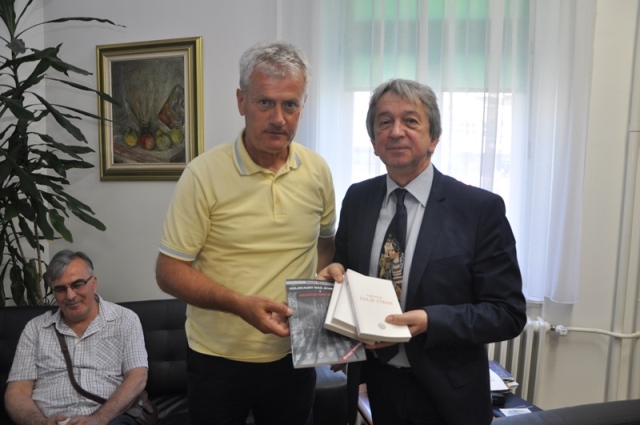
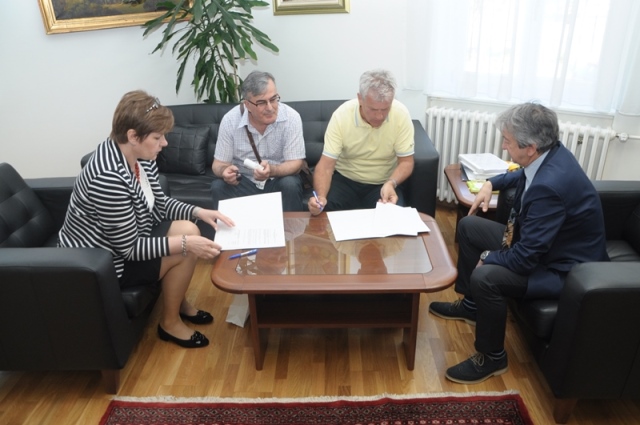
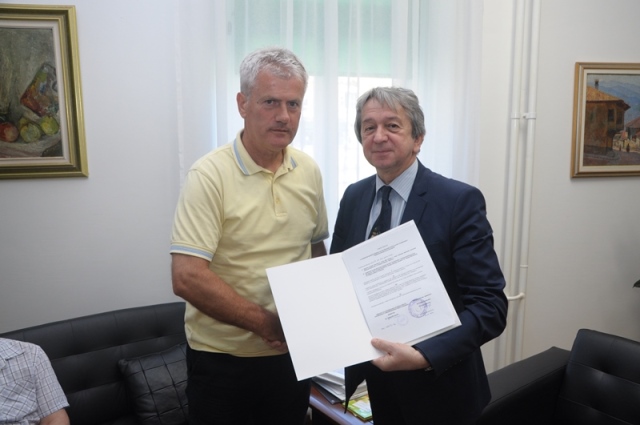
The budget of the Municipality of Sarajevo Center provided the Institute for Research of Crimes against Humanity and International Law Sarajevo with five thousand marks.
Protocol on the implementation of these funds which will be spent for the purchase of computer and related equipment, was signed by the Mayor of Sarajevo Centre, Dzevad Becirevic and director of the Institute for Research of Crimes against Humanity and International Law Sarajevo, Dr. Rasim Muratovic.
On this occasion, Director Muratovic and Secretary of the Institute for Research of Crimes against Humanity and International Law Sarajevo, Fuad Jasarevic, visited on 31 May 2016, the Municipality of Centre where Jasna Beba, secretary of the municipal administration and Mustafa Resić, adviser to the head of municipality, gave them the stated Protocol.
Director Muratovic thanked Mayor Becirevic and the Municipal Council for the support provided for the Institute for several years.
-“Donated means mean a lot to us and this is not the first time that the Municipality Centre helps us. Support of this Municipality has become traditional and this encourages us. In the hardest times, the Municipality Center was with us and I hope that such cooperation will continue in the future”, said Muratovic.
NORWEGIAN TEACHERS VISIT THE INSTITUTE
6 May 2016
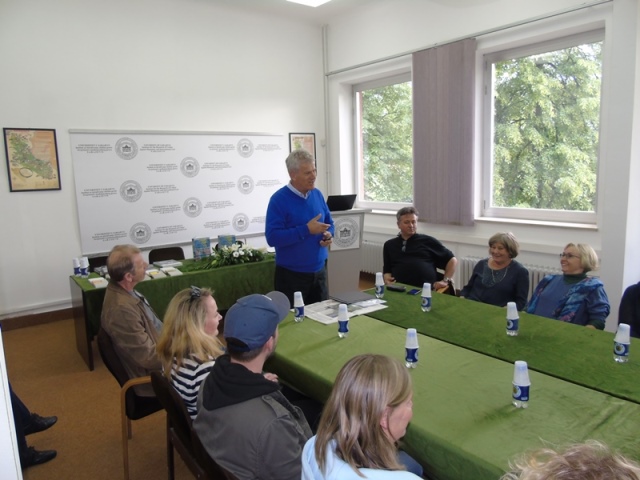
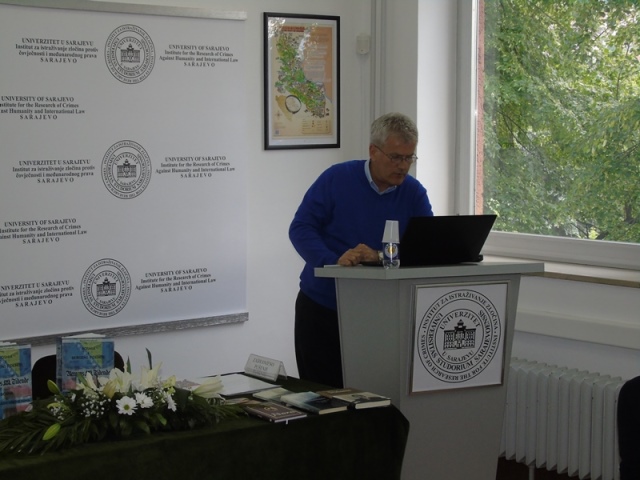
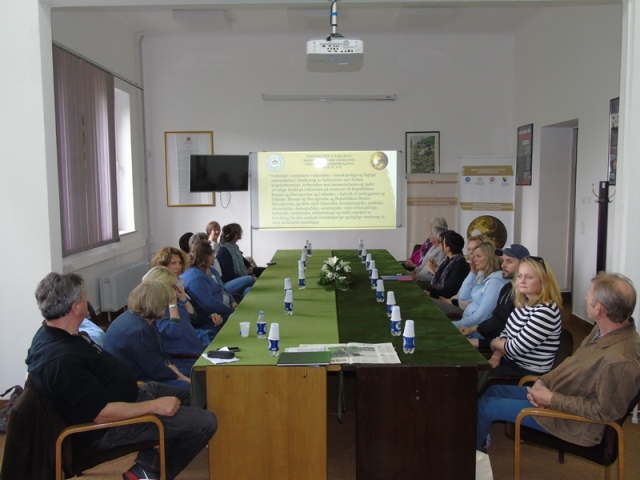
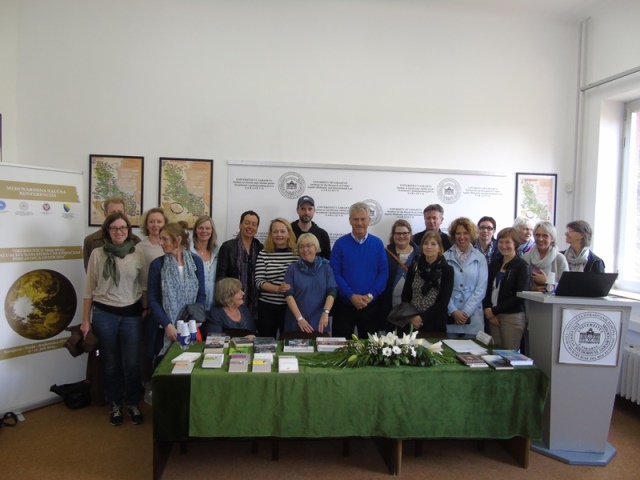
On Friday, 6 May 2016, the Institute for Research of Crimes against Humanity and International Law, University of Sarajevo, was visited by the group of Norwegian teachers. Dr Rasim Muratovic, the host of the meeting and director of the Institute, presented the guests to the activities of the Institute along to the facts about the aggression against the Republic of Bosnian and Herzegovina 1992-1995.
The new editions of the Institute for Research of Crimes against Humanity and International Law were also displayed to the visitors which include the translations of famous Norwegian authors into Bosnian language by dr Rasim Muratovic.
MR AMINA DZUVIC - RIZVANBEGOVIC, DIRECTOR OF THE BOSNIAK INSTITUTE - ADIL ZULFIKARPASIC FOUNDATION VISITS THE INSTITUTE
28 April 2016
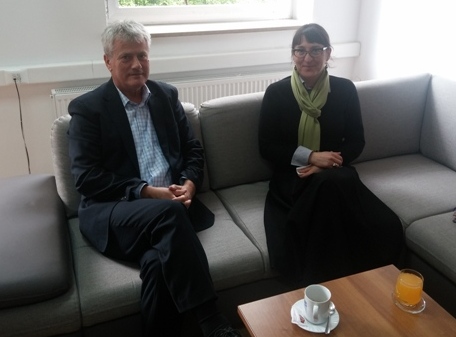
On Thursday, 28 April 2016, the Institute for Research of Crimes against Humanity and International Law, University of Sarajevo, visited Mr Amina Dzuvic- Rizvanbegovic, the director of the Bosniak Institute- Adil Zulfikarpasic Foundation.
The host of the meeting was dr Rasim Muratovic, director of the Institute and during the meeting they discussed the cooperation in connection with the marking the 21st anniversary of the genocide in Srebrenica.
DIRECTOR OF THE INSTITUTE VISITS THE CROATIAN MEMORIAL AND DOCUMENTATION CENTER OF HOMELAND WAR IN ZAGREB
25 April 2016
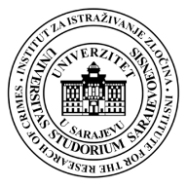
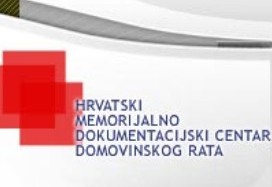
On 22 April 2016 the director of the Institute for Research of Crimes against Humanity and International Law, University of Sarajevo, while in working visit to the Croatian memorial and documentation center of Homeland War in Zagreb, met the director of the center, dr Ante Nazor. The joint meeting's goal was to introduce a host to the projects which were realized and are about to be realized by the Institute.
At the meeting, the director Rasim Muratovic met the director of the Centre, Dr Nazor with the activities and projects that the Institute caried out and the projects in preparation. The mutual interest in projects which had been carried out by both research institutions was displayed. During the meeting it has been concluded that there are a lot of points of reference on which there is a need for cooperation.
The further activities for improving cooperation and specific projects which these two research institutions will mutually implement, were agreed.
PRESS RELEASE
1 April 2016
On the occasion of the Judgment of Vojislav Seselj by the ICTY on 31 March 2016, the Institute for Research of Crimes against Humanity and International Law, University of Sarajevo, is givin a brief Press Release:
- Firstly, the researchers of genocide and other forms of crimes against humanity and international law have been surprised, shocked and outraged by the first-instance verdict;
- Secondly, the verdict is completely in contrast to the norms of the International humanitarian law as well as contrary to relevant evidence and relevant, reliable, significant and sustainable data- factual and empirical;
- Thirdly, we expect the Appeals Chamber would correct the crucial mistakes, omissions and drawbacks of what had been wrongly concluded, namely the misinterpretation, significance and meaning of all relevant evidence and facts- factual findings i.e. arguments.
DIRECTOR
Dr, Rasim Muratovic, scientific advisor
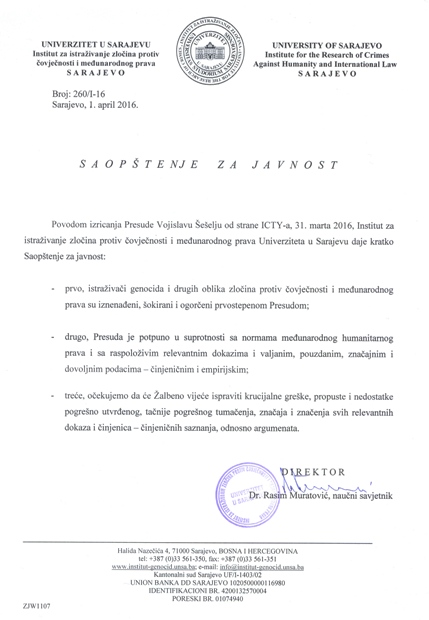
Radovan Karadzic sentenced to 40 years in prison by the first-instance verdict
28 March 2016
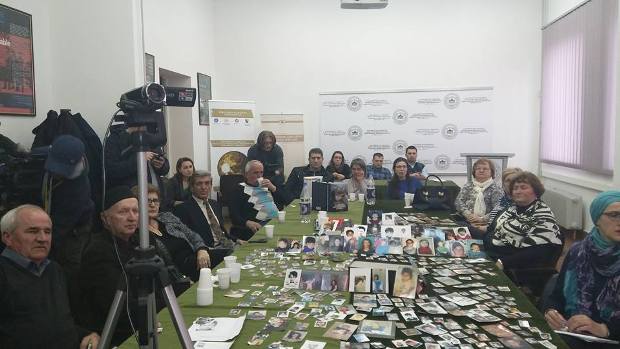
The International Criminal Tribunal for the former Yugoslavia (ICTY) sentenced Radovan Karadzic to 40 years in prison on 24 March 2016 by the first-instance verdict for the genocide, crimes against humanity and violations of laws and customs of war.
Karadzic, the first president of the Republic of Srpska and the supreme civilian commander of the Army of the Republic of Srpska during the Serbian aggression against the Republic of Bosnia and Herzegovina 1992-1995, was found guilty of 10 out of 11-count indictment at a UN tribunal in The Hague.
He was found guilty of a joint criminal enterprise in connection with the siege of Sarajevo 1992-1995 for which he bears full individual and criminal responsibility.
The Trial Chamber of the ICTY convicted Karadzic guilty of taking the UN observers hostages during the NATO air strikes on the positions of the Army of the Republic of Srpska (ARS) in 1995.
The Trial Chamber of the International Criminal Tribunal for the former Yugoslavia has decided that Radovan Karadzic is not guilty for the genocide in seven municipalities in Bosnia and Herzegovina: Bratunac, Foca, Kljuc, Prijedor, Sanski Most, Vlassenica and Zvornik which was the first of two charges of genocide.
The Trial Chamber found that the accused bears the full individual and criminal responsibility for persecution, extermination, murder, deportation and forcible transfer as the crimes against humanity and murder as a violation of the laws and customs of war for seven municipalities.
The Council stated that the members of the Bosnian Serb forces had the intention to destroy the Bosnian Muslims in the Srebrenica enclave, as such. Among other things, the Council concluded that Karadzic was the only person in the Republic of Srpska who had the power to intervene in the killing of Bosnian Muslims, but he “not only failed to prevent the killing but personally ordered the Bosnian Muslims to be transferred from Bratunac to other places in order to be killed in the Zvornik area”.
The Trial Chamber agreed that Karadzic declared war on the territory of Srebrenica on 14 July 1995- i.e. in Skelani, which allowed Drina Corps of the Army of the Republic of Srpska to use all material resources and facilitate the actions of killing.
The evidence in this case showed, as concluded by the Council, that at least five thousand (5 000) Bosnian Muslims were killed in the events specified in the part of the indictment relating to the crimes committed in Srebrenica.
When it comes to the siege of Sarajevo, the shelling and sniping campaign against civilians and civilian targets in Sarajevo, the Trial Chamber found that civilians were the direct target of the Sarajevo-Romanija Corps (SRC) of the Army of the Republic of Srpska as illustrated by sniper incidents or they were exposed to indiscriminate and excessive fire as when SRC threw air bombs and fire grenades at the locations of assembly civilians.
The three-judge panel rejected the claims of the accused that the “Bosnian forces deliberately targeted its own civilians in order to draw the international intervention.”
"The accused, Radovan Karadzic, bears individual and criminal responsibility for murder, unlawful attack on civilians and spreading terror as a violation of the laws or customs of war and murder as a crime against humanity", ruled the Trial Chamber in the part of the judgment against Karadzic referring to the holding in the siege, shelling and sniping of civilians.
The Council concluded in the part of the judgment that which founded Karadzic guilty of taking members of UN troops hostage, that Karadzic has contributed to the common goal for the UN members to be taken hostage in order to distract NATO from further airstrikes. The judges found that Karadzic was directly involved in the operation of taking UN hostages. During the reading of the judgment it was stated that Karadzic oversaw the hostage-taking, receiving reports, and presented the conditions for the release of members of the UN forces.
Karadzic's trial began in 2009 and took more than five years. Until October 2014, Karadzic was under a false name, Dragan Dabic, and after more than 13 years, was arrested in Belgrade in 2008 and transferred to the ICTY detention unit.
As witnesses for the prosecution and the defense, numerous victims, international and local experts and officials, members of UNPROFOR, as well as persons previously convicted of crimes by The Hague Tribunal appeared in the trial.
Verdict of Radovan Karadzic before the Hague Tribunal was watched by around 300 people. The director of the Institute for Research of Crimes against Humanity and International Law, University of Sarajevo, dr Rasim Muratovic, was also present and he traveled there by the organization of the Association of Victims and witnesses of genocide and the Association of Mothers of Srebrenica and Zepa. With them, there also traveled the representatives of the students of Bosanska Krajina, the representatives of missing persons from Kozarac and Prijedor, the Association of children killed in Sarajevo, the Association of peace, justice, return and reconciliation, as well as the representatives of missing and murdered persons from Zepa and the Potocari Memorial Centre.
In the premises of the Institute, the direct monitoring of verdict was organized and attended by the employees of the Institute, representatives of the Association of parents of children killed in Sarajevo, numerous guests and media representatives.
PDF KARADZIC - JUDGEMENT
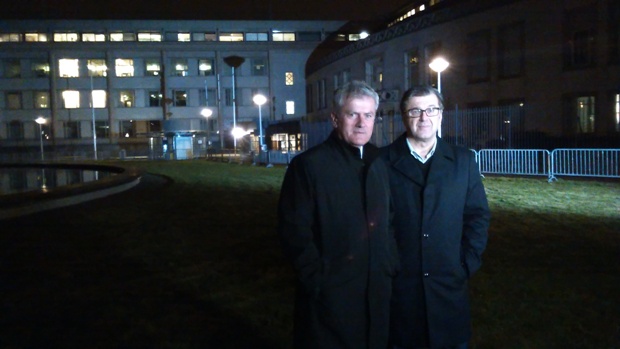 Dr Rasim Muratovic, director of the Institute and Amir Ahmic, Bosniak liaison officer in The Hague tribunal
Dr Rasim Muratovic, director of the Institute and Amir Ahmic, Bosniak liaison officer in The Hague tribunal
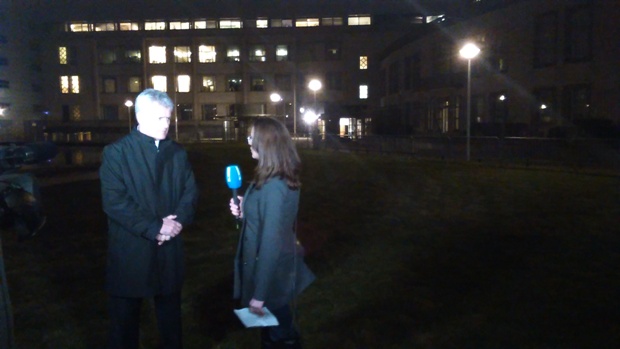
GOING TOWARD THE JUDGEMENT: Radovan Karadzic from Durmitor to The Hague
21 March 2016
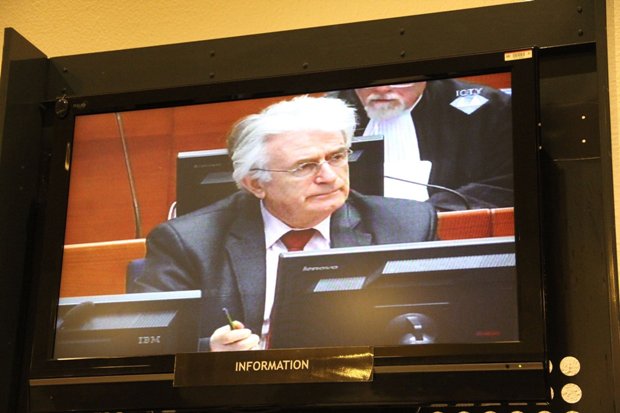
There were more than 700 mass graves: 1200 buildings of Islamic architecture were systematically destroyed and looted; 500 buildings owned by the Catholic Church and several dozens of Jewish religious sites, hundreds of thousands of houses and flats were looted, destroyed and burned to the ground.
The one who flies high, falls low. Radovan Karadzic made himself see this proverb by “flying” over the Durmitor mountain heights to the Dutch sandy plains… flying over Sarajevo in which he came in 1960 as a fourteen-year-old boy after finishing primary school in his native Petnjica, the village between Zabljak and Savnik.
Without any problems, firstly he enrolled the Medical secondary school and subsequently the Medical faculty, University of Sarajevo. For many young people of that time enrolling one or the other, especially both the school and faculty of this kind was just an abstract noun. A secret hand opened widely the door of Sarajevo to Vuk’s son, a member of the fascist Chetnik movement of Dragomir Drazo Mihailovic during WWII.
He didn’t like cities
…And not just the door of Sarajevo was opened for him. The student’s volunteering in Denmark is what followed as well as the medial specialty in the USA etc. He got employed at the state University Medical Centre in Sarajevo immediately after graduation. Then he got married and was given the apartment in the center of Sarajevo, fifty meters away from the Central Committee building of the League of Communists of Bosnia and Herzegovina, at the street of the revolutionary name Sutjeska 2, and max three hundred meters away from the Clinic where he was everything but the director.
Radovan didn’t like cities that was written down in one of his poems on the eve of nineties: “Down to the cities to fight the bastards”. Radovan especially didn’t like Sarajevo justifying it by one of the Serbian myths according to which Sarajevo “was built on the holy Serbian land”. Radovan was spreading hatred and igniting the fire of nationalism, chauvinism and fascism by his myth-based speeches which were well accepted in the time of decaying of a system and state disintegration. In that vacuum Radovan Karadzic and his cooperatives were daily directed from the highest places in Belgrade while they behaved as protectors of Serbianism, Christianity and Europe in exchange for the destruction of those who were engineered barriers and opposite of all these i.e. Bosniaks.
“For just a few day Sarajevo will be destroyed to the ground and 500 000 of them will be dead. Within a month, Muslims of Bosnia and Herzegovina will be destroyed.” These are the words which Radovan Karadzic told his close ally Momcilo Mandic, in early October 1991 (i.e. six months before the start of the Bosnian war) and therefore mathematically precise he explained genocidal and mapped plan of Belgrade Greater politics and his mathematically projected consequences by the logic of the Holocaust. The consequences were the following: 2 200 000 persons were displaced which makes more than a half of total population of the Republic of Bosnia and Herzegovina. According to the census of March, more than 100 000 people were killed; around 30 000 women, young girls and men were raped and sexually abused; 650 of concentration camps were formed through which about 200 000 inmates passed out of which 200 were killed. There were more than 700 mass graves and 1 200 buildings of the Islamic architecture were systematically destroyed and looted; 500 buildings owned by the Catholic Church and several dozens of Jewish religious sites, hundreds of thousands of houses and flats were looted, destroyed and burned to the ground. Between 60 and 70 percent of the total housing units were damaged in the Republic of Bosnia and Herzegovina; various infrastructure facilities in the field of transport and communication were destroyed while numerous industrial buildings, farms, hotels, motels and tourist centers as well as various small private craft and shopping outlets were destroyed and damaged. 60 percent of industrial facilities and 55 percent of health facilities were destroyed while 349 doctors were killed and almost all educational, scientific, cultural and sports facilities were destroyed. The National Library was burned down as well as the Oriental institute.
These are just fundamental results of the ground Serbism and geopolitical grand-mania, fascist, dark and aggressive-conquering mentality of the Serbian duo Slobodan Milosevic from the Left River and Radovan Karadzic from Petnjica on Durmitor mountains. They were of rural mentality which (led by the logic of plowing boundaries and brigandage of neighbor’s fields) was seen in each of their gestures. Even limited military mind of Ratko Mladic even from the conceptual stage of the Great Serbian project called everything that was listed by genocide, asking himself at one of the military-political meeting:” I don’t know how Krajisnik and Karadzic will explain this to the world. This is genocide, dear people.”
In the third amended indictment of the International Criminal Tribunal for the former Yugoslavia in The Hague, Radovan Karadzic was charged, among others, with genocide, crimes against humanity and international law and violation of the laws and customs of war, as follows:
Article I- Genocide: Radovan Karadzic by prearrangement committed, planned, instigated and/or aided and abetted genocide over the part of the national, ethnic and/or religious groups of Bosnian Muslims and/or Bosnian Croats as such. Radovan Karadzic participated in joint criminal enterprise to permanently remove Bosnian Muslims and Bosnian Croats from the area of Bosnia and Herzegovina which were the Serb-claimed territories. The intention to partially destroy these groups is manifested in the most extreme way in Bratunaac, Foca, Kljuc, Prijedor, Sanski Most, Vlasenica and Zvornik.
Article II: Genocide: Radovan Karadzic participated in joint crirminal enterprise to eliminate Bosnian Muslims by killing men and women from Srebrenica as well as by forcible removal of women, girls and the part of older men.
Article III- Persecution: Radovan Karadzic is specifically charged with the persecutions in the following municipalities: Banja Luka, Bijeljina, Bosanski Novi, Bratunac, Brcko, Foca, Hadzici, Ilidza, Kljuc, Novi Grad, Novo Sarajevo, Pale, Prijedor, Rogatica, Sanski Most, Sokolac, Visegrad, Vlasenica, Vogosca, Zvornik as well as persecutions from Srebrenica.
Articles IV, V, VI. Extermination, murder: Radovan Karadzic by arrangement with others committed, planned, instigated, ordered and abetted the extermination and murder of Bosnian Muslims and Bosnian Croats from Srebrenica and Sarajevo.
Articles VII, VIII- deportations, inhumane acts: Forced displacement of Bosnian Muslims and Bosnian Croats from Bosnian Serb-claimed territory by means which included the crimes of forcible transfer and deportation.
Articles IX, X- Terror and unlawful acts: Radovan Karadzic participated in joint criminal enterprise to establish and carry out the campaign of sniping and shelling against the civilian population of Sarajevo. By sniping and shelling thousands of civilians of both sexes and of all ages, including children and the elderly were killed and wounded.
Article XI- taking of Hostages: Radovan Karadzic by arrangement with others committed, planned, and instigated, ordered and/or aided and abetted taking the UN military observers and UN peacekeepers as hostages. Between approximately 26 May 1995 and 19 June 1995 ARS detained over two hundred peacekeepers and UN military observers in various locations including Pale, Sarajevo, Banja Luka and Gorazde and held them hostage at various locations.
General Allegations: All acts and omissions the accused was charged with as the crimes against humanity and international law, with the exception of the one as the part of the campaign of sniping and shelling of Sarajevo, were the part of a widespread and systematic attack directed towards the civilian population of Bosnia and Herzegovina. Victims of all crimes that were alleged as violations of common article II of the Geneva Conventions of 1949 were persons taking no active participation in hostilities.
They are all guilty
What has been known as a scientific fact for a long time is that Radovan Karadzic as the president of the Republic of Srpska and Supreme Commander of the Armed Forces was an exponent of Belgrade and the Serbian political, military and police regime. This regime planned, organized, prepared and carried out the aggression against internationally recognized country, the Republic of Bosnia and Herzegovina. Radovan Karadzic was encouraged and helped by JNA and he performed political and armed rebellion against the constitutional order of the Republic of Bosnia and Herzegovina which represents the most serious offense in all socio-political systems.
The main objective of this aggressive war-mongering politics, led by Millosevic and Karadzic as his assistant in the case of Bosnia and Herzegovina, was the war with the purpose of conquering territory as well as expulsion and physical liquidation and elimination of non-Serbs from criminally conquered areas. All these acts were done under the flag of fascist ideological fanaticism of the “national threat”. Under that motto the wars from Slovenia to Kosovo were led along with the systematic and media propaganda about the alleged “demonization of the Serbs”. All were to blame: Muslims, Croats, Albanians, Ustashas, Bali, KLA, and the Green Berets, the mujahedeen, NATO, CIA, the intelligence services of France, Germany, the Vatican, and Tehran… All but them were guilty. Shortly, a lie is ubiquitous and methodologically designed constant that verbally supports and evaluates every war option, massacre and each and every crime. At the same time, the Serbian “victories” and eulogies were counting.
Crimes which preceded those “victories” were displayed as a suicide treacheries of the victims themselves:
Muslims are shelling themselves, KLA is displacing, and NATO makes people flee, French secret services organized the genocide in Srebrenica.
This is, namely, the essence of the Greater expansionist, aggressive and warrior, criminal and genocidal policies and practice, drenched in blood and violence of logic of fascistic-drawn “ethnic cleansing”. When the results of Milosevic and Karadzic’s evil are inspected thoroughly today, it is logical to wonder: What were those men like? What were the millions of those who obediently followed, extolled and celebrated them like?
“Are those people different from all of us” is what Stenley Milgram, the American psychologist at Yale University wondered studying the psychological profile of Nazis in WWII. “Were those people corrupted, damaged and ready for commission of evil? Or was it just an unfortunate combination of various factors which created a defective and sick person?” It is not impossible that the case of Milosevic and Karadzic, in the social broadest sense of the word, is about “the ideas and beliefs that must be considered as mental illness in the world of modern civilization.”
It suggests that some views and values, despite its commonsense abnormalities in certain areas are being cared for as dominant not allowing others to be developed. It produces catholicity of personal mutual similarity of a number of individuals which will ease the division of the planned set of roles. Certain personality types correspond to each other and to a particular time. It was noticed that the neurotic and hysterical characters could be found together. Radovan, just like Slobodan legitimated themselves as the people of lies, hatred and exclusion. A hundred and thousands were killed, millions of marginalized and displaced non-Serbs were the price of their ethnic pride and ethnic Nazis complacency. However, everything was for nothing. Great-objective was not achieved. Eventually, a normal man is to be asked: “What for were all those dead heads and permanent unfinished wars?”
It remains for science the task to investigate the social, economic, political, psychological, historical and all other assumptions that have contributed to the biggest crimes at the end of the XX century. The accused war criminal Radovan Karadzic will be sentenced on Thursday, on the eve of Good Friday (according to Gregorian calendar), on 24 March 2016, for all crimes against humanity and international law committed by the formations, the police and army of the Republic of Srpska whose supreme commander was Karadzic. According to the rules of the International Criminal Tribunal for the former Yugoslavia the penalty for the crimes the accused Karadzic is charged with can be life imprisonment or 40 years in prison. For him, personally, it is almost irrelevant which of the two penalties would be imposed.
For victims, a life sentence for Karadzic would be something that is implied and a minimum below which there is nowhere to go. Life sentence would be a glimmer of comfort for victims, a little satisfaction and great hope that justice is still attainable and that it is still over injustice in this mute and unjust world. Whatever the judgment is, it will be of great importance, especially for science. Holocaust was a “dumb” tragedy that began to truly unfold only when there appeared valued sociologists, anthropologists, historians, poets, writers and philosophers who gradually created the vocabulary for its articulation because suppression of any form of verbiage is nothing but a form of dehumanization.
We, at the Institute for the Research of Crimes against Humanity and International Law, University of Sarajevo, want to explore the problem of crimes of this kind and talk about it in a scientific way. We are not interested in that problem from the political, moral or penal standpoint, but in a particular event which we want to explore and display scientifically i.e. objectively. The scientific method of research must be objective, quantified, non-ideological, non-political and not necessarily historical. Science is not the field where the competition of who has suffered the most victims and been an object of criminal actions of the “others “should take place, but the science is an attempt for the resources and power of science to be used for sudden, but regular burglary barbarism and criminal instinct in a large number of people to be understood and eventually to be blocked. Is there a more relevant sample than that of Radovan Karadzic, the president of the Republic of Srpska in the period from 17 December 1992 to 19 July 1996?
(The text of the director of the Institute for Research of Crimes against Humanity and International Law, University of Sarajevo, dr Rasim Muratovic, having been published in Oslobodjenje on 19 March 2016 (pp. 26,27); the text is also available on the web page of Oslobodjenje at: http://www.oslobodjenje.ba/pogledi/u-susret-presudi-radovan-karadzic-od-durmitora-do-haaga)
DIRECTOR OF THE INSTITUTE HAS VISITED PALESTINIAN EMBASSY
19 February 2016
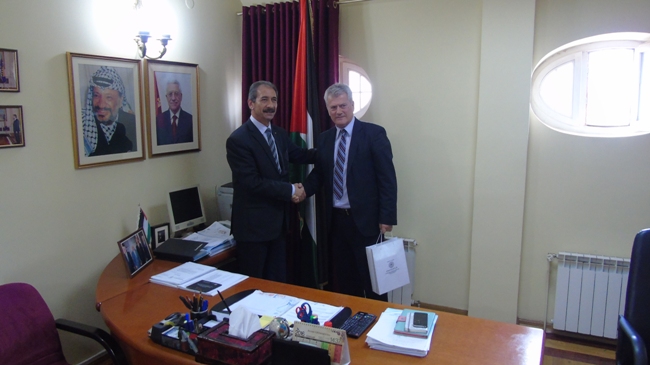
Director of the Institute for Research of Crimes against Humanity and International Law, University of Sarajevo, dr. Rasim Muratovic along with the scientific advisor mr Ermin Kuka, aa senior associate came on an official visit to the Embassy of the State of Palestine in Bosnia and Herzegovina on 19 February 2016. On that occasion they had a meeting with the Ambassador of the State of Palestine in Bosnia and Herzegovina, Nj.E. Rezeq Namoore.
During the meeting the projects of the Institute were discussed as well as the importance of research of crimes against humanity and international law in Bosnia and Herzegovina with the special emphasis having been put on crimes which were committed against the Palestinian people. They discussed the possibilities of cooperation between scientists and researchers from these two countries, as well.
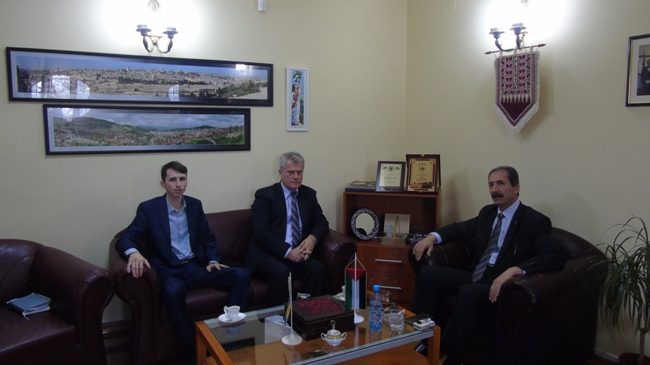
HIGH-SCHOOL GRADUATES OF „OBALA“ VISIT THE INSTITUTE
15 February 2016
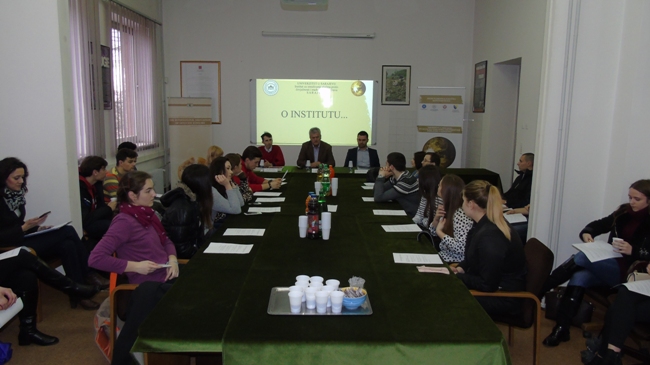
Institute for Research of Crimes against Humanity and International Law, University of Sarajevo, was visited by High-school gradutes on 15 February 2016.
High school studentss have payed a visit accompanied by the History teacher, Mrs. Snjezana Melunovic.
The host was the director of the Institute, dr Rasim Muratovic who introduced students to the history and activities of importance of the Institute.
Mr Ermin Kuka, a senior associate of the Insititute gave a presentation entitled „Methods of collecting data on crimes and relevant data sources“ using the project „The genocide in Brcko 1992-1995“ as the exemplary study. Mr Muamer Dzananovic, a senior associate of the Institute, as well, gave a lecture entitled “Methodology of field research on the example of the Crimes against children in Gorazde during the siege 1992-1995”.
After the lectures, the discussion took place and the Institute made a present of its most important publications to the students as well as the library of High school “Obala”.
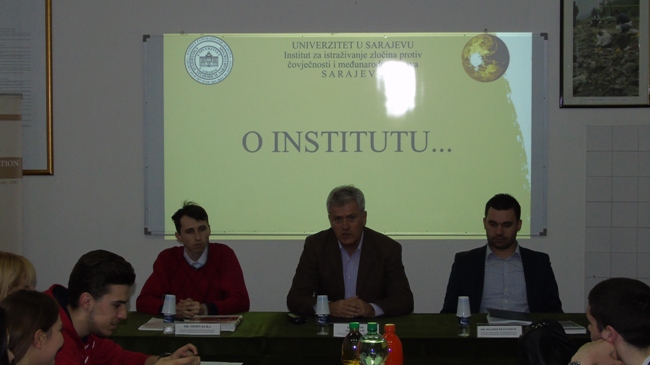
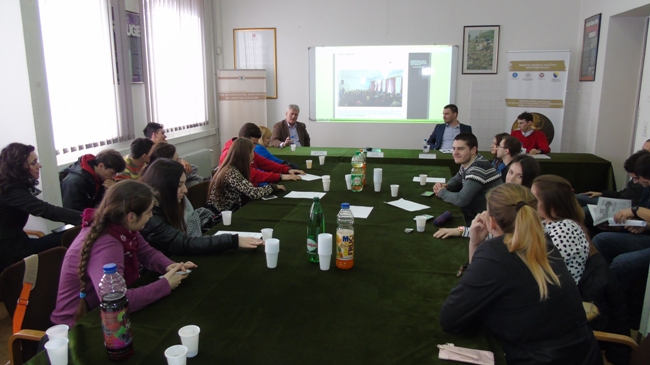
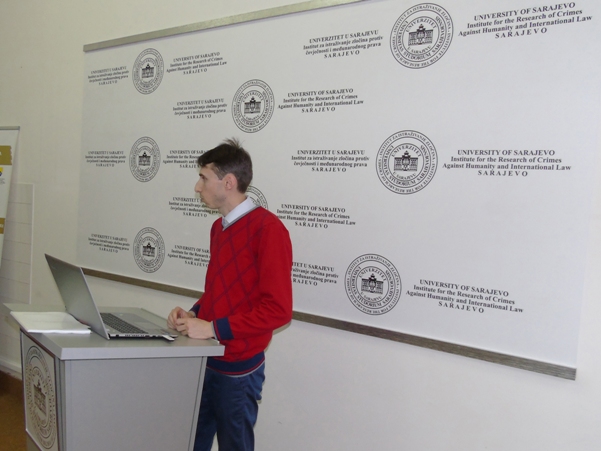
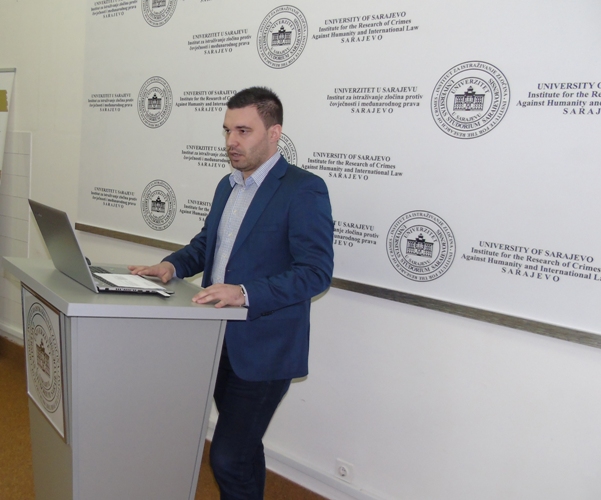
THE DEBATE HELD ON THE OCASSION OF THE INTERNATIONAL DAY OF HOLOCAUST REMEBRANCE
3 February 2016
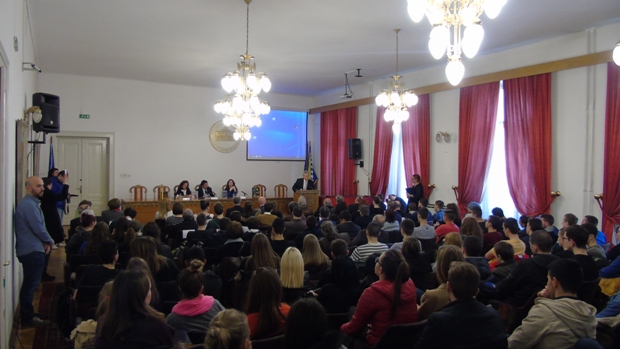
On the occasion of January 27- International day of Holocaust remembrance, Institute for Research of Crimes against Humanity and International Law, University of Sarajevo, in cooperation with the vice-chancellor’s office organized debate on the Holocaust remembrance on 3 February 2016, Wednesday, at the Conference Hall.
The following scientists participated in the debate with their presentations:
Dr. Elias Tauber, Anti-Semitic propaganda through writing of Novi list,
Mr Sabina Subašić- Galijatović, Institute for Research of Crimes against Humanity and International Law, University of Sarajevo, The suffering of children in the Holocaust,
Mr Zilha Košuta, Institute for Research of Crimes against Humanity and International Law, University of Sarajevo, Mostar- the place of rescuing Jews from Yugoslavia.
The Vice-Chancellor for scientific and research/artistic and research field of University of Sarajevo dr. Faruk Mekic and dr Rasim Muratović, director of the Institute for Research of Crimes against Humanity and International Law addressed the audience. The presentations were attended by senior students from several secondary schools along with the numerous guests from academic, public, cultural and political life in Sarajevo Canton.
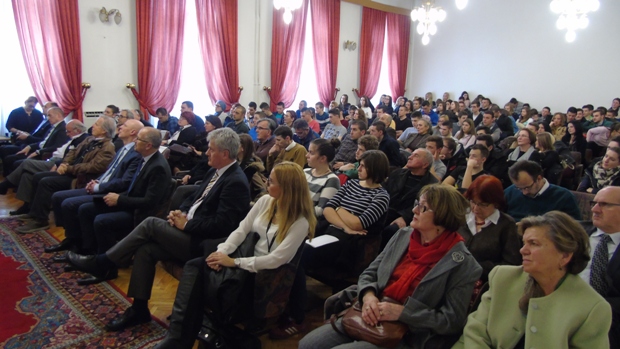
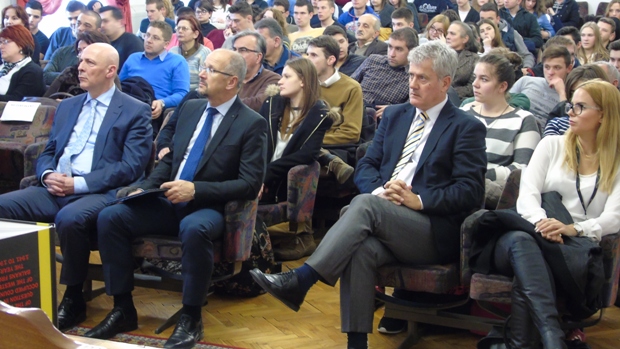
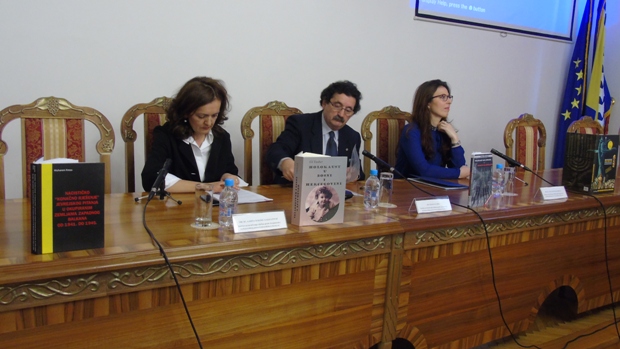
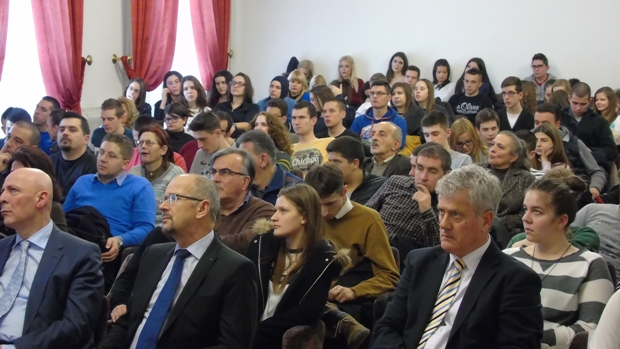
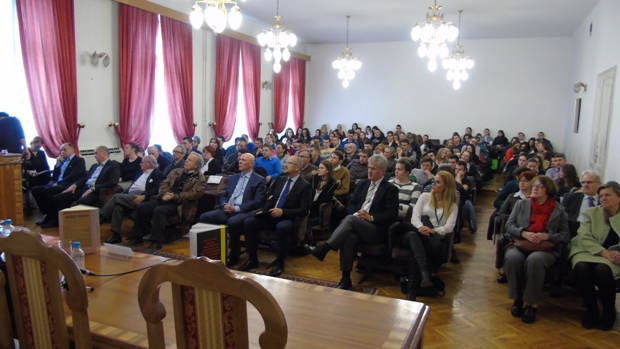
DEAR BOSNIANS FROM THE DIASPORA,
1 January 2016
Twenty years after the aggression against Bosnia and Herzegovina, a great number of Bosnians in many countries all around the world from Canada to New Zealand have established themselves in various fields of academic, economic, cultural and political life. We are aware of the fact that Bosnia and Herzegovina is deep in your heart and that you, in many ways, make a great contribution to the development of Bosnia and Herzegovina along with the spreading truth about what happened during the aggression 1992-1995.
Institute for Research of Crimes against Humanity and International Law, University of Sarajevo, as the institution of considerable importance, the main aim of which is scientific establishment of facts about crimes against humanity and international law committed on its soil, has published 103 scientific papers, out of which 14 were translated into foreign language (English and Norwegian) for more than two decades of its existence.
In contrast to that, Institute has translated five editions from English, four editions from Norwegians and one edition from German into Bosnian language. Institute has so far released ten of its editions bilingually (English-Norwegian). You would agree that this is quite unpretentious. Therefore, we refer this letter to you, our dear Bosnians from the Diaspora, and we kindly ask you to make an extra effort and translate at least one work published by the Institute into the language you speak in the country of your residence.
We are also aware of the fact numerous publications came out in languages of the country where you live which are closely related to Bosnia and Herzegovina, therefore, we kindly ask you to translate the works which are close to your vocation into Bosnian language. We remind you of the fact that there are institutions in every country which support, partly or fully, the projects of this kind. For any further information, feel free to contact us.
With respect,
D I R E C T O R
Dr. Rasim Muratović, scientific adviser
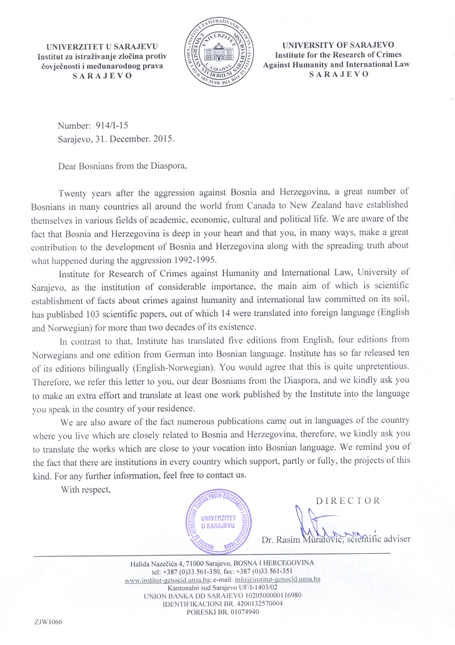
IT WAS HELD THE PROMOTION OF THE BOOK “BOSNIA IS APPROACHING THE PEACE WITH ITSELF”
15 December 2015
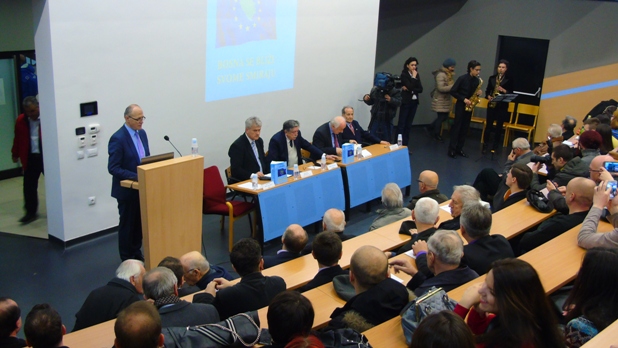
The book titled “Bosnia is approaching the peace with itself” by the academician and respectable professor Dr Omer Ibrahimahic was promoted at the Faculty of Political Sciences in Sarajevo on 15 December 2015 and published by the Institute for Research of Crimes against Humanity and International Law.
The book was promoted by Dr. Rasim Muratovic, director of the Institute for Research of Crimes against Humanity and International Law, University of Sarajevo, Dr. Esad Zgodić, a full-time professor at the Faculty of Political Sciences and Ibrahim Spahić. The moderator of the promotion was the academician, Dr. Smail Cekic while the audience was addressed by the author himself, as well.
The promotion was attended by numerous people from the academic, cultural and public life of Bosnia and Herzegovina, as well as a great number of students of the Faculty of Political Sciences in Sarajevo.
The promotion was also attended by the students of High Music School in Sarajevo who performed two compositions.
J.S.Bach : two-voiced invention
Duet of saxophonists:
Mirza Sijerčić, 1st grade
Enida Guja, 4th grade
Professor: Adnan Cico
A.Piazzolla : VIOLENTANGO
Quartet of accordions:
Mirza Maguda, 4th grade
Asmir Hamzić, 4th grade
Ivor Javor-Korjenić, 2nd grade
Haris Kaltak, 2nd grade
Professor: Alen Hodžić

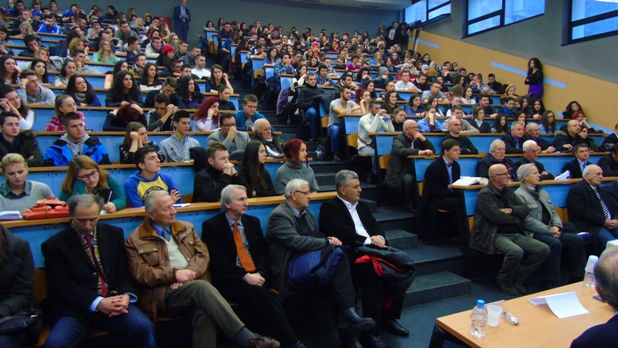
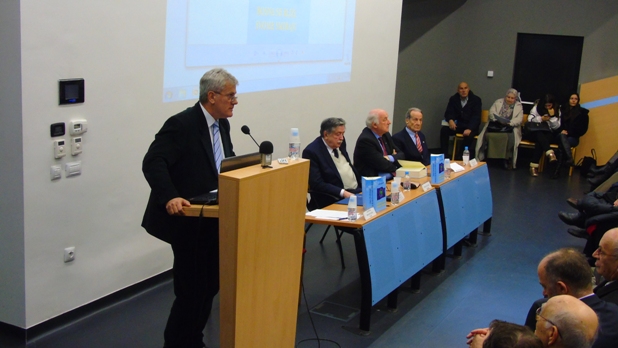
DAVID PETTIGREW VISITS INSTITUTE
27 November 2015
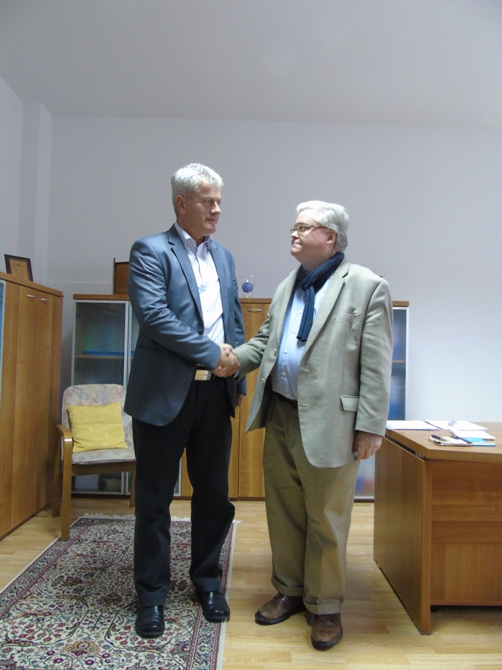
David Pettigrew, PhD, Connecticut State University, USA, visited the Institute for Research of Crimes against Humanity and International Law on Friday, 27 November 2015.
On that occasion, he discussed with Dr Rasim Muratovic, the director of the Institute, the current projects of the Institute, the importance of the investigation of crimes against humanity and international law in Bosnia and Herzegovina and worldwide, as well as the issues of the denial of genocide.
PROMOTION OF THE MONOGRAPH "CRIMES AGAINST CHILDREN in Gorazde during the siege 1992-1995"
4 November 2015
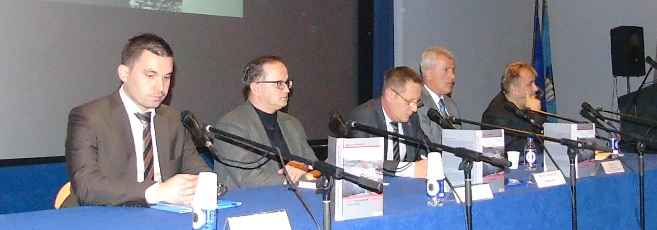
On Wednesday, 04 November 2015 in the Multimedia Room of Novi Grad, Sarajevo, it was promoted the monograph of “Crimes against children in Gorazde during the siege 1992-1995” by Muamer Džananović, MA, which was published by the Institute for Research of Crimes against Humanity and International Law, University of Sarajevo.
The monograph is the result of author’s five-year-long empirical research, in which all the facts about crimes against children in Gorazde during the siege 1992-1995 were set out in serious and scientifically-based methods.
The book was promoted by Dr. Rasim Muratovic, director of the Institute for Research of Crimes against Humanity and International Law, University of Sarajevo, Dr. Ibraković Dzelal, professor at the Faculty of Political Sciences in Sarajevo and Avdo Huseinovic, the publicist. It was particularly noted the addressing of Naza Gazibara, the mother to whom the aggressor from the same shell in Gorazde on 20 April 1994 killed two sons, Nermin (1985) and Amir (1989) as well as her cousin Pilav Dženita (1984) while her husband and her were seriously injured with the implications even today. During the siege of Gorazde, in 1993, her sister, Dženita’s mother was also killed.
The promotion was attended in the crowded Multimedia Room of Novi Grad Municipality, Sarajevo, by parents and relatives of children who were killed in Gorazde, people from the political, cultural and public life, numerous guests and several hundred citizens of Sarajevo. The promotion was opened by performing the composition by Johann Sebastian Bach, "Prelude from Suite no. 2 ", by Alek Isakovic playing the cello, a student of the Music High School in Sarajevo in the class of Professor Anela Smajic.
Mr. Muamer Džananović was born in Gorazde in 1985. He works as a senior associate at the Institute for Research of Crimes against Humanity and International Law, University of Sarajevo. He graduated from the Department of Philosophy and Sociology at the Faculty of Philosophy, and gained MA degree at the Faculty of Political Sciences in Sarajevo. He is currently a PhD student at the same university.
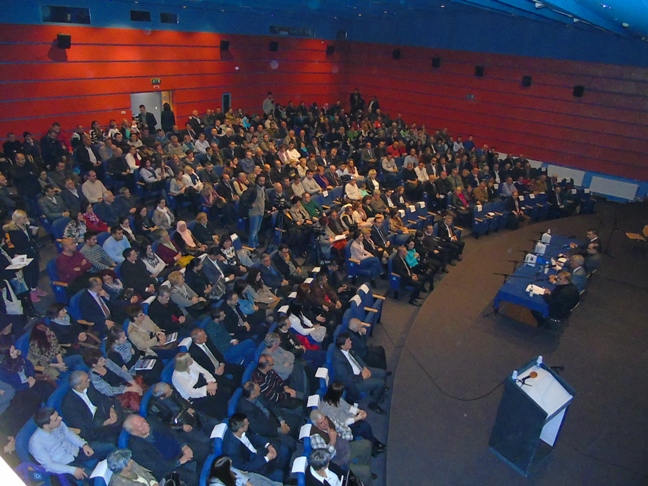
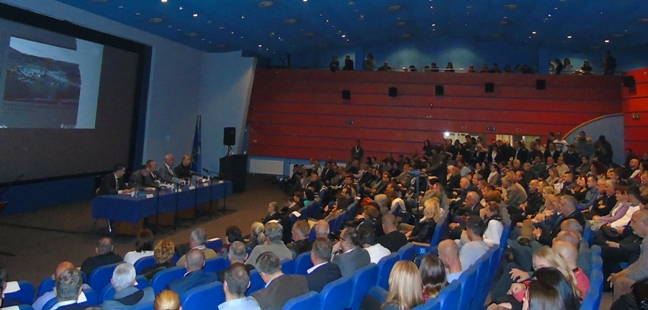
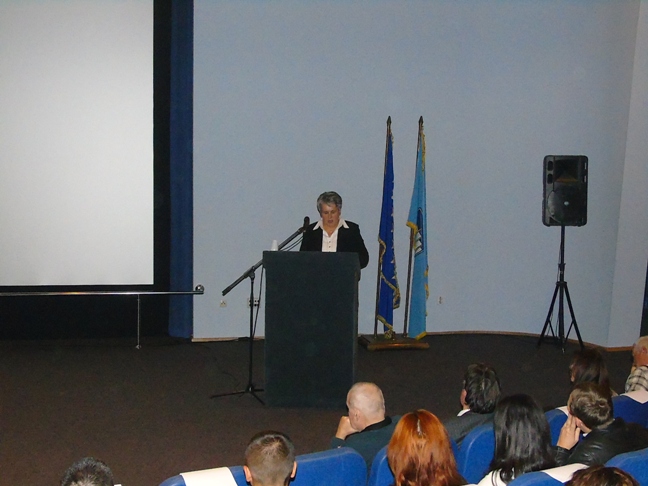
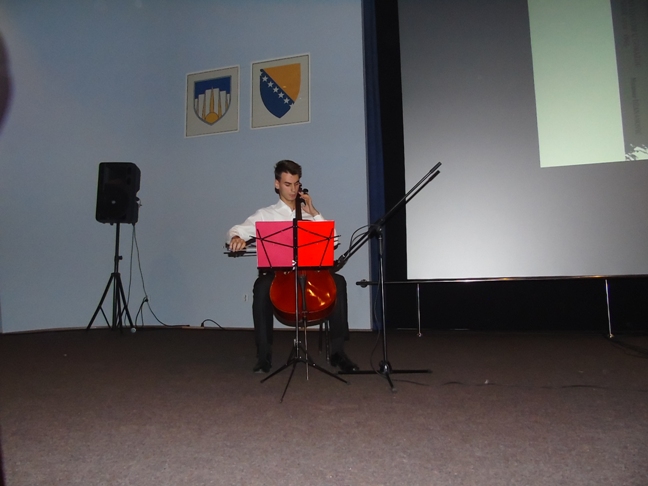
Mr. FEHIM ŠKALJIĆ VISITS INSTITUTE
16 October 2015
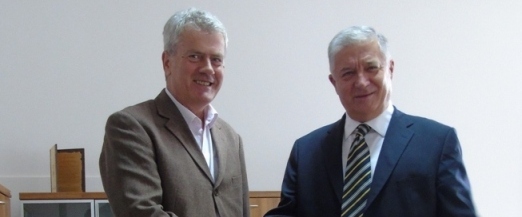
Fehim Škaljić, the member of the House of Representatives of the Parliamentary Assembly of Bosnia and Herzegovina visited the Institute for Research of Crimes against Humanity and International Law, University of Sarajevo, on Friday, October 16, 2015.
At the meeting Dr. Rasim Muratović, the director, made Mr. Fehim Škaljić acquainted with the most important research projects of the Institute, which were realized or the implementation of which is still in progress. They also talked about the need to launch new research projects in order to fully illuminate the scientific truth about the crimes against humanity committed during the period 1992-1995.
On Mr. Fehim Škaljić’s initiative they also discussed about the need for Institute to launch the initiative to hold an international scientific conference on the phenomenon of modern migration and mass appearance of the arrival of refugees in Europe.
THE PROMOTION OF MONOGRAPH "Crimes against children in Gorazde during the siege 1992-1995"was held in Gorazde
19 September 2015
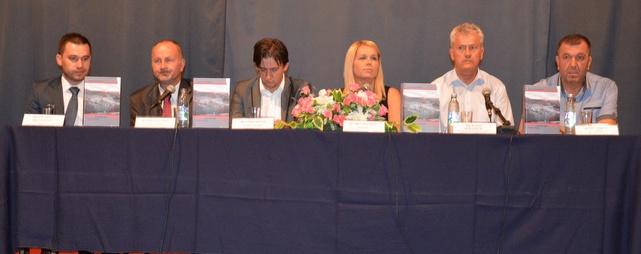
Today (Saturday, 19 September 2015) at the Great Hall of the Center for culture Gorazde was promoted the monograph“Crimes against children in Gorazde during the siege 1992-1995” by the author Mr. Muamer Džananović. It was published by the Institute for Research of Crimes against Humanity and International Law, University of Sarajevo.
The monograph is the result of author’s years-long scientific and empirical research, in which all the facts about crimes against children in Gorazde during the siege 1992-1995 were set out by a serious and scientifically-based approach.
The book was promoted by Dr. Rasim Muratovic, director of the Institute for Research of Crimes against Humanity and International Law in Sarajevo, Mr. Emir Oković, Prime Minister of BPC Gorazde, Hamid Bahto, the general of ARBiH, and efendi , the Mufti of Gorazde. The promotion was moderated by Elvira Aganović.
In the crowded hall of the Culture Centre of Gorazde the promotion was attended by parents and relatives of children killed in Gorazde and people from political, cultural and public life of Bosnian-Podrinje Canton, numerous guests and several hundred citizens of Gorazde.
Mr. Muamer Džananović was born in Gorazde in 1985. He works as a senior associate at the Institute for Research of Crimes against Humanity and International Law, University of Sarajevo. He graduated from the Department of Philosophy and Sociology at the Faculty of Philosophy, and gained MA degree at the Faculty of Political Sciences in Sarajevo. He is currently a PhD student at the same university.
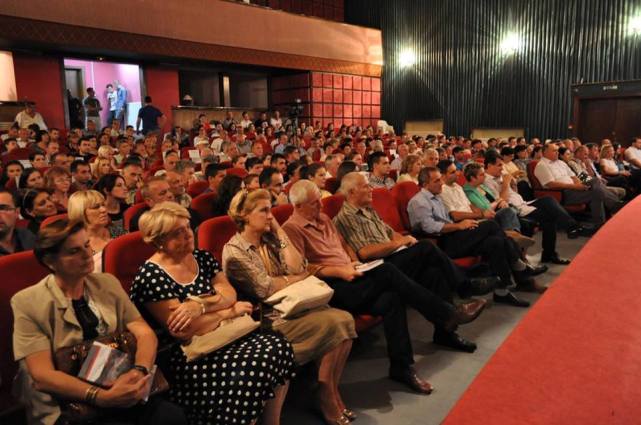
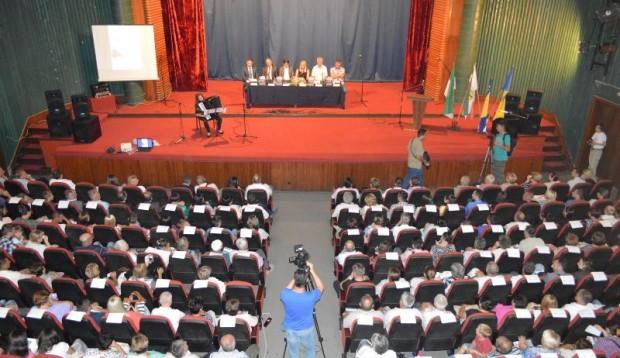
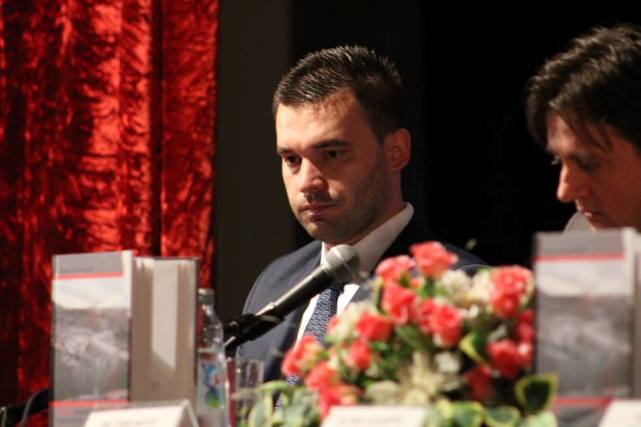
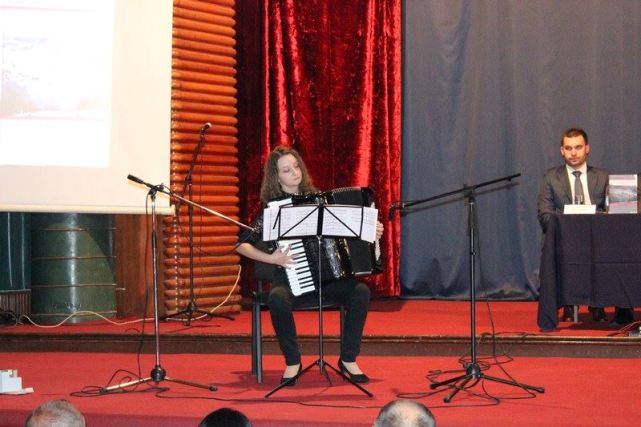
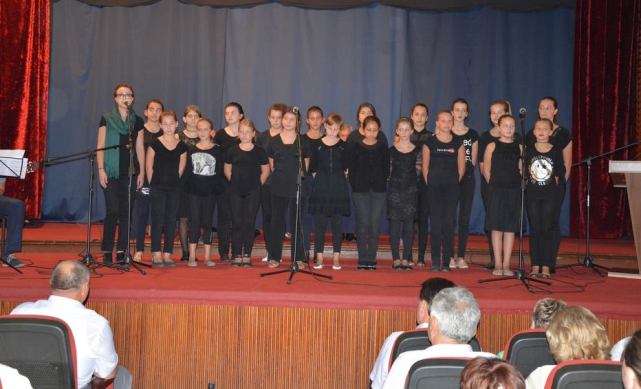
Delegation from the Institute along with the guests of the Conference visited Visegrad
14 July 2015
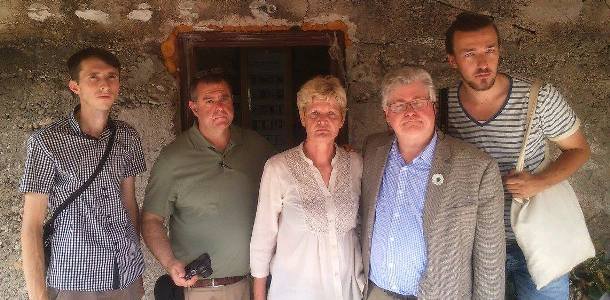
Employees of the Institute Mr. Ermin Kuka and Ilvana Salic, along with the participants of the conference 'SREBRENICA 1995-2015: EVALUATION OF HERITAGE AND LONG-TERM CONSEQUENCES OF GENOCIDE" and Dr. David Pettigrew (Southern Connecticut State University, USA), Dr. Benjamin Moore (Fontbonne University, USA) and Mr. Marketa Slavko (University of Prague, Czech Republic) visited Visegrad on Tuesday, 14 July 2015.
On that occasion they met Mr. Hasecic, the president of the association "Women-Victims of War", and they toured the living pyres in Bikavac and Pionirska Street, where dozens of Visegrad Bosniaks in 1992 were burned alive. The delegation also visited the cemetery "Stražište", where there is a monument to the victims of Visegrad.
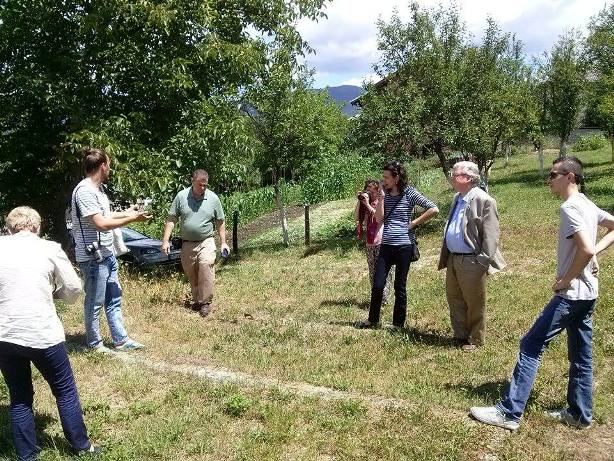
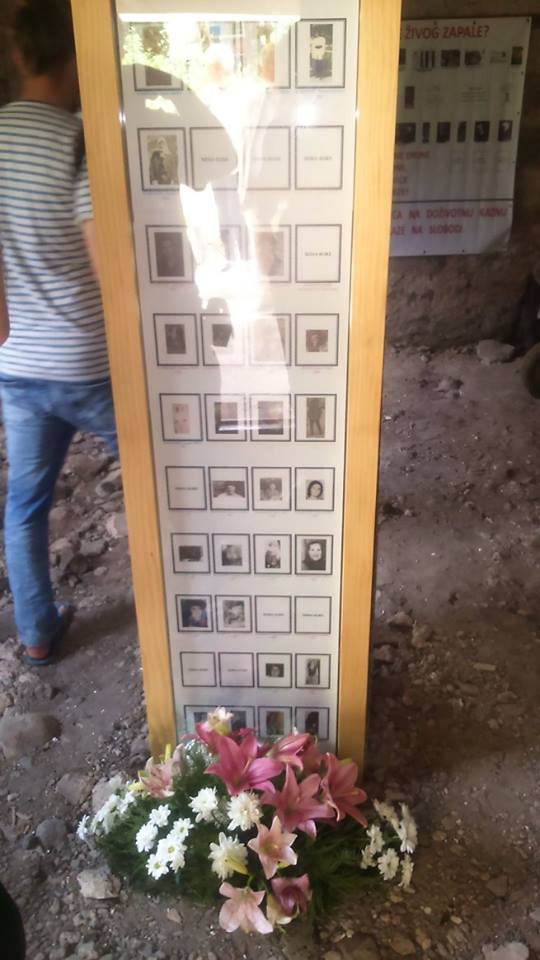
Organizing committee for marking the 20th anniversary of the Srebrenica genocide condemns attack on Vucic
14 July 2015
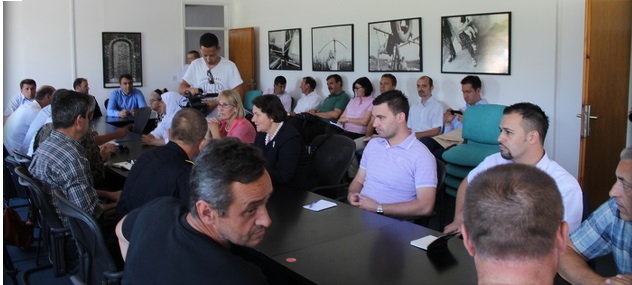
An emergency meeting of the Organizing Committee for marking the 20th anniversary of the genocide in Srebrenica was held today (14th July) in the Potočari Memorial Centre.
Due to the occasion of unfortunate events and attacks on Serbian Prime Minister Aleksandar Vucic Organizing Committee has issued a number of conclusions.
The Organizing Committee has concluded that they did everything in their power for the commemoration and funeral to be organized as well as possible.
According to the second conclusion the Organizing Committee strongly condemns the attack on Prime Minister Vucic who was received by the victims of genocide have with dignity that belongs to all state officials regardless of which country they come from.
The third conclusion is that the Organizing Committee will continue to do everything in its power for commemoration and funeral to be organized even better in order to avoid incidents that could affect the coexistence in Srebrenica.
The fourth conclusion is that the Organizing committee would like to thank the distinguished Grand Mufti Husein efendi Kavazovic for his personal contribution to the improvement of the situation that happened on 11 July 2015.
The Organizing Committee stated that funeral was attended by some 70,000 people who came by 392 buses and around 6,000 passenger cars. The funeral was attended by 10,000 participants of Peace March and 500 motorcyclists and 300 cyclists. In addition to that, more than 100 delegations were there.
The meeting of the Organizing Committee was attended by Mr. Muamer Džananović, a senior associate at the Institute.
THE INTERNATIONAL SCIENTIFIC CONFERENCE “SREBRENICA 1995-2015: EVALUATION OF HERITAGE AND LONG-TERM CONSEQUENCES OF GENOCIDE” WAS MARKED
13 July 2015
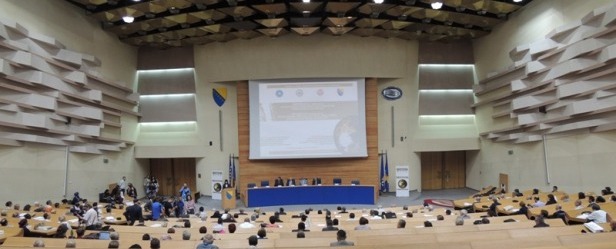
Institute for Research of Crimes against Humanity and International Law, University of Sarajevo, the Memorial Centre Srebrenica - Potocari Memorial and Cemetery for the victims of the genocide of 1995, University of Tuzla and University of Sarajevo organized a three-day International scientific conference:
"SREBRENICA 1995-2015: EVALUATION OF HERITAGE AND LONG-TERM CONSEQUENCES OF GENOCIDE"
Sarajevo - Tuzla - Srebrenica (Potocari): 9-11. July 2015, that was attended by more than 80 renowned researchers from the country and the world.
The opening ceremony of the Conference took place on Thursday, 9 July 2015, in the Great Hall of the Parliamentary Assembly of Bosnia and Herzegovina where, in addition to the participants, many guests from the political, public and cultural life attended.
On the first day of the Conference within 6 separate but interrelated sessions, more than 48 participants of the Conference presented.
The second day of the Conference was held on Friday, 10 July 2015 in Tuzla, where twenty-seven participants from the country and the world held speeches within two sessions. The participants of the Conference also visited Identification centre (PIP) in Tuzla.
The final day of the Conference was held on 11 July in Potocari, Srebrenica. The members of the Conference visited the exhibition “Ars memoriae” by the famous Bosnian sculptor Adis Fejzić which was staged under the sponsorship of the Bosniak Institute-Adil Zulfikarpašić Foundation in the Battery factory as the part of the Conference program.
Participants also attended the commemoration and burial genocide victims. The Conference was closed in Potocari with award presentation ceremony for the institutions which made the greatest contribution to the organization of the Conference.
The address by the Director of the Institute for Research of Crimes against Humanity and International Law Dr.Rasim Muratovic was attached.
Attached is the address by the Director of the Institute for Research of Crimes against Humanity and International Law Dr . Rasim Muratovic.
Address by dr. Rasima Muratovića
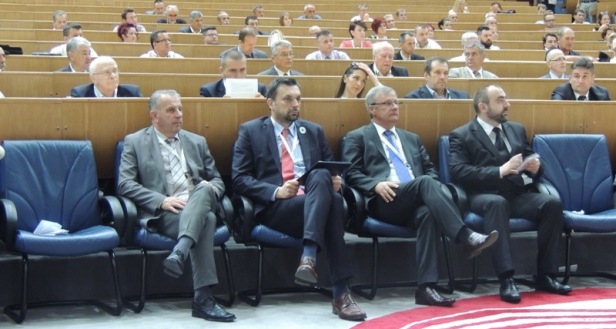
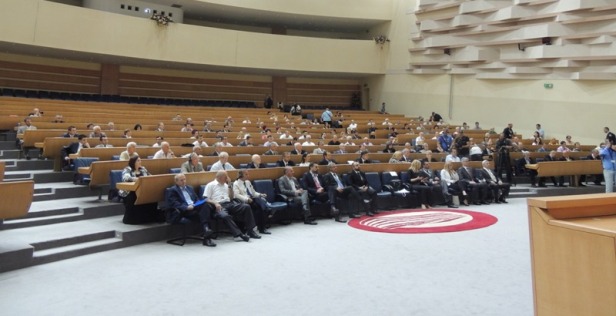
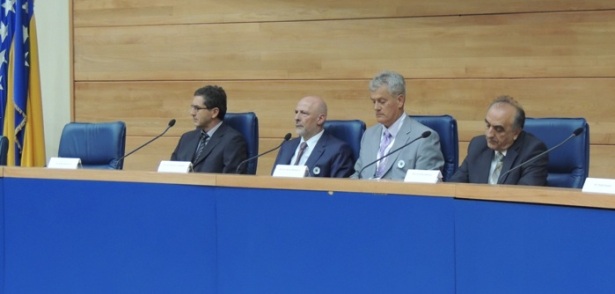
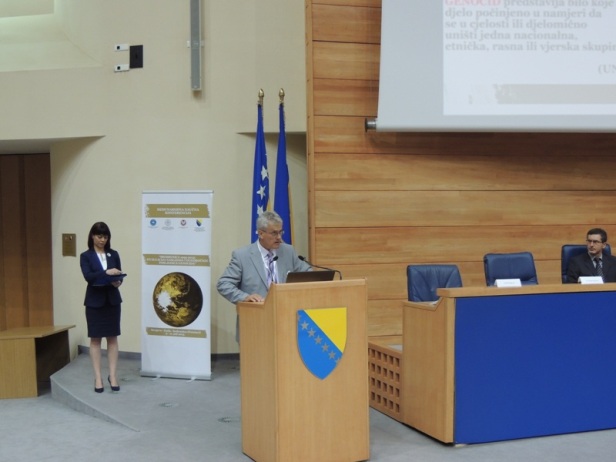
THE NINTH MEETING OF THE ORGANIZING COMMITTEE MARKING THE 20TH ANNIVERSARY OF GENOCIDE IN SREBRENICA WAS HELD
7 July 2015
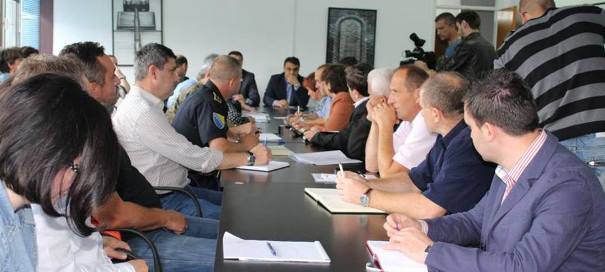
In the Potocari Memorial Centre it was held today (7 July) the ninth i.e. the last meeting of the Organizing Committee celebrating the 20th anniversary of the genocide in Srebrenica.
It is expected that collective funeral and memorial service on July 11, marking the 20th anniversary of the genocide in Srebrenica, will be attended by more than 50,000 people, and there will be buried 136 recently found victims of the genocide.
We recall that the International scientific conference "Srebrenica 1995-2015: Evaluation of heritage and long-term consequences of genocide", is the part of the official program which will be held in Sarajevo, Tuzla and Potocari from 9 to 11 July 2015. The conference organizers are the University of Sarajevo - Institute for Research of Crimes against Humanity and International Law, Memorial Center Srebrenica - Potocari Memorial - Memorial and Cemetery for the victims of the genocide of 1995 and the University of Tuzla.
Program and abstracts of the participants can be found at the home website of the Institute.
The meeting of the Organizing Committee was attended by Mr. Muamer Džananović, a senior associate at the Institute.
The eighth meeting of the Organizing Committee marking the 20th anniversary of Genocide in Srebrenica was held
29 June 2015

In the Memorial Centre Potocari, today on 29th June, the eighth meeting of the Organizing Committee marking the 20th anniversary of genocide against Bosniaks in Srebrenica was held.
The following conclusions were drawn: the main goal of the Organizing Committee is to organize a dignified burial for 135 newly-identified victims of the genocide and to allow families, friends and citizens from more than 40 countries around the world, who come to the funeral, to graciously honor the victims.
They pointed out that all other people who want to come to Srebrenica are welcome. The members of Organizing Committee are satisfied that the security measures are at highest level and the preparations proceed according to planned schedule and program.
Mr. Muamer Dzananovic, research associate, attended the meeting on behalf of the Institute for Research of Crimes against Humanity and International Law.
The seventh meeting of the Organizing Committee marking the 20th anniversary of genocide in Srebrenica was held
23 June 2015
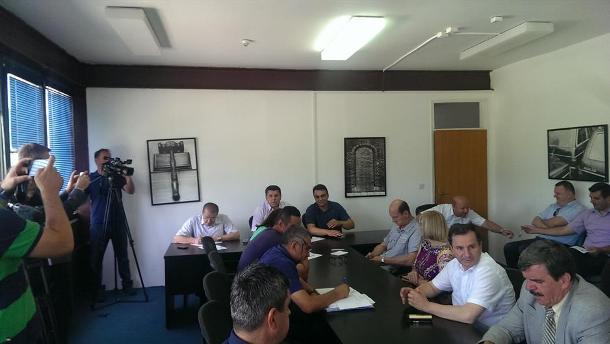
The seventh meeting of the Organizing Committee marking the 20th anniversary of the genocide against Bosniaks in Srebrenica was held today (23rd June) in the Potočari Memorial Center.
The only topic of today’s meeting was the arrest of the commander of defense of Srebrenica Naser Orić. After addressing of several members of the Organizing Committee, the following conclusions were made:
1. Organizing Committee fully supports all attitudes and actions of the President of the Organizing Committee
2. Organizing Committee was were concerned about the latest developments regarding the arrest of the symbol of the defense of victims of genocide, Naser Orić, and about complete security situation in the Municipality of Srebrenica;
3. Organizing Committee urges the authorities of Bosnia and Herzegovina to immediately get in touch and meet the authorities of Switzerland in order to resolve the problem of Naser Oric’s arrest.
4. According to the opinion of the Organizing Committee, if the case of Naser Orić is not positively solved in the following days, they will have to postpone all activities planned for July 11 due to moral, security, rational and other reasons.
The conclusions were unanimously supported by all members of the Organizing Committee. On behalf of the Institute for Research of Crimes against Humanity and International Law, University of Sarajevo, Muamer Džananović, research associate, attended the meeting.
Visit of the representatives of Institute for Islamic tradition of Bosniaks
17 June 2015
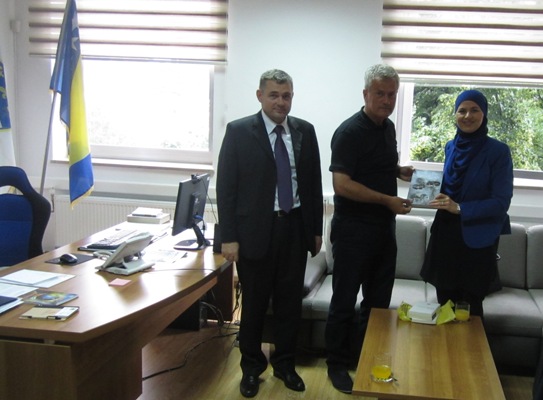
On 17 June 2015 the representatives of the Institute for Islamic tradition of Bosniaks i.e. director of the Institute Dr Dževada Šuško and Dr Elvir Duranović, research associate, visited the Institute for Research of Crimes against Humanity and International Law, University of Sarajevo.
During that meeting, they talked about possible cooperation and participation in scientific-research projects with the director of the Institute Dr Rasim Muratović. They also agreed about the exchange of publications between these two institutes.
Members of International Multi-religious Intercultural Centre (IMIC) visit the Institute
16 June 2015
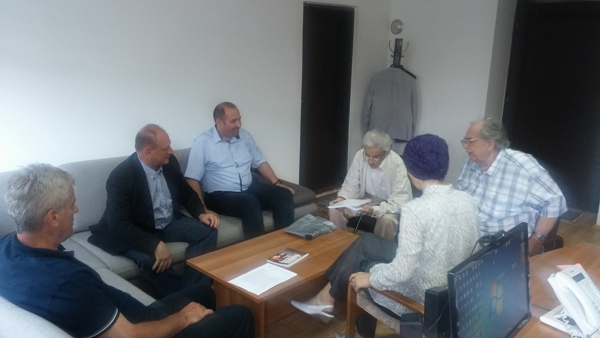
The members of International Multi-religious and Intercultural Centre (IMIC) Marko Oršolić, MoriC Albahari, Zilka Spahić-Šiljak, Goran Bubablo and Slobodan Šoja visited the Institute for Research of Crimes against Humanity and International Law, University of Sarajevo, on Tuesday 16 June 2015.
The host of the meeting was the director of the Institute Dr. Rasim Muratović, and at the meeting the mutual cooperation was primarily discussed. They were agreed about the implementation of the joint project “Dealing with the past in the northeastern Bosnia”.
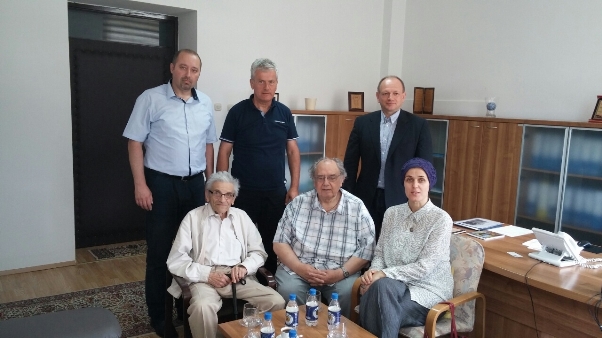
The sixth meeting of the Organizing committee for marking the 20th anniversary of genocide in Srebrenica
4 June 2015
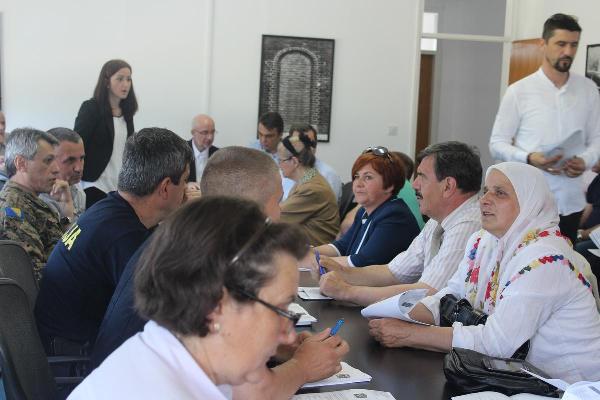
The sixth meeting of the Organizing committee for marking the 20th anniversary of the genocide against Bosniaks in Srebrenica was held today at the Memorial center in Potocari.
The chairman of the committee for marking the 20th anniversary of genocide against Bosniaks, Ćamil Duraković, announced the audience that all segments of organization of this event are according to schedule in order for commemoration to be done gracefully.
The organizing committee enacted the program of marking the anniversary. Untill today, 115 of victims were identified and they will be buried in the Memorial Centre Potocari on 11 July 2015.
The Organizing Committee decided that guests will not lay wreaths at the day of commemoration and burial i.e. on 11 July 2015. The members stated that all guests who came to worship the victims of genocide would be given a flower they would be able to lay it at the Memorial Center. The goal of this decision is that all activities are according to planned schedule.
We remind you of the part of the official program of the international and scientific conference “Srebrenica 1995-2015: Evaluation of heritage and long-term consequences of genocide” which will be held in Sarajevo, Tuzla and Potocari in the period of 9-11. July 2015. The organizers of the conference are: Institute for Research of Crimes against Humanity and International Law, University of Sarajevo, Memorial centre Srebrenica, Potočari Memorial-Memorial and Cemetery for the victims of the genocide of 1995 and the University of Tuzla.
The meeting of the Organizing Committee was attended by Mr. Muamer Džananović, Senior Associate of the Institute.
The award for peace and progress of the University of Sarajevo was awarded today to Dr Arne Johan VETLESEN
27 May 2015
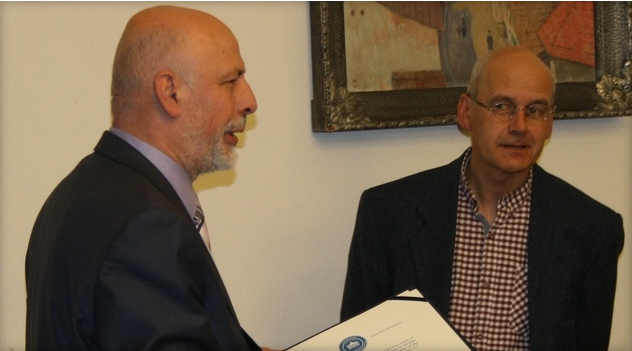
Dr Arne Johan VETLESEN received the Award for Peace and Progress of the University of Sarajevo for outstanding contribution to promotion and reputation of the University of Sarajevo in the country and abroad, and the development of peace, humanism and progress. The award was organized on Wednesday, May 27, 2015 at the hall of Rectorate of the University of Sarajevo.
The Award for Peace and Progress of the University of Sarajevo was handed to Dr VETLESEN by Prof Muharem Avdispahić, Rector of the University of Sarajevo.
Professor Arne Johan VETLESEN is one of the most famous Norwegian philosophers. He is a professor of Political philosophy at the University of Oslo. He is also the author of twenty books and numerous scientific papers and essays in which studies the concept of evil.
Due to his continuous work on the study of evil, and human dignity, he was awarded by Fangenes wills (camp inmates testament, 2004) which is an annually award giving by the Norwegian Institute to the Peace researchers who have made a special contribution in fighting against evil. Professor VETLESEN in his broad scientific opus has offered to the scientific and general public the logical truth about the happenings in Bosnia in 1992-1995.
He has published a number of books including the Evil and Human Agency, Understanding Collective Evildoing (2005), Smerte (2004), Moralens Sjanse and Markedets Tidsalder (2003). VETLESEN scientific essays are attempts of understanding the barbarity and criminal instincts that enda with genocide, with the aim of understanding the causes, objectives and scale of the genocide, and the prevention of genocide as a crime and evil of the highest rank, said the Department of Public Affairs, University of Sarajevo.
Dr Rasim Muratovic, director of the Institute for Research of Crimes against Humanity and International Law, translated the book authored by Dr. VETLESEN "What is ethics" on Bosnian language.
Bosnian translation of the book “What is Ethics” authored by Arne Johan Vetlesen has launched
26 May 2015
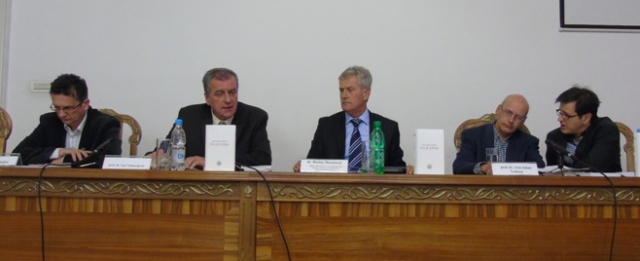
The promotion of the book "What is Ethics" written by leading Norwegian philosopher Arne Johan VETLESEN was held on Tuesday, May 26, 2015 at the Conference Hall of the Rectorate of the University of Sarajevo. The Institute for Research of Crimes against Humanity and International Law, University of Sarajevo published the book.
Prof Ugo Vlaisavljević and Prof Asim Mujkic were promoters of the book. Dr Rasim Muratovic addressed the audience on behalf of the publisher and as a translator of the book. Author himself, Arne Johan VETLESEN, also addressed the audience.
The promotion also participated the students of the Music High School in Sarajevo constituted by: Tarik Djurdjevic, Sheila SMRKOVIC Mensud Imamovic (violin); Aydin Mulabdić, Alexander Mirnić (viola); Selma Hrenovica, Emina Catovic (cello) and Ahmetspahić Adi (bass). Head of the ensemble was professor Marina Tomic who performed two compositions by Edvard Grieg, Norway's most famous composer (Aase's death and Anitra's Dance).
Many guests attended the promotion, and the translation of the book “What is ethics” in Bosnian language by the promoter assessed as a significant contribution in this area.
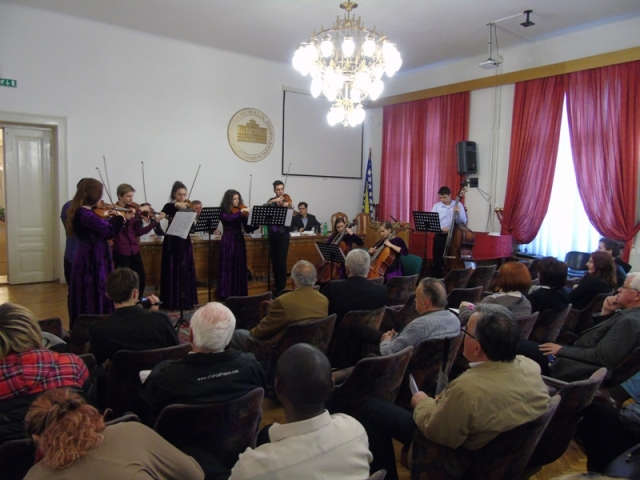
The launch of the book «Genocide in Brcko 1992-1995» authored by Dr Rasim Muratovic and Mr Ermin Kuka
25 May 2015
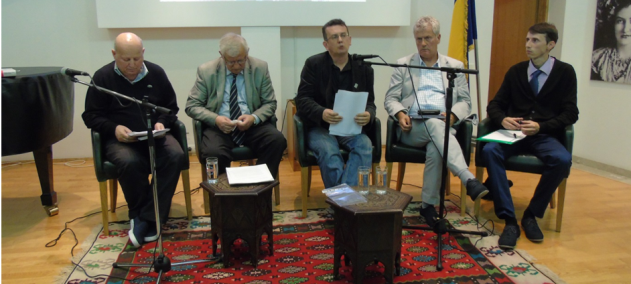
The launch of the book «Genocide in Brcko 1992-1995» authored by Dr Rasim Muratovic and Mr Ermin Kuka was held in Brcko on Friday, May 22. The Institut for Research Crimes against Humanity and International Law is the publisher of the book.
The audience were addressed by Dr Rasim Muratovic, director of the Institutte who gave speach on behalf of the Publisher while the book was promoted by Prof Mirko Pejanovic, Prof Asim Mujkic and Prof fra Mile Babic.
Director of the Institute Dr. Rasim Muratovic said that the book is a scientific study that contains causes, objectives and scope of the crimes committed in the Brcko area during the period 1992 -1995. The book contains the names of civilians who were killed in the region: 403 of them. Other crimes, such as deportation, rapes, and injuries are also mentioned in the book. The goal was to offer the lection for all who want to learn that this never happens again to nobody and nowhere.
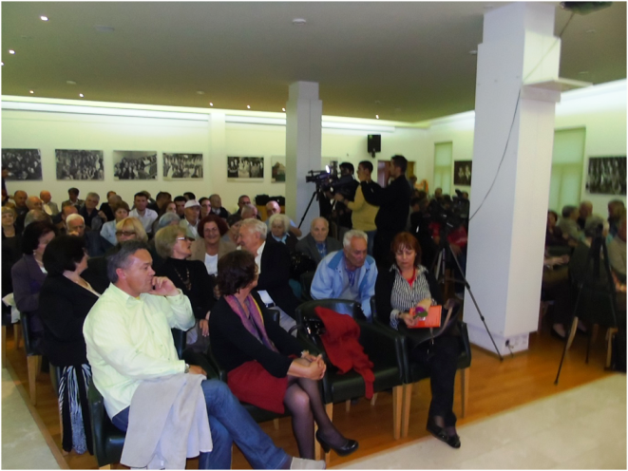
THE FIFTH MEETING OF THE ORGANIZING COMMITTEE FOR COMMEMORATING THE 20TH ANNIVERSARY OF THE GENOCIDE WAS HELD IN SREBRENICA
21 May 2015
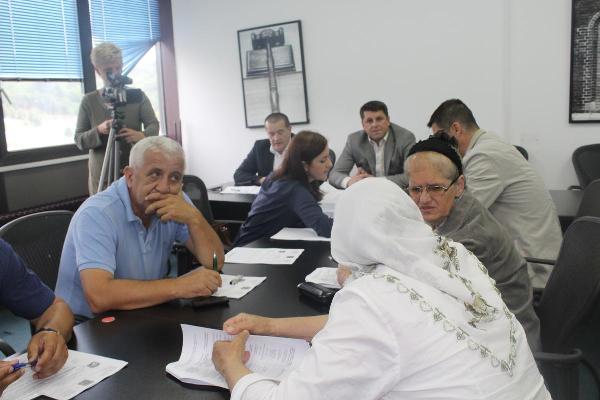
The fifth meeting of the Organizing Committee for commemorating the 20th anniversary of the genocide in Srebrenica was held today at the Memorial Centre Srebrenica-Potocari.
The President of the Organizing Committee for the comemoration of July 11 Camil Durakovic stressed that all segments of the organization are on schedule so that we can expect a well organized event which will be done in a dignified mode.
We remind that the International Scientific Conference “SREBRENICA 1995-2015: EVALUATING THE LEGACY AND LONG-TERM CONSEQUENCES OF GENOCIDE” is the part of the official program. The conference will be held in Srajevo, Tuzla and Potocari July 9-11, 2015. The conference will be organized by the University of Sarajevo – Institute for Research of Crimes Against Humanity and International Law in collaboration with the Memorial Center Srebrenica – Potočari, Memorial Center and Cemetery for the Victims of 1995 Genocide, and the University of Tuzla.
Mr. Sc. Muamer Džananović, senior associate at the Institute, attended the meeting.
Commemoration 23 years from opening the concentration camp "Luka" BRCKO
7 May 2015
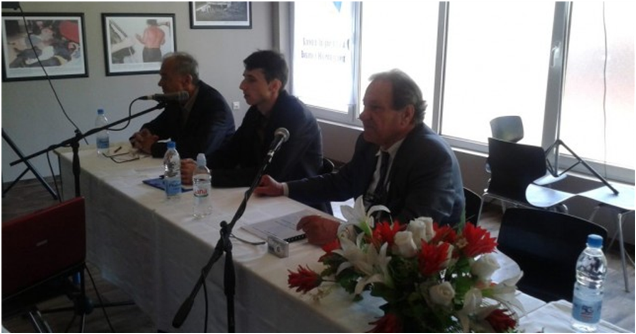
The Association of Detainees of Brcko District of Bosnia and Herzegovina has marked the 23rd anniversary from the opening the concentration camp "Luka" Brcko in Brcko on May 7, 2015.
On behalf of the Institute for Research of Crimes against Humanity and International Law, University of Sarajevo, Mr Ermin Kuka, senior associate addressed the audience. Mr Ermin Kuka spoke on topic "The concentration camp Luka - 23 years later".
The launch of the book “Negiranje genocida nad Bosnjacima” (Negation of Genocide Committed against Bosniaks) written by mr. Elvedin Mulagic
7 May 2015

The launch of the book “Negiranje genocida nad Bosnjacima” (Negation of Genocide Committed against Bosniaks) written by mr. Elvedin Muladic was held onThursday, 7th May 2015 at the Bosniak Institute - Foundation of Adil-beg Zulfikarpasic.
The Institute for Research of Crimes against Humanity and International Law was the publisher of the book. The book was promoted by academician Prof. Dr. Smail Cekic, Prof. Dr. Edina Becirevic and Dr. Admir Mulaosmanovic. The MSc. Mulagic's research is of great importance for Bosnia and Herzegovina, and his book deserves the attention of an experts and a wider readership - was concluded at the promotion, which was very well visited.
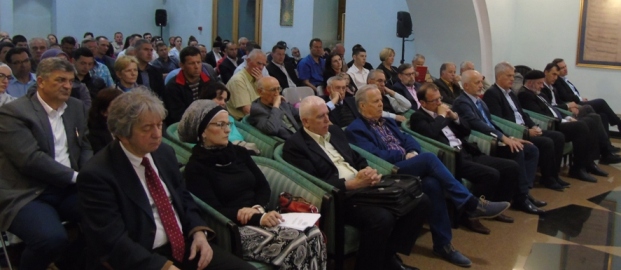
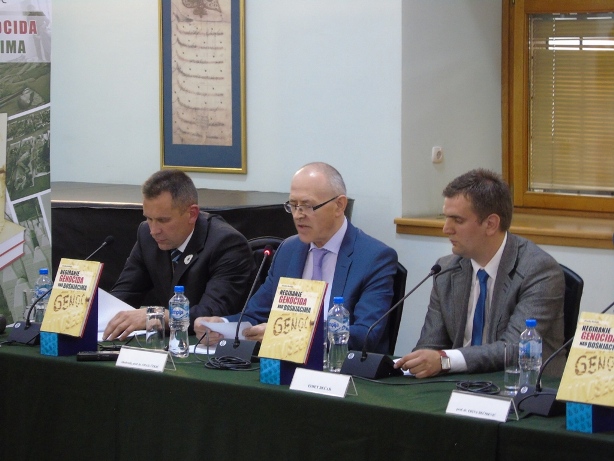
The fourth meeting of the Organizing Committee for commemorating the 20th anniversary of the genocide in Srebrenica was held
20 April 2015
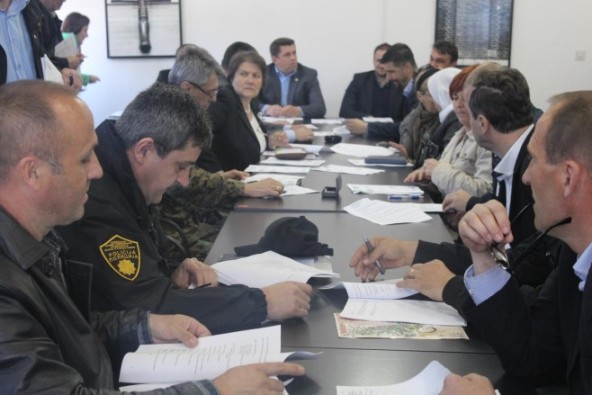
The fourth meeting of the Organizing Committee for commemorating the 20th anniversary of the genocide in Srebrenica was held at the Memorial Centre in Potocari on April 20, 2015.
On the meeting, among the others, there were discussed the time schedule for the July 11, becouse a lot of guests has confirmed the presence. The members of the Organisational board agreed that the work on the commemoration starts April 21, in order to prepare for the arrival of a large number of guests. In addition, great attention will be paid to the organization of this year's "Peace March" in which they expect large number of participants.
Today's meeting was also attended by Edin Ramic, Minister for Refugees and Displaced Persons in the Government of the Federation of Bosnia and Herzegovina. He proclaimed to the members of the Organizing Committee that the Ministry, as it was seen in the previous years, will help in the organizing the 20th anniversary of the genocide.
We remind that the International Scientific Conference “SREBRENICA 1995-2015: EVALUATING THE LEGACY AND LONG-TERM CONSEQUENCES OF GENOCIDE” is the part of the official program. The conference will be held in Srajevo, Tuzla and Potocari July 9-11, 2015. The conference will be organized by the University of Sarajevo – Institute for Research of Crimes Against Humanity and International Law in collaboration with the Memorial Center Srebrenica – Potočari, Memorial Center and Cemetery for the Victims of 1995 Genocide, and the University of Tuzla.
Mr. Sc. Muamer Džananović, senior associate at the Institute, attended the meeting.
Information about the Launch of the Book written by Esad Bajtal
7 April 2015
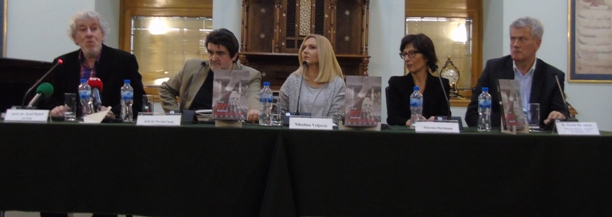
The Book titled Crimes and Lies of Milosevic's Crypto-Politics written by Prof. Dr Esad Bajtal and published by the Institute for Research of Crimes against Humanity and International Law, University of Sarajevo was launched at the Bosniak Institute - Foundation Adil Bey Zulfikarpašić on Tuesday, April 7, 2015.
On behalf of the publisher, the audience was addressed by Dr Rasim Muratović, director of the Institute, while the book was presented by prof. Dr Nerzuk Ćurak, Miss. Florence Hartmann, and by the author himself. The promotion was attended by many prominent personalities from political and public life of Bosnia and Herzegovina.
The book of Dr Esad Bajtal represents a major contribution to shedding light on the policy of Slobodan Milosevic, as it was mentioned before.
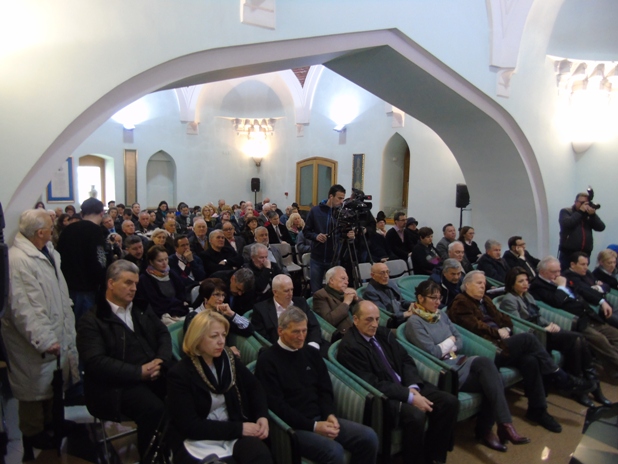
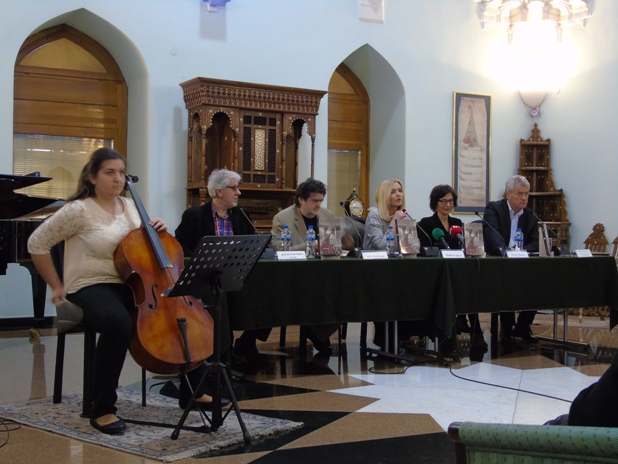
PRESS CONFERENCE "WAR CRIMES IN BRCKO 1992-1995." WAS HELD IN BRCKO
3 April 2015
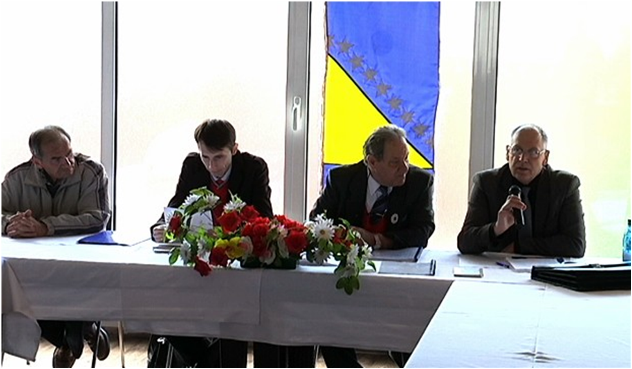
The press conference titled "WAR CRIMES IN BRCKO 1992-1995." organized by the Association of Wartime Prisoners of the Brcko District of Bosnia and Herzegovina, was held in Brcko on April 3, 2015.
On behalf of the Institute for Research of Crimes against Humanity and International Law, University of Sarajevo the press konference was attended by Mr. Ermin Kuka, senior associate.
Mr. Kuka gave speech, among the others, about the genocide committed in Brcko in period 1992-1995., and announced the short coming book titled “Genocid u Brčkom 1992-1995” (The Genocide in Brcko) that will be published by the Institute.
The Event for the Collective Awards “Šestoaprilska nagrada” and the Honorary Citizen of the City of Sarajevo
3 April 2015
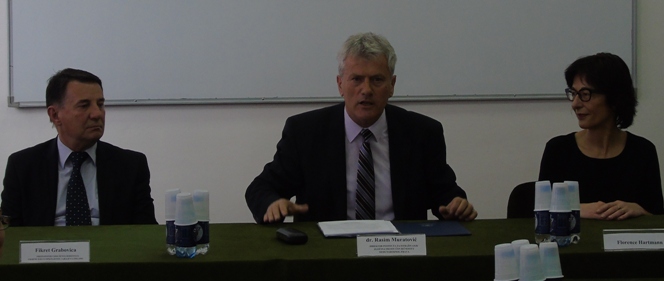
The Institute for Research of Crimes against Humanity and International Law proposed the Association of Parents of Murdered Children of Besieged Sarajevo 1992-1995 for the Collective Awards “Šestoaprilska nagrada” (The sixth of April) to the Sarajevo City Council. The Institute also proposed Miss Florence Hartman for the Honorary Citizen of the City of Sarajevo. The both Institute’s proposals were accepted.
On Friday, 03 April 2015 at 10.00 AM, the Institute hosted Miss Florence Hartman and the Association of Parents of Murdered Children of Besieged Sarajevo 1992-1995.
The Institute expressed its satisfaction that both initiatives were recognized as valid. The Institute believes that this award was given to the real fighters for the truth and justice.
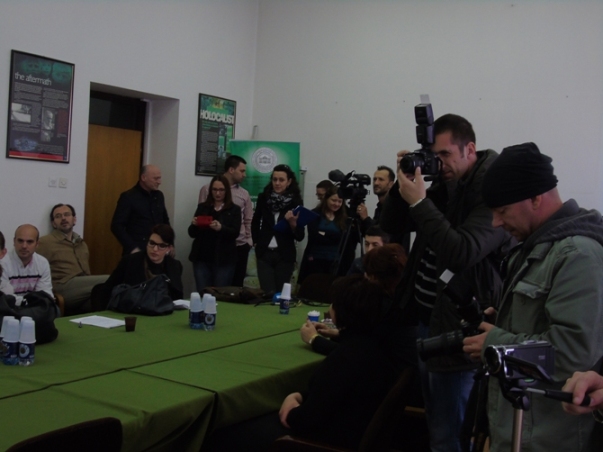
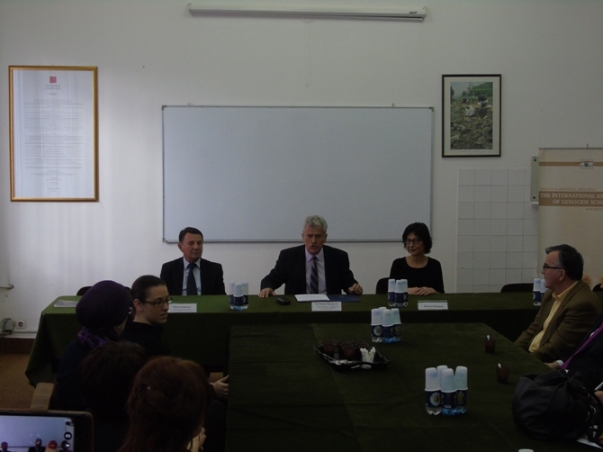
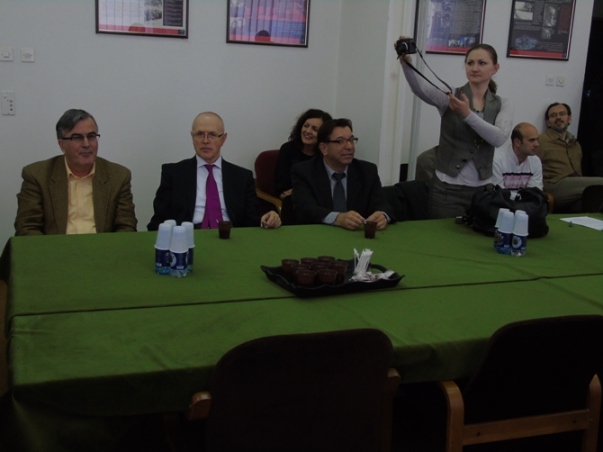
The meeting to commemorate the 12th anniversary of the first burial of genocide victims was held at the Memorial Centre in Potocari
31 March 2015
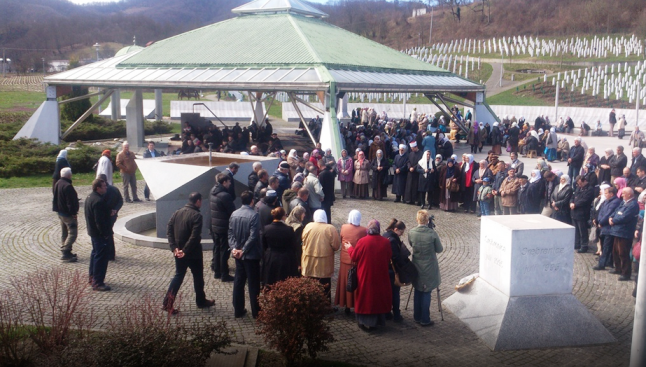
A commemoration meeting marking the 12th anniversary of the first burial of victims of the Srebrenica genocide was held at the Memorial Centre in Potocari today. 600 victims that had been killed in July 1995 were buried twelve years ago.
The Potocari Memorial Centre was officially opened by the former President Bill Clinton, the former President of the United States in September 2003. 6,241 victims of Genocide have been buried in the Potocari Memorial Center so far.
The anniversary was marked by laying flowers and reading of Tawheed. The commemoration on behalf of the Institute for Research of Crimes was attended by Džananović mr. Muamer, Senior Associate, and Efendić dr Nirha, external associate at the Institute.
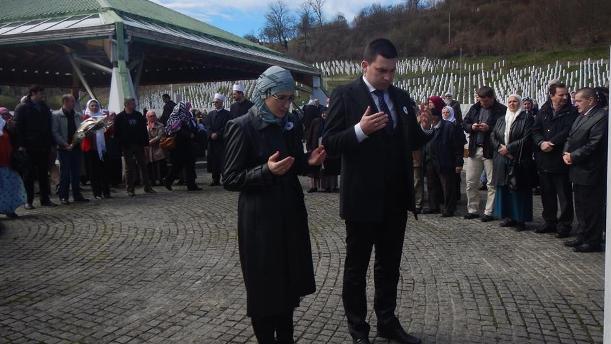
The Premiere of the Movie “Stupica nevidljivog djeteta (A trap of invisible child)”
23 March 2015
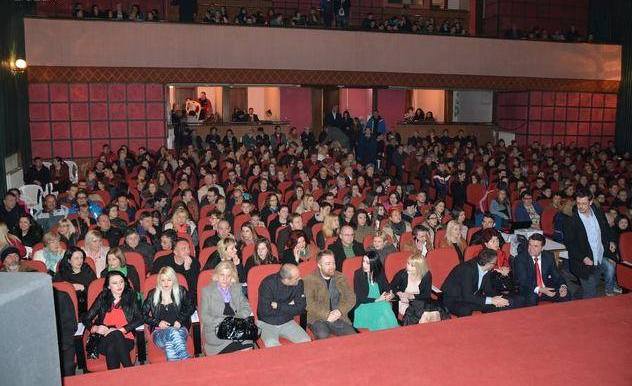
The premiere of the movie “Stupica nevidljivog djeteta (A trap of invisible child)” was held in the Big Hall of the Centre of Culture in Gorazde on March 23, 2015.
The film "A trap of invisible child", directed by Semsudin Gegic, follows the life story of Alen Muhic. His mother was a rape victim from Foca and she, after delivering her baby, left him in the war hospital in Gorazde.
The movie is a part of project titled “Oral BiHistory” which is run by The Institute for Research of Crimes against Humanity and International Law
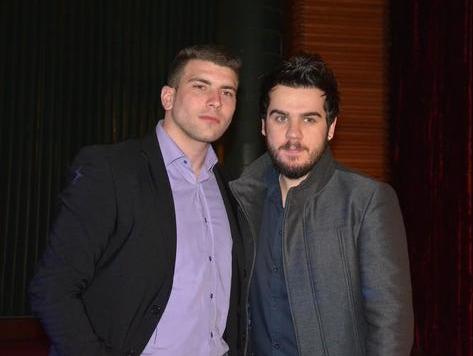
A conference was held announcing BH premiere of the film “Stupica nevidljivog djeteta (A trap of invisible child)”
20 March 2015
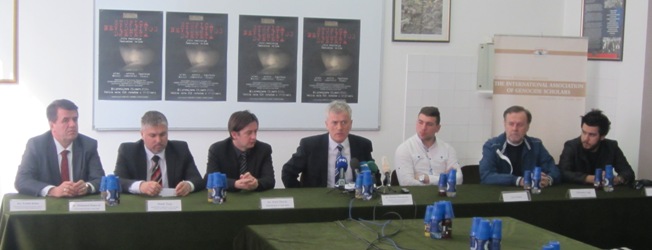
A conference was held at the Institute for Research of Crimes against Humanity and International Law (University of Sarajevo) following the announcement of BH premiere of the film “Stupica nevidljivog djeteta (A trap of invisible child)” produced by the Institute on Friday, March 21, 2015. The film "A trap of invisible child", directed by Semsudin Gegic, follows the life story of Alen Muhic. His mother was a rape victim from Foca and she, after delivering her baby, left him in the war hospital in Gorazde.
The audience was addressed by:
Dr Rasim Muratovic, director of the Institute for Research of Crimes against Humanity and International Law (University of Sarajevo);
Semsudin Gegic, director of the movie "Trap door of invisible child";
Alen Muhic, the real person;
Armin Omerovic, the main actor;
Emir Okovic, the Prime minister of Bosnian-Podrinje Canton, one of the sponsors of the BH premiere;
Damir Žuga, The Minister of Education, Youth and Science of Bosnian-Podrinje Canton, one of the sponsors of the BH premiere;
Muhamed Ramovic, the Mayor of the City of Gorazde, one of the sponsors of the BH premiere.
The BH premiere of the movie will be on Monday, March 23, 2015 in the Big Hall of the Centre of Culture in Gorazde, 07: 30 PM.
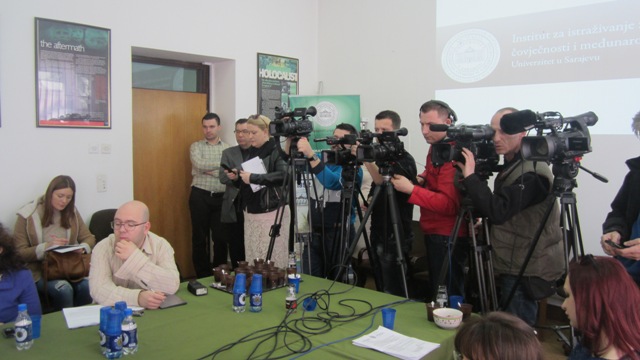
THE THIRD MEETING OF THE ORGANIZING COMMITTEE FOR COMMEMORATING THE 20TH ANNIVERSARY OF THE GENOCIDE IN SREBRENICA WAS HELD
18 March 2015
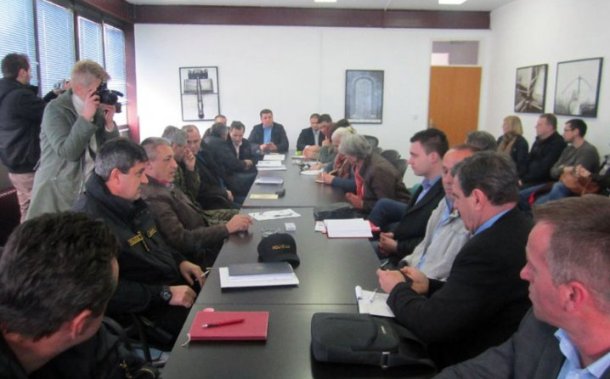
The third meeting of the Organizing Committee for commemorating the 20th anniversary of the genocide in Srebrenica was held in the Memorial Centre in Potocari, March 18, 2015.
On the meeting, among the others, the participant discussed all the activites related to the commmemoration. Twelve sub-commitee members were elected; the final program of the commemoration was defined – it will be implemented in the period June 21 – July 17, 2015. This program will be approved at the next meeting of the Organizing Committee.
We remind that the International Scientific Conference “SREBRENICA 1995-2015: EVALUATING THE LEGACY AND LONG-TERM CONSEQUENCES OF GENOCIDE” is the part of the official program. The conference will be held in Srajevo, Tuzla and Potocari July 9-11, 2015. The conference will be organized by the University of Sarajevo – Institute for Research of Crimes Against Humanity and International Law in collaboration with the Memorial Centre Srebrenica – Potočari, Memorial Centre and Cemetery for the Victims of 1995 Genocide, and the University of Tuzla.
Mr. Sc. Muamer Džananović, senior associate at the Institute, attended the meeting.
The Member of the European Parliament Tanja Fajon Visited the Institute
17 March 2015
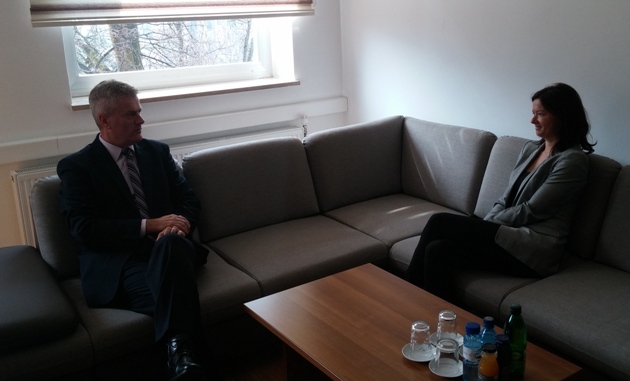
Tanja Fajon The Member of the European Parliament visited the Institute for Research of Crimes against Humanity and International Law on Tuesday, March 17, 2015.
The meeting was hosted by Dr Rasim Muratovic, the director of the Institute. The meeting primarily discussed the organizational preparing for the International Scientific Conference “SREBRENICA 1995-2015: EVALUATING THE LEGACY AND LONG-TERM CONSEQUENCES OF GENOCIDE” which will mark the 20th anniversary of the Srebrenica genocide. The Conference will be held from July 9-11, 2015 in Sarajevo, Tuzla and Potocari. The Conference will be organized by Institute for Research of Crimes against Humanity and International Law – University of Sarajevo in collaboration with the Memorial Center Srebrenica – Potočari, Memorial Center and Cemetery for the Victims of 1995 Genocide, and the University of Tuzla. Mr. Hasan Nuhanovic MA, the member of the Organizational board attended the meeting.
Director Muratovic gave Ms Fajon call for participation at the International Scientific Conference at the end of the visit.
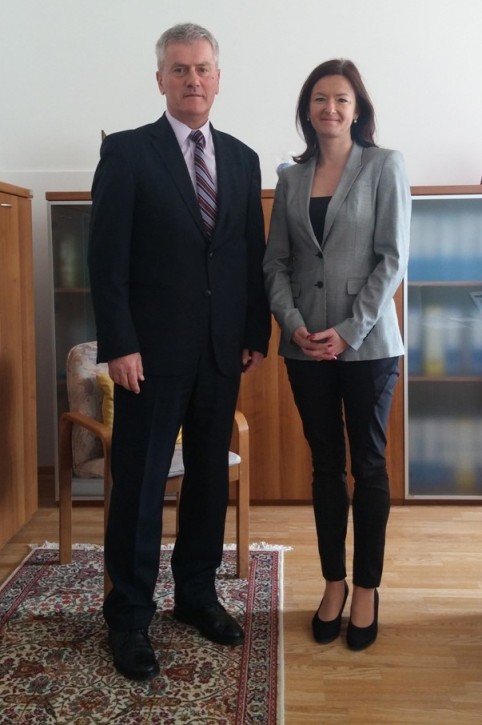
THE DIRERECTOR OF THE INSTITUTE DR RASIM MURATOVIC HAS VISITED THE REISU-I-ULEMA HUSEIN EF. KAVAZOVIC
11 March 2015
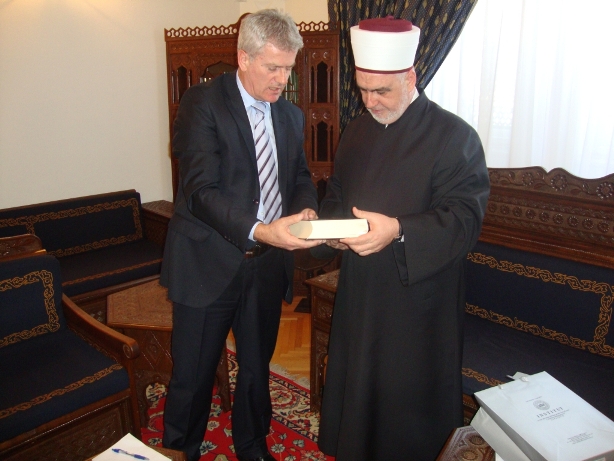
The University of Sarajevo – Institute for Research of Crimes Against Humanity and International Law in collaboration with the Memorial Center Srebrenica – Potočari, Memorial Center and Cemetery for the Victims of 1995 Genocide, and the University of Tuzla is organizing an International Conference “Srebrenica 1995 – 2015: Evaluating the legacy and long-term consequences of genocide”.
It was planned to hold the Conference in Sarajevo, Tuzla and Srebrenica (Potocari) on July 9-11, 2015.
The Director of the Institute, Dr Rasim Muratovic and two other members of the Conference organizational board – Dr Nirha Efendic and MA Hasan Nuhanovic – informed the Reisu-l-ulema Husein ef. Kavazović about the preparations of the Conference.
The Reisu-l-ulema supported the idea of the Conference and marked the importance of remembering of the genocide’s victims of Srebrenica. The Reisu-l-ulema also informed the guests about the activities of Islamic community in Bosnia and Herzegovina including organization of an International scientific conference, which will be on May 12-13, 2015. The Conference aims to treat the religious aspects of commemorating the further anniversaries of Srebrenica’s genocide.
During today's visit, Director of the Institute Dr. Rasim Muratović handed an invitation to the the Reisu-l-ulema to participate in the Conference from 9 to 11 July. The Director gifted him the most recent publications of the Institute for Research of Crimes against Humanity and International Law, University of Sarajevo.
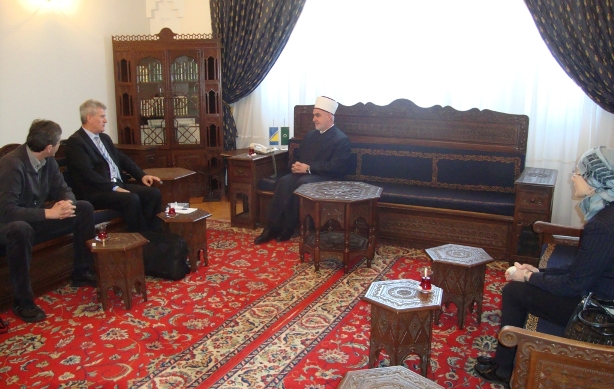
Mr. Merisa Karović – Babić, the Genocide researcher: MASS KILLINGS IN SARAJEVO ON MORE THAN 230 LOCATIONES
3 March 2015
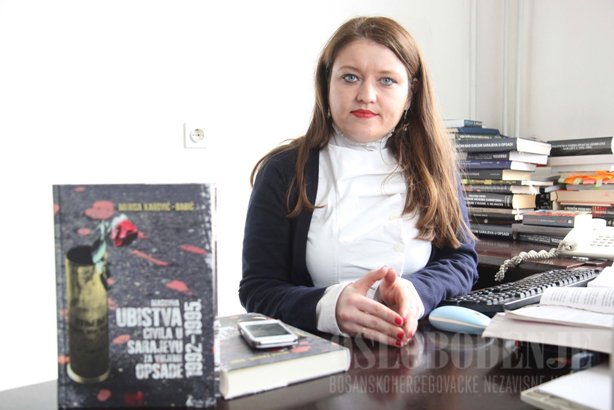
Mr. sci. Merisa Karović-Babić, Senior Associate at the Institute, gave an interview for the newspaper “Oslobođenje. We reveal some of its parts.
Merisa Karović - Babic (1983) did her master degree last year with the topic "The Mass Murder of Civilians in Sarajevo during the Siege 1992-1995", and recently, on the basis of the work, she has published the same name book. She is also co-author of the book titled "Crimes against Children of Sarajevo under Siege".
She is a Senior Associate at the Institute for Research of Crimes against Humanity and International Law of University of Sarajevo. Currently, Merisa Karović – Babic attends the doctoral program at the Department of History of the Sarajevo’s Faculty of Philosophy and within the program she explores the “UN safe zones” in Bosnia and Herzegovina 1993-1995.
According to her findings, mass murders were committed in Sarajevo at 230 locations, or more precisely; murders of two or more civilians were committed at one place at the same time.
http://www.oslobodjenje.ba/intervju/mr-merisa-karovic--babic-istrazivacica-genocida-masovna-ubistva-u-sarajevu-na-230-lokacija
The interview is available for reading in printed version of the newspaper: “Oslobođenje” March 2, 2015, pp. 4-5.
Mr. Muamer Džananović spoke at the Public Discussion "Remembering 1991 - 1995."
27 February 2015
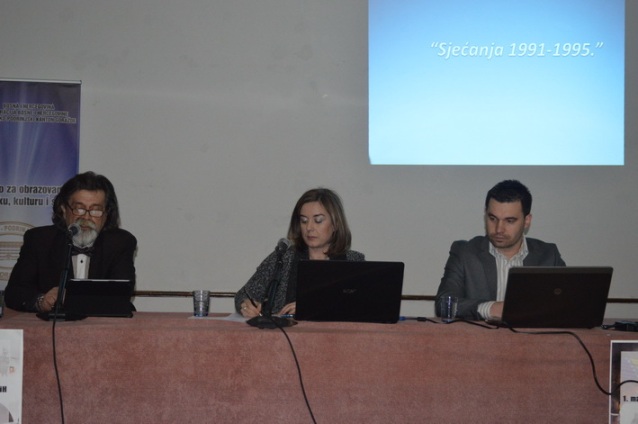
Within the Program of celebrating March 1 - Independence Day of Bosnia and Herzegovina in the area of The Bosnian-Podrinje Canton Goražde, on Friday 27 March 2015 in the Small Hall of the Cultural Centre in Gorazde, there was a public debate "Memories 1991-1995".
Mr. Muamer Džananović, a senior associate of the Institute, spoke at the public debate.
Mr. Džananović introduced his own scientific and empirical researches he had done in his work titled "Activities of the Great Serbian aggressor in conquering Gorazde 1992 - 1995".
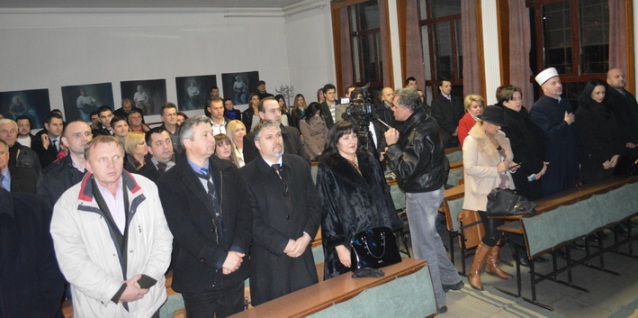
The Collected papers titled “The political and military importance of Sarajevo’s defense 1992-1995” is launched
24 February 2015

On Tuesday, 24 February 2015, in the BiH Armed Forces Hall (Dom Oružanih snaga BiH), there was a launch of the Collected papers titled “The political and military importance of Sarajevo defense 1992-1995”.
The Collected Papers, published by the Institute for Research of Crimes against Humanity and International Law, University of Sarajevo, is the collection of papers that had been presented at an international scientific conference under the same title. The conference was held in early 2012, which was attended by more than 60 renowned scholars from the country and the world.
The audience was addressed by Dr. Rasim Muratović, director of the Institute for Research of Crimes against Humanity and International Law, University of Sarajevo. The speech was also given by Ranko Čović, Deputy Mayor of the City of Sarajevo, while the promoters of the Collected papers were: Prof. Dr. Muhamed Filipović, the member of ANUBiH; Prof. Dr. Vladimir Premec; Prof. Dr. Mirko Pejanović, corresponding member of ANUBiH, and mr. Jakob Finci, President of the Jewish municipality in Bosnia and Herzegovina.
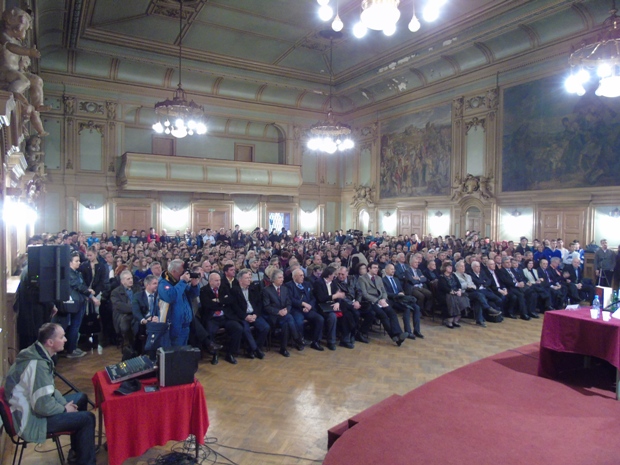
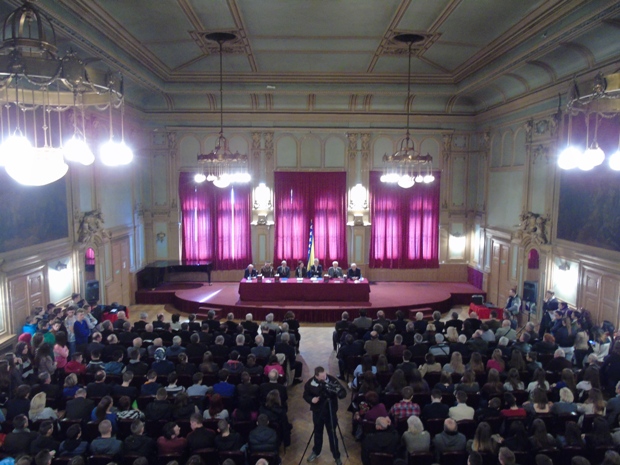
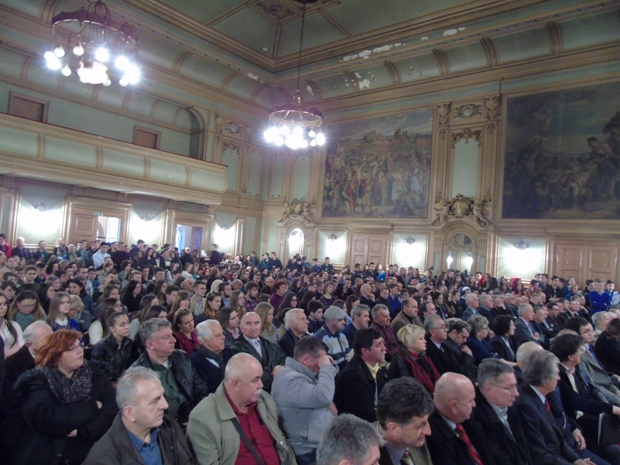
The second meeting of the Organizing Committee for commemorating the 20th anniversary of the genocide in Srebrenica was held
12 February 2015
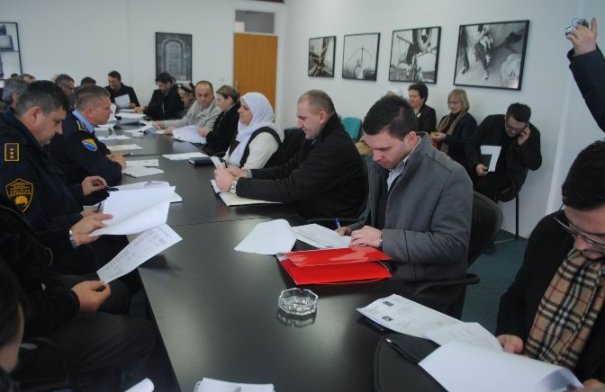
The second meeting of the Organizing Committee for commemorating the 20th anniversary of the genocide against Bosniaks of "Safe UN zone“ Srebrenica was held in the Memorial Centre Srebrenica-Potocari on 12 February 2015.
The members of the Organizing Committee, among the others, have constituted twelve Subcommittees to commemorate 11 July 1995. Dr Rasim Muratovic, director of the Institute and M. Sc. Muamer Džananović, senior associate at the Institute, who attended the meeting, were elected as the members of the Subcommittee for scientific, cultural and publishing activities.
International Day of Remembrance of the Victims of Holocaust
10 February 2015
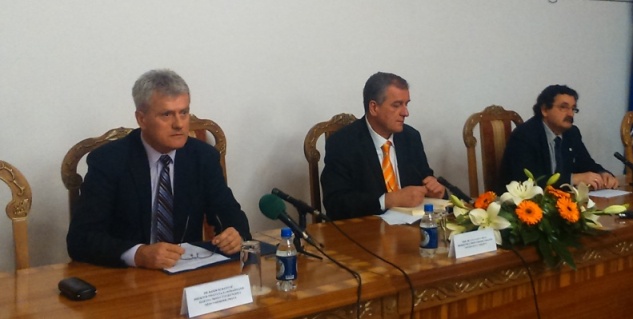
On Tuesday, 10 February 2015, there was a discussion forum
titled Holocaust in Bosnia and Herzegovina, held in the Senate hall, University of Sarajevo.
The speakers were prof. Dr Ugo Vlaisavljevic,
Vice-rector, University of Sarajevo; Dr Rasim Muratovic , the Director of the Institute for Research of Crimes Against Humanity and International
Law of the University of Sarajevo; and Dr Elijas Tauber, Associate of the Institute for Research of Crimes Against Humanity and International Law.
University of Sarajevo commemorates each year the victims of Holocaust, both of Bosnia and Herzegovina and of the world.
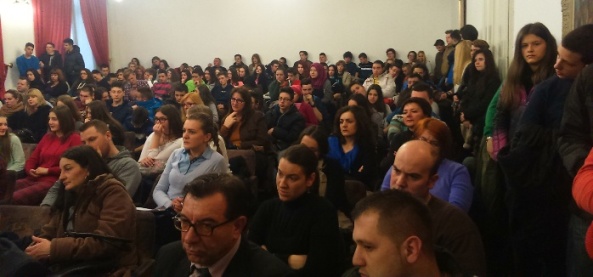
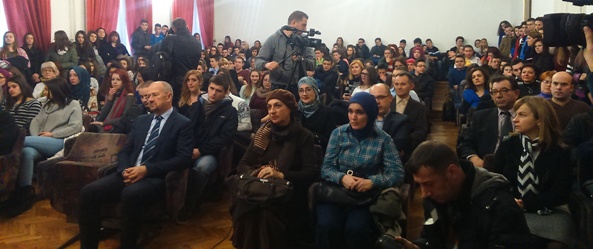
The Remembering Victims of barbaric siege of Sarajevo
5 Februry 2015
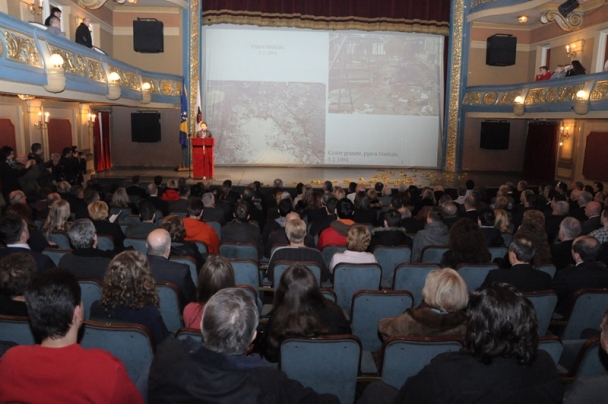
The commemorative session of the Assembly of Sarajevo Canton, the City Council of Sarajevo and the municipal councils of municipalities of Canton Sarajevo was held at the National Theatre in Sarajevo on 5 February 2015. The session was held on the occasion of remembrance of all the victims of the barbaric siege.
On behalf of the Institute for Research of Crimes against Humanity and International Law, University of Sarajevo, the audience was addressed Merisa Karović-Babic M.A., who, among the others, spoke about the strategy and plans of the siege forces (SRK / VRS / VJ) and their endeavors to divide Sarajevo into two parts during four years; where they did not choose the means to achieve their objectives.
Apart from daily shelling, the inhabitants of the besieged city were deprived of water, gas, electricity, fuel and basic foodstuffs. “The killing of members of the whole family, such as, for example, 16 May 1992, in the ground floor room of their house, in the Velešići killed six members Bibić and Mekić family; then killing the youngest, babies of Sarajevo; destroyed incubators together with the bombing maternity hospital Zehra Muidović 26/27. May 1992; massacre in the bread queue in Vasa Miskin Street May 27, 1992 are just a few examples which predicted the ways and methods of warfare during the siege of Sarajevo in the first few months.” - Reminded Karović-Babic and reflected on the role of UN forces in 1992-1995 as well as the lack of prosecution of those responsible for the killing of Sarajevo citizens.
The presentation also discussed the bombing out the city by the modified air bombs, known as a weapon of terror, by which the president of the self-proclaimed Republic of Srbska was threatening that the war can be completed in two months. She pointed out that the use of these bombs was especially prevalent after the command of General Dragomir Milosevic, which reads: Rocket bombs to have ready for action at the city..., (14 April 1995) This kind of weapon, as it Russian rightists Vladimir Zhirinovsky threatened, is not leaving anything alive… and... could save Slovenianess and help the Serbs to defend themselves against west terrorists. (Vladimir Zhirinovsky, 7 February 1994)
Particularly frequent targets of these bombs were urban parts of the city, such as the tall building in the part of Sarajevo called Alipašino polje, where, bombs were flying from the direction Doglodi, 28 June 1995 and killed three civilians and destroyed the Chamber of RTV BiH and other locations in the city.
Also, Karović-Babic emphasized that the mass killings of civilians were committed at 230 locations, where at 93 locations were committed both killing of civilians and the whole families.
She concluded that the UN probe after these crimes well fit the political and military context, and their results correspond to the current state of UNOPROFOR forces on the field.
Adoption of numerous resolutions of the Security Council of the UN, limited only to a verbal condemnation of the crimes, and the expressions of deep concern and words of condemnation for the siege and '' drowning '' Sarajevo, along with highly skilled diplomatic language, were a way to avoid concrete actions such as lifting of the embargo or military intervention. At the end of the presentation Karovic- Babic has concluded that many of the perpetrators are not prosecuted, victims' families does not provide the slightest satisfaction and that fact gives an amnesty to the planners, commanders, the perpetrators and their accomplices. After completing commemorative session, participants paid tribute to the victims and lay flowers at the Memorial at Markale.
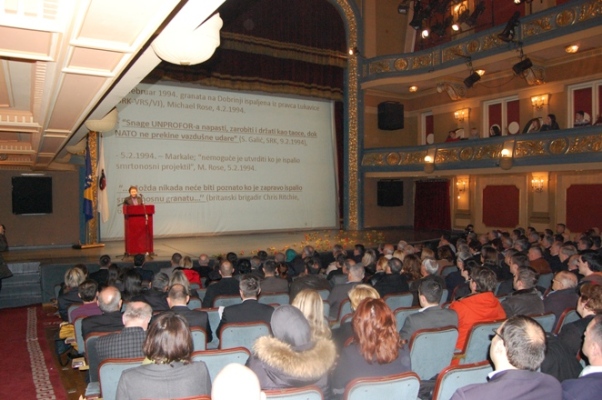
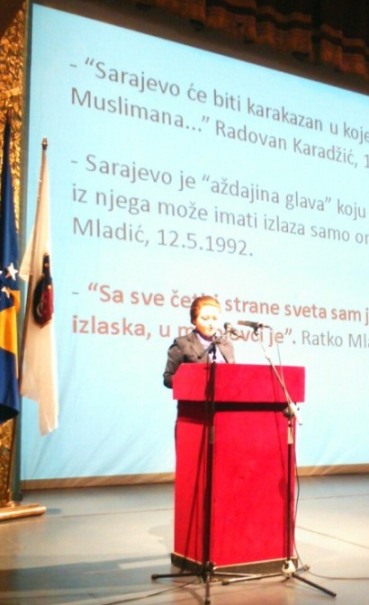
DIRECTOR OF THE INSTITUTE HAS VISITED MALAYSIAN EMBASSY
29 January 2015
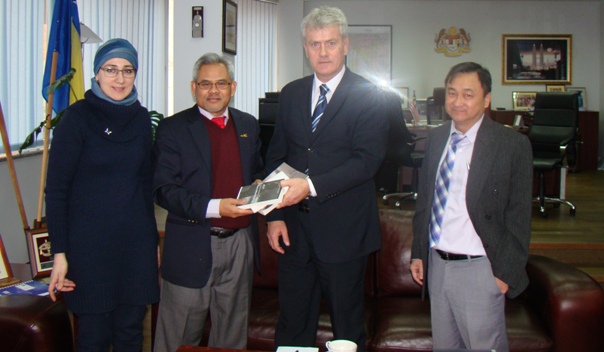
On 29 January 2015, Dr. Rasim Muratović, director of the Institute for Research of Crimes against Humanity and International Law, University of Sarajevo, visited the Embassy of Malaysia.
On this occasion, Dr. Muratovic spoke with the Ambassador of Malaysia in Bosnia and Herzegovina, His Excellency Anuar Kasman. Dr. Muratovic informed the Ambassador with the projects and the work of the Institute. The meeting was concluded to a mutual satisfaction and a wish for further cooperation.
International Day of Remembrance of the Victims of Holocaust
January 28, 2015

Regarding the 27.January - the International Day of Remebrance of the Victims of Holocaust, University in Sarajevo is organising a Discussion Forum "Holocaust in Bosnia and Herzegovina".
Speakers at the discussion forum will be:
- prof. dr. Ugo Vlaisavljević, provost of the University of Sarajevo, tenured professor of the Faculty of Philosophy of the Sarajevo University
- dr. Rasim Muratović, director of the Institute for Research of Crimes against Humanity and International Law of the Sarajevo University
- dr. Elijas Tauber, associate of the nstitute for Research of Crimes against Humanity and International Law of the Sarajevo University
Discussion Forum will be held on 10.February 2015, at the University of Sarajevo Senate, Obala Kulina bana 7/II, starting at 13:30.
The promotion of the book "Holocaust in Bosnia and Herzegovina" by Dr. Eli Tauber
January 21, 2015
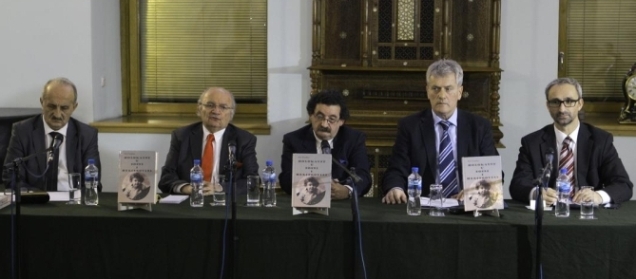
The promotion of the book "Holocaust in Bosnia and Herzegovina" by Dr. Eli Tauber, took place on Wednesday, 21.January.2015, at the Bosniak Institute Adil beg Zulfikarpašić.
Dr. Eli Tauber is employee of the Institute for Research of Crimes against Humanity and International Law of the Sarajevo University, which is also the publisher of this work.
Promoters of this important work for the history of Bosnia and Herzegovina and the history of Holocaust were director of the Institute Dr. Rasim Muratović, Mr. Jakob Finci, president of the Jewish Community of B&H, and Dr. Husnija Kamberović, director of the Institute for History.
Many members of political and public elite and academic community of Bosnia and Herzegovina attended the promotion of the book.
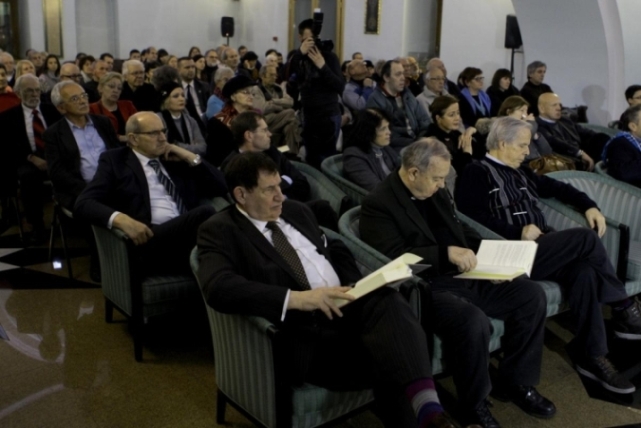
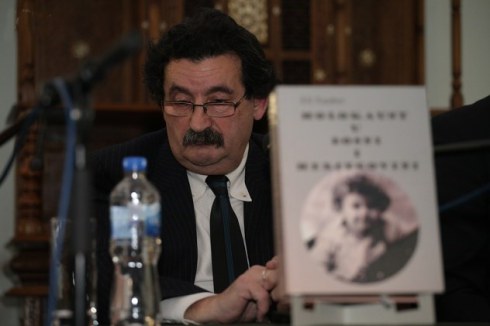
Rasim Muratović: Dedijer wrote a book “Genocide against Muslims” using ads in Oslobođenje
January 5, 2015
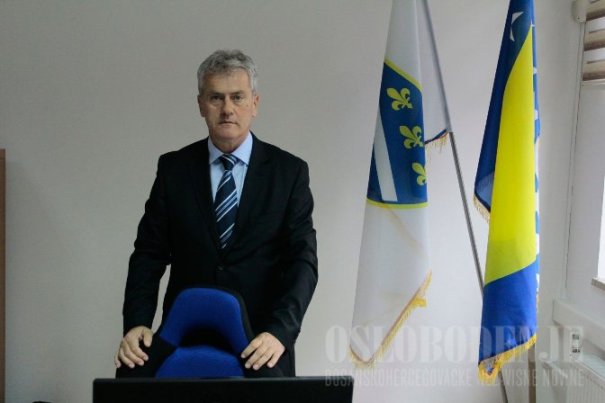
In a year behind us, dr. Rasim Muratović became head of the Institute for Research of Crimes against Humanity and International Law of the Sarajevo University. What is his experience from the past few months? Does he regret coming there?
Experience with a lot of melancholy meditation over the “man’s destiny”, from which, sometimes, emerges a certain dose of sarcasm and satire arising from wonder, first of all. However, if I go deeper in that, I see this is the result of decades of hard work. Edina, you know very well. We studied together, at the time we were young, beautiful and smart … (laughs). You remember when you wrote 10 (A) in my student index before the exam, and after professor questioned me, he had no other option but to sign that grade. And that is who I am, whenever and whatever I do. And I really worked everything, from being a newsboy, window washer, book seller – to working at a prestigious Universities and Royal Military Academies. What I want to say: Hard and honest work pays off no matter how much it looks useless sometimes. Being hard and honest worker I came here, at the head of the important scientific institution. My function is the member of the Senate of the Sarajevo University. That is intellectual and scientific peak of our state. And that is what motivates me and gives me the strength, despite numerous of everyday problems which cause me headache.
Director of the Institute was dr. Smail Čekić for two decades. What are his current relations to this institution?
Prof. Dr. Smail Čekić was director of the Institute for 22 years. At this time, he is employer of the Institute with 20% working time, and 80% working time employed at the Faculty of Political Science of the Sarajevo University. That was his wish. Two of us know each other very good.
Bosnia has never stand better than now
From what you found, what is the most valuable for you?
The most valuable this is the existence of such institution as the Institute is. We have negative experience from the Second World War, when we, for the sake of better future, kept quiet about the crimes committed against us. That was wrong and counterproductive. Existence of this Institute, work and the results of work is the hope that we will finally learn one very important, if not the most important life lesson.
You stated recently that the position of the Institute have never been materially better? But does the statement that science in our state fell to the lowest branch deny your statement?
Yes. I have said that and that is not mistake. That is statement by one of our professors from April 1993, who said that Bosnia has never stand better! I keep with that statement when speaking about the Institute, and about the state. Employees of the Institute are full time employees, with regular salaries (as they are), with all the contributions including transportation, meals, equipment, offices, internet. Those who hold M.Sc. or Ph.D. title have endless possibilities to apply for grants, which can contribute to the overall position of the employees and the Institute. I argue that it is possible to live being scientist, under the condition to work on topics that society need, and if you are committed to science as the athletes are committed to their sport. Hard Work! Hard Work! Hard Work! Every single day.
Does that mean that the Institute should enter the market and fight for its position?
Ability to work in the profession, knowledge of foreign languages, computer competence and similar things – that is the intention and the perspective. Meaning, going forward, and not going backwards. Those times have passed, and never coming back. Those who understand this, they have opportunity to survive on the labor market, and those who cannot understand this – they will remain on the bottom complaining about their position. What I want to say, environment does not need to understand me, but needs to understand itself. I am aware that it is very hard to make money out of intelligence. It is much easier to try to buy the intelligence. But hard life changes by hard work, often with uncertain ending.
Everybody wants to live at the expense of the state
Scientists also bear the blame for the current position of the science, according to you?
Scientists should understand that they are intelligence, and not the state. The state is the mechanism which needs to provide them help. Scientists build the state, and not vice versa. In sociology it is called Sociology from bottom up. It is obvious that there is a lack of knowledge and understanding what is the science and what is the scientific work. One cannot be relevant scientist, researching topics that society doesn’t need, without hard work, without knowing foreign languages and IT illiteracy.
There are numerous organizations dealing with the research of crimes. What are the positives and negatives of that?
You noticed that very well. Dozens of associations, foundations, organizations, centers and I don’t know what else, want to life at the expense of the state, doing research of crimes. They have some private archives, and they think they can do it, and they know how to do it. It brings much more negatives than positives. That is the main issue in our field work. At every project we worked, we had at least two groups who hold some important research materials for us. It is important to have negotiation techniques in order to have result. We need strong state institutions in every field.
You support thesis that genocide was committed in every occupied area in Bosnia and Herzegovina?
Yes, and that is the standpoint of the science. Science is science, and law is profession. It is good when these two disciplines match, but it is not catastrophe when they don’t. Our goal is that justice and education institutions use our research materials. Our plan to have all the victims named, from every municipality. One day, everybody will be able to find everything they need regarding crimes committed in specific place, not only from the recent war, but also from the WWII, and WWI, with just one click on the internet. That is the plan. That is the wish. And we will do it!
Did Institute already formed special department for research of crimes in Eastern Bosnia, 1941 – 1945, and 1992 – 1995?
Yes, and we will have first results very soon. Do you know how Vladimir Dedijer wrote a book “Genocide against Muslims” in 1990? He sent ads in Oslobođenje newspaper. Please, find that ad. I think that was in second half of August, 1989, August 20th very possible. He stated, roughly: “I ask all those who know something about the crimes committed in WWII, to send me whatever they have on the following address”. I am doing the same thing now, in 2015. I invite anyone who have to offer something regarding the crimes against humanity and international law, to send to the Institute, or to come at the Institute. Address of the Institute is Halida Nazečića 4, 71000 Sarajevo. Our e-mail address is info@institut-genocid.unsa.ba .
Revision of the indictment is not done
This year is 20 years from genocide in UN Safe Zone Srebrenica. What are the activities of the Institute on this occasion?
Last October we remind everybody included in this project to start with activities on time. We have started already, as everybody else did. We arrange with the holocaust centers all around the world to have commemoration on 11th July. Besides, we are preparing scientific conference, summer school, and what is the most important, to be present in Potočari on that day. I am inviting institutions and individuals to plan activities in order to be present in Potočari on this day.
At the same year, 20 years of Dayton Peace Agreement
Those are two dates that are connected. I expect that law, as a profession, to hold the position about the Dayton Peace Agreement: Is it straitjacket, or necessary evil which we need to change? Unfortunately, we didn’t use full capacity of Dayton, nor we did change anything to better. This, in my opinion, will last for a long time. Only way out of this is to change Dayton Peace Agreement. That is my humble opinion.
Can we expect the revision of the indictment Bosnia and Herzegovina vs. Serbia, or that is done deal?
For us (the Institute) it is not done yet. Bosnia and Herzegovina have the possibility, until the February 2017, to revise the claim against Serbia and Montenegro, which is the priority. We need experienced professionals who are willing and able to do this job.
Tell us more about the activities on the project “Oral B&History”, which already recognized worldwide?
That is one out of many projects we started. We found inspiration for this project from Jews. This is very important for them. They named the testimonies of the survivals – oral history. Jews invest time and money to travel the world and find survivals from the Auschwitz or some other concentration camp, to record the testimony. No other nation have similar will to collect testimonies about what they experienced from 1939 – 1945. They have organized, systematic and detailed approach to this topic, and they do it with great care and love for their nation and state. In that context, we need to be more like Jews, and less like Palestinians.
One of the books you wrote is “Holocaust against Jews, and Genocide against Bosniaks”. How Jews sees that book?
They had positive reactions. Promotion of the first edition of the book was held on January 27th, 2007 at the premises of the Jewish community in Sarajevo, under the sponsorship of the Presidency of Bosnia and Herzegovina. That book is listed in the catalog Published by Oxford University Press in association with the United States Holocaust Memorial Museum. Besides that, dozens of publishers worldwide, including Tarmans Books, listed this book in catalog. This book can be found at the Yale University Library also.
Fra Ivan Šarčević recently stated, for our newspaper, that he is afraid of how Bosniaks will respond to their victim status in next decades. How realistic his statements are?
In legal sense, when speaking about the crimes 1941 – 1945, and 1992 – 1995, Bosniaks are victims. In WWII, Bosniaks are victims with 103.00 or 9,1% victims, meaning right behind the Jews. During the aggression against Bosnia and Herzegovina in last war, Bosniaks experienced the greatest victims. In every other sense, Bosniaks are not victims, they are winners.
At the end, I want to personally testify that Bosnia and Herzegovina, and Bosniaks, never had better position than now. I am from Olovo, and I came to Sarajevo as a 14 years old boy, in 1971. I remember very well Sarajevo from that time, and I see Sarajevo today. I never regret to give everything I can to Sarajevo and to Bosnia and Herzegovina. I don’t regret anything. Because Sarajevo and Bosnia and Herzegovina pays back everything you give. Today, I am fully realized man. I am married for 32 years; I have grown up kids, and grandkids who love me.
I published 13 books until now (6 translations from Norwegian, and I am author of 7). The book “Holocaust against Jews and Genocide against Bosniaks” have two editions. I am author of 33 scientific essays published in Norwegian and Bosnian language. Two radio novels I wrote are published and aired, and I had three scientific research projects. I participated in ten international scientific conferences outside of Bosnia and Herzegovina, and 18 scientific conferences and round tables in Bosnia and Herzegovina, on the topic crimes against humanity and international law. I have reviewed 10 books, edited 4. I have promoted 22 books, and had 25 TV and radio interviews, and 16 interviews to print media. Besides, I held 19 lectures on genocide and holocaust worldwide, and worked in 9 organizational boards.
At the end, I want to thank to Oslobođenje newspaper, because you remind me on my childhood in Olove, in 60’s, when I was buying Oslobođenje for my old neighbor every single morning. Hatiđa hanuma, my neighbor, was the owner of the Bosnian coffe shop near the train station. She was always very generous, giving me a little bit more money than the Oslobođenje cost. That was for ice cream. In that sense, ice cream always reminds me on summer, on joy and optimism. It reminds me that we need to follow our dreams, not others dreams. One of the dreams I had is also this interview for Oslobođenje.
Full interview can be found in Oslobođenje, 04. January 2015. And web site of Oslobođenje: http://www.oslobodjenje.ba/intervju/dr-rasim-muratovic-dedijer-je-napisao-knjigu-genocid-nad-muslimanima-pomocu-oglasa-u-oslobodjenju
AKADEMICIAN ABDULAH SIDRAN VISITED INSTITUTE
December 23, 2014
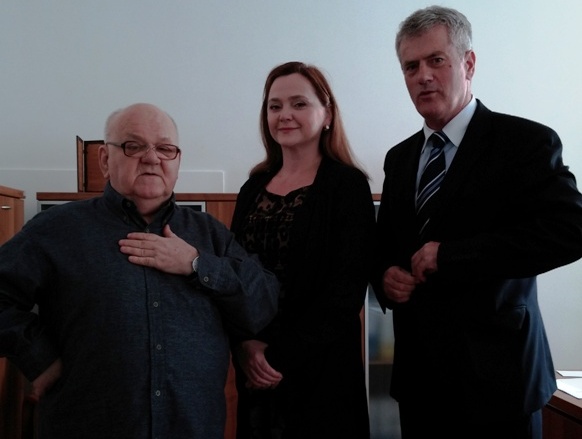
On 23. December 2014, famous B&H’s writer, screenwriter and academician, Abdulah Sidran, accompanied by his daughter Miranda Sidran – Kamišalić, visited Institute for Research of Crimes against Humanity and International Law of the Sarajevo University.
On that occasion, academician Abdulah Sidran met the director of the Institute, Dr. Rasim Muratović.
Academician Abdulah Sidran was interested about the work of the Institute and current projects of the Institute. They both emphasized mutual desire for cooperation.
Round Table "Truth of Statehood of Bosnia and Herzegovina 1945 - 2025
December 15, 2014
On December 13.2014, director of the Institute for Research of Crimes against Humanity and International Law of the Sarajevo University, dr. Rasim Muratovic, participated at the Round Table "Truth of Statehood of Bosnia and Herzegovina 1945 - 2025".
Occasion for Round Table was 80 years of life and professional work of professor Emeritus Omer Ibrahimagic. Round Table was organized by Faculty of Law of the Sarajevo University.
Dr. Rasim Muratovic participated at this Round Table by presentation of the topic "Professor Omer Ibrahimagic role model for young people - sociological discourse"
FIRST MEETING OF THE ORGANIZING COMMITTEE ON THE 20th MEMORIAL DAY OF THE SREBRENICA GENOCIDE
December 15, 2014
July 2015 will be 20 years since the genocide was committed in UN Safe Zone Srebrenica.
Institute for Research of Crimes against Humanity and International Law of the Sarajevo University will mark this Remembrance Day with the series of activities. One of many projects planned for this activity includes multimedia exhibitions in Holocaust Museums around the world, as well as the lectures by the Institute staff and survived victims of genocide.
Project leader is dr. Eli Tauber, with assocciates on the project mr.Hasan Nuhanovic, M.Sc Meldijana Arnaut Haseljic, M.Sc Sabina Subasic Galijatovic, M.Sc Ermin Kuka, M.Sc Merima Omeragic and ms. Ilvana Salic.
MR. SCI. MUAMER DŽANANOVIĆ: Debt to killed and survivors
December 10, 2014
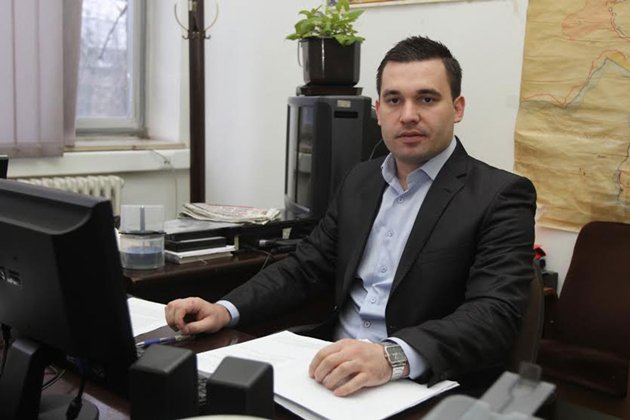
Interview with M.Sc. Muamer Dzananovic, research associate at the Institute for Research of Crimes against Humanity and International Law of the Sarajevo University, full text.
M.Sc. Muamer Dzananovic, research associate at the Institute for Research of Crimes against Humanity and International Law of the Sarajevo University, devoted last few years to research crimes committed during the siege of Gorazde. According to M.Sc. Muamer Dzananovic, first reason and motive to research this particular topic is professional, as he is employed at the Institute, and second reason is personal, as he is born in Gorazde.
Value of data
If we know that during the siege of Goraze, from autumn 1992 until the end of 1995, severe crimes against humanity and international law were committed against civilians and civil facilities were civilians seek for salvation and security, it is clear why this topic is interesting and important. Besides, among the victims of barbaric siege of Gorazde, some of the victims are my cousins, friends and acquaintances, explains M.Sc. Dzananovic, who collected some very valuable data. According to M.Sc. Dzananovic, the subject of his scientific and empirical research is the crimes committed against the socially most sensitive population, namely the children.
Besides mass graves and individual killings, children were wounded, with tremendous psychological consequences that are present even today; many of them misplaced, refugees and their living environment is completely changed.
- Their fate is shaped at the surrounding hills of Gorazde, and they were deprived of everything they should had, stated M.Sc. Dzananovic.
Part of his research has been presented in his master thesis, defended on 15th of July this year at the Faculty of Political Sciences of the Sarajevo University. Unfortunately, during the siege, 550 children, whose identities are known today, were killed and wounded by the artillery weapons (including sniper) and infantry weapons.
“This research requires a huge effort to complete the goal, meaning the truth. I have experienced great problems, 20 years have passed since the crimes are committed, many relevant sources disappeared fully or in part, and many witnesses died or fled. I had excellent cooperation with directors and employees of several institutions with seat in Gorazde that had more or less important for my research, and I could not implement this project without their help. I use this opportunity to sincerely thank them”, stated M.Sc. Dzananovic adding that during the research, many times he interviewed brother or sister of killed children.
Today, after 20 years have passed since tragedy, family members still have difficulties to speak about the crimes committed. Because of that, they often direct the researcher to some other empirical source.
“The pain they feel only they can understand, and our role is not to let the memory to remains only with them. It is necessary to memorize the innocent victims of GreatSerbia ideology and politics, and thus to warn the next generation coming about the truth and consequences of crimes. Genocide and other crimes against humanity and international law are the most complex phenomena in society, and it is difficult to handle and to deal with this phenomena. On one side, victims talk less about the crimes, for various reasons, mostly personal. On the other hand, those who are dealing with these phenomena are faced with the society which does not recognize the importance of this research. This and other similar research requires long term scientific research, adequate financial resources, including more staff, researchers and scientists”, states M.Sc. Dzananovic, who devoted his capacities to this topic.
UN Role
This book will contain the identities of killed children, and it will be, if not only then one of a kind for sure, which will present the identities of victims to the public.
“Among other things, this book will contain elaborated role of the international organizations whose nonchalance resulted in great number of victims. This book will prove that Gorazde was not the safe zone of UN. Some unpublished commands of the Republic of Srpska military will be published in this book, and public will know their true intentions”, stated M.Sc. Dzananovic.
Responsibility
“Unfortunately, we still have no convictions for committed crimes. Trial against Dragan Sekaric is in process before the Court of B&H, with charges for crime against humanity against nonserb civilians in the Gorazde and Visegrad area, including crimes committed in village Lozje, on May 22, 1992, when dozens of civilians were killed or wounded, including Advira Sahman, born 1980, killed. That is only trial for the crimes committed in Gorazde during the siege of Gorazde. Relevance of this research is that it will bring scientific arguments for trials, and to bring perpetrators before the courts”, states the author.
“it is proven, in this research, that almost every second day of the siege, one children average was killed or wounded. During the siege, mass murder was committed 14 times, or more than two children were killed by shrapnel of the same grenade. On August 18, 1992, Emina (1987) and Alija (1985) Kanlic, brother and sister, and Emina Turkovic (1987) were killed by shrapnel of the same grenade. Same scenario happened on September 7,1992, Irma (1990) and Alen (1986) Dzomba, brother and sister, and Amela Odobasic (1986). On September 21, 1992, three children were killed by grenade. They were 7 years and 3 monhts old, all three of them together (Edvin 1990 and Eldin 1992, brothers, and Jasmina Herak 1991). Survivors of the siege of Gorazde still carry mental and physical damages. Emina Dizdarevic is wounded on April 20, 1994, left with eye injury. Shrapnel of same grenade killed ten civilians, including Emina’s brother Nermin (1987) and her mother Sadeta. Her father Hajrudin was killed in 1992.
Full interview in Oslobođenje daily mail from 09.December.2014, or at the following link:: http://www.oslobodjenje.ba/vijesti/sarajevo/mr-muamer-dzananovic-strucni-saradnik-na-institutu-za-istrazivanje-zlocina-dug-prema-ubijenim-i-prezivjelim-
FIRST MEETING OF THE ORGANIZING COMMITTEE ON THE 20th MEMORIAL DAY OF THE SREBRENICA GENOCIDE
December 3, 2014
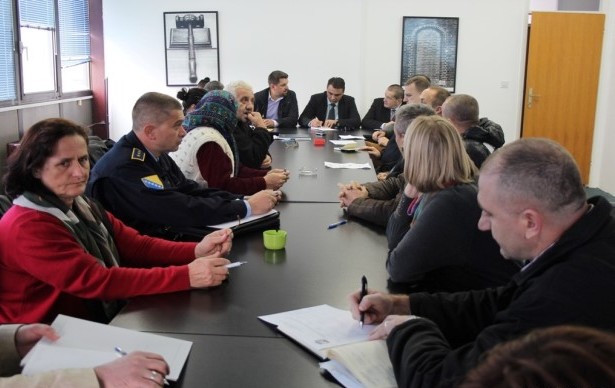
First initial meeting of the Organizing Committee for the organization of the 20th Memorial Day of the Srebrenica Genocide was held on 03.December 2014, at the Potocari Memorial Center.
On this occasion, Organizing Committee whose member is Institute for Research of Crimes against Humanity and International Law of the Sarajevo University appointed the president and vice-presidents of the Committee. Mr. Camil Durakovic, mayor of the Srebrenica, was elected as a president of the Committee, while Vahid Efendi Fazlovic mufti of Tuzla and Mr. Sadik Ahmetovic, Chairman of the Board of the Potocari Memorial Center are elected as vice-presidents.
M.Sc. Muamer Dzananovic, senior associate of the Institute, attended the meeting as a representative of the Institute at this meeting.
ERIH RATHFLEDER VISITED INSTITUTE
November 27, 2014
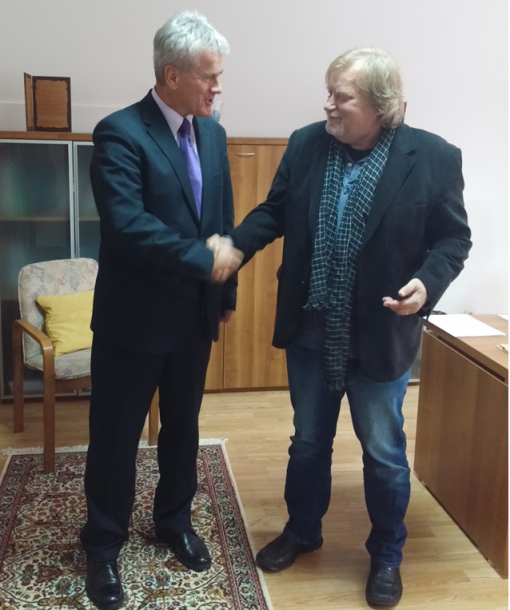
On November 27th.2014, prominent historian, journalist and author Mr. Erih Rathfelder , author of the movie „Zemlja tvrda, a nebo visoko“ (Hard Land, and the sky high) which will be aired on BHT on 28th.November.2014 at 21:30, visited Institute. This documentary deals with the genocide in Prijedor. Mr. Rathfelder is present in the Balkan as the correspondent for newspapers.
He was one of the first journalists who warned that war is inevitable on Balkans. Mr. Rathfelder is author of several books, such are „Sarajevo at the crossroads: 10 Years after the War“, and „Bosnia in focus: second political challenge for Christian Schwarz-Schilling”.
Dr. Rasim Muratovic, director of the Institute, hosted the meeting with Mr. Rathfelder. The topic of the meeting was the current work of the Institute, and the preparation of the 20th Remembrance Day of Srebrenica Genocide. Dr. Muratovic and Mr. Rathfelder agreed on several proposals for organization of Remembrence Day, as well as they agreed future cooperation.
Dr. Rasim Muratovic and Mr. Erih Rathfelder pointed out their satisfaction with the meeting. To remind, the movie by Mr. Erih Rathfleder will be aired on November 28th, 2014, at 21:30 on BHT.
AMBASSADOR OF THE REPUBLIC OF AUSTRIA VISITED INSTITUTE
November 26, 2014
On Monday, November 24th 2014, His Excellency Ambassador Martin Pammer, Ambassador of the Republic of Austria in Bosnia and Herzegovina visited Institute for Research of Crimes against Humanity and International Law of the Sarajevo University.
Director of the Institute, dr. Rasim Muratovic hosted the meeting with Ambassador Martin Pammer. Focus of the meeting was possible cooperation between the Institute and similar scientific and research institutions engaged in the research of the crimes against humanity and international law from the Republic of Austria.
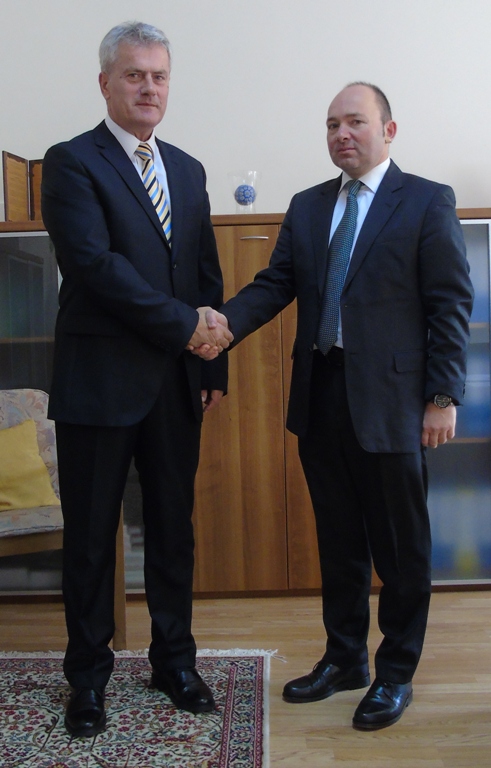
REPRESENTATIVES AND MEMBERS OF ASSOCIATIONS AND INSTITUTIONS DEALING WITH THE GENOCIDE IN SREBRENICA VISITED INSTITUTE
November 21, 2014
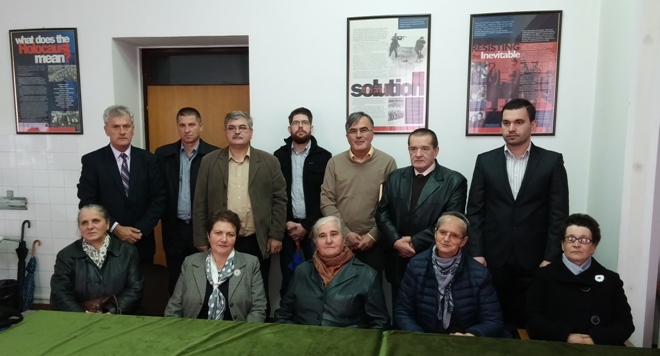
On 20th November 2014, the director of the Institute for Research of Crimes against Humanity and International Law of the Sarajevo University, dr. Rasim Muratovic, organized and hosted a joint meeting with the representatives of associations and institutions dealing with the genocide in Srebrenica.
Attendants of the meeting, besides dr. Muratović, were; Mr. Amor Masovic, member of the Board of Directors of the Institute for Missing Persons in Bosnia and Herzegovina; Mr. Mersed Smajlovic, director of the Potocari Memorial Center; Ms. Munira Subasic, chairwoman of the “Association of the Mothers of Srebrenica and Zepa Enclaves”; Ms. Sabaheta Fejzic, member of “Association of the Mothers of Srebrenica and Zepa Enclaves”; Mr. Jasmin Meskovic, president of the “Association of the Concetration Camp Detainees of Bosnia and Herzegovina”; Ms. Hatidza Mehmedovic, president of the association “Mothers of Srebrenica”; Ermin Hadzimusic, vice president of the “Association of the Victims and Witnesses of Genocide”; Ms. Suhra Sinanovic, president of the “Association of Women of Podrinje”; and Ms. Hajra Catic, president of the association “Women of Srebrenica”.
The attendants at the meeting discussed, among many other things, the organization of the 20th Remembrance Day of Genocide in “UN-Safe Zone” Srebrenica, and other possibilities of cooperation.
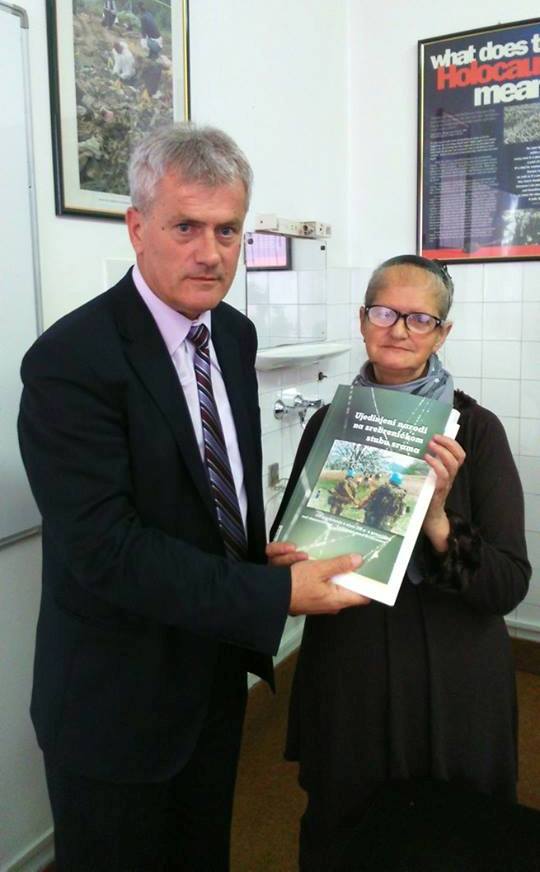
PRESS ANNOUNCEMENT
November 10, 2014
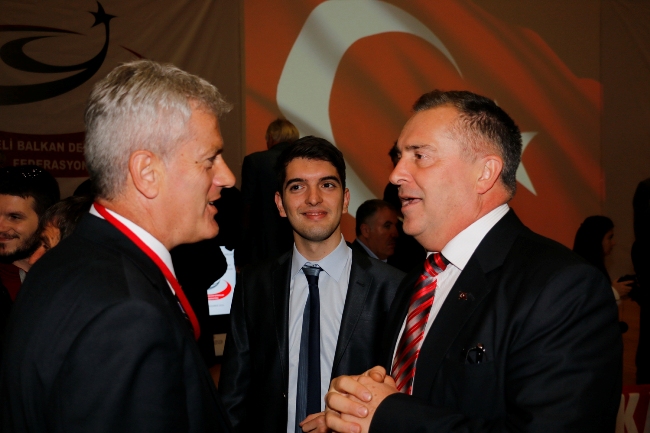 Director of the Institute Dr. Rasim Muratović with Consul General of Bosnia and Herzegovina in Istanbul, Mr. Hrvoje Kant
Director of the Institute Dr. Rasim Muratović with Consul General of Bosnia and Herzegovina in Istanbul, Mr. Hrvoje Kant
In the period from 4th – 7th November 2014, the director of the Institute for Research of Crimes against Humanity and International Law of the Sarajevo University, dr. Rasim Muratović, attended the Third Congress of Balkan Federation in Istanbul, Turkey. The topic of the Congress was “Balkan Migrations”, organized by Istanbul University 1453 and Balkan Federation. Dr. Muratović held presentation on topic “Genocide and Migrations in Bosnia and Herzegovina at end of XX Century”.
During the Congress, Dr. Muratović presented five projects going on at the Institute for Research of Crimes against Humanity and International Law of the Sarajevo University to the president of Balkan Federation, Mr. Ayhan Bölükbaşı (Bolukbasi). In this regard, they agreed to sign a cooperation agreement.
Dr. Muratović visited Consulate General of Bosnia and Herzegovina in Istanbul, and had short and friendly meeting with Consul General, Mr. Hrvoje Kant.
At the end of Third Balkan Congress, Dr. Muratović was awarded for outstanding contribution to the Congress.
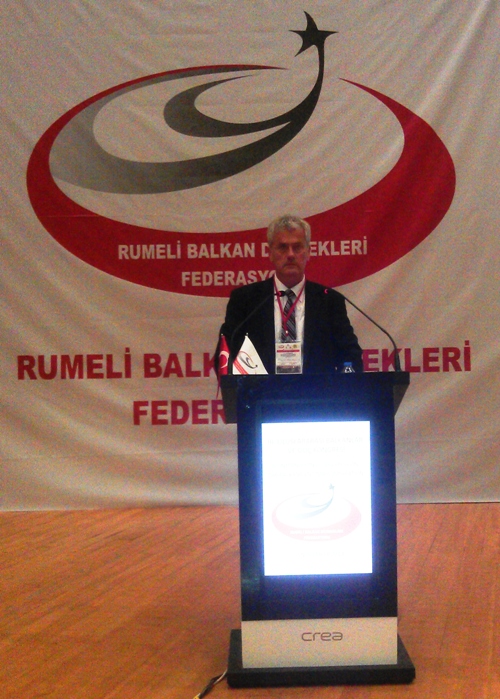
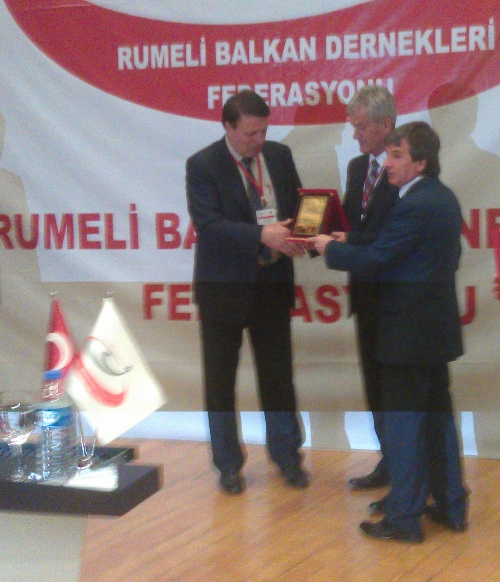
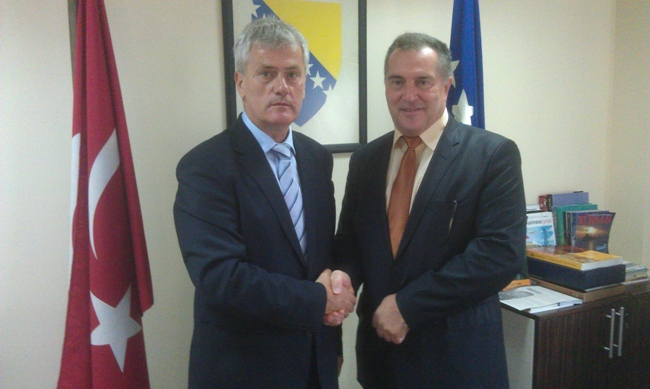 Director of the Institute Dr. Rasim Muratović at the Consulate General of Bosnia and Herzegovina in Istanbul with Consul General, Mr. Hrvoje Kant
Director of the Institute Dr. Rasim Muratović at the Consulate General of Bosnia and Herzegovina in Istanbul with Consul General, Mr. Hrvoje Kant
SHOOTING SERIES "Oral B&History"
Oktober 27, 2014
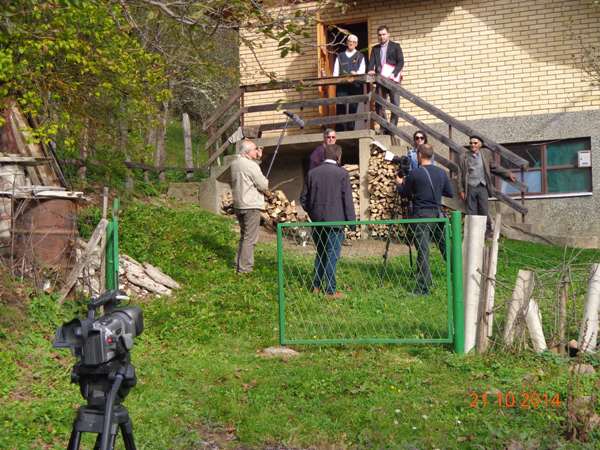
Associates and researchers of the Institute, working on preparation of the production and scenario, are Fuad Jasarević, Elvira Toković, Ermin Kuka, Muamer Džananović, Sead Muhić, Almir Grabovica and Jasmina Zagorica.
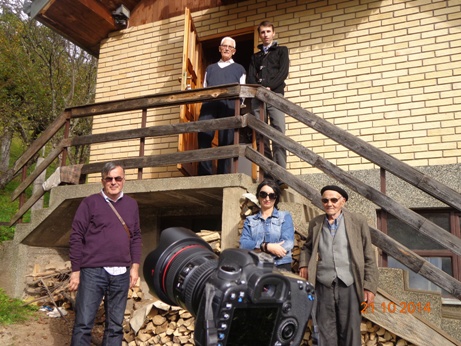
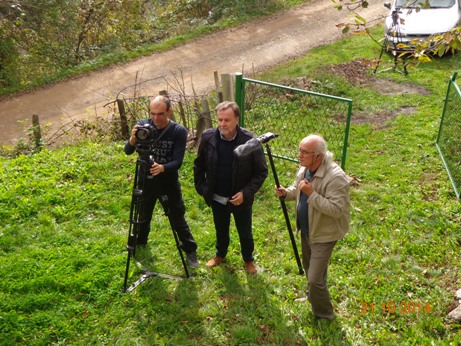
ITALIAN AMBASSADOR IN BOSNIA AND HERZEGOVINA VISITED INSTITUTE
Oktober 23, 2014
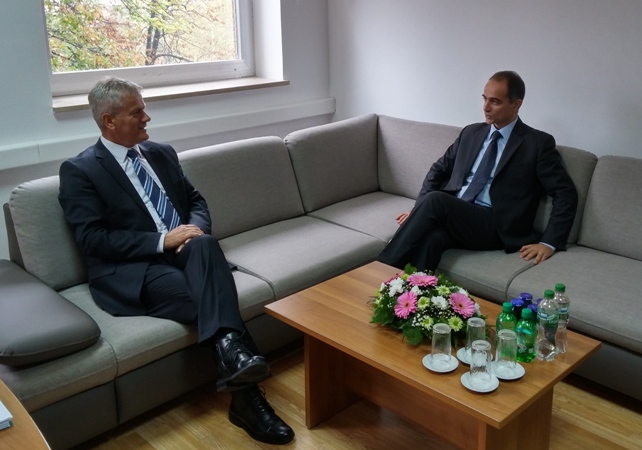
On this occasion, Ambassador Ruggero Corrias had meeting with the director of the Institute, Dr. Rasim Muratovic. The meeting was focused specifically on the possibility of using European funds which are intended to support financially the various projects in the field of research the crimes against humanity and international law.
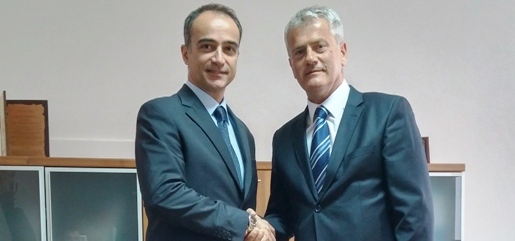
FLORENCE HARTMANN VISITED INSTITUTE
Oktober 22, 2014
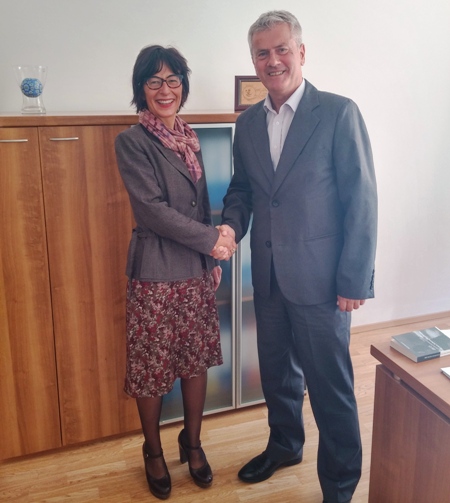
Dr. Rasim Muratovic and Ms. Florence Hartmann discussed about work of the Institute, 20th Genocide Memorial Day, UN Safe zone, and various types of possible cooperation.
Ms. Florence Hartmann is a French journalist and author. In the period from 2000 till 2006 she was official spokesperson and Balkan adviser to Carla Del Ponte, chief prosecutor of the ICTY in The Hague. Her books, “Milosevic – la diagonale du fou” (Milosevic – Diagonal of a Madman) and “Peace and Punishment” gained great attention worldwide.
ANNOUNCEMENT
Oktober 20, 2014
The Institute for Research of Crimes against Humanity and International Law of the Sarajevo University, within own “Movie and audio-video center” start shooting the documentary “Oral BiHistory”. This project, as a series of ten short documentaries, aims to introduce the public with crimes commited over civilians in Bosnia and Herzegovina in Second World War, as well as in recent aggression against Bosnia and Herzegovina, from 1992 till 1995. Each of these short documentaries will include three testimonies, including all the relevant documentation. The first season of these documentaries will be recorded in the area of Eastern Bosnia.
“Along with the continuing of previous work of Institute, meaning publishing of books, studies, research, international scientific conferences and other activities, the Institute now decided to go in line with modern trends, and therefore we are starting multimedia presentation of our research in movie and audio-video form”, said Dr. Rasim Muratovic, the director of the Institute for Research of Crimes against Humanity and International Law of the Sarajevo University.
For this important project, the Institute hired a prominent B&H director Mr. Semsudin Gegic. Mr. Semsudin Gegic won a number of international awards for his work as a movie director, and he is dealing with these topics last three decades.
“I have recorded more than 30 documentaries in my professional life, all of them dealing with these topics, the drama and tragedy of the people of this area. Therefore, my great experience in these topics is the key in how to deal with enormous hardship of witnesses of personal tragedies and losses, as a man and as a professional”, said Mr. Semsudin Gegic.
Within overall activities, on Tuesday 21st October 2014, the Institute for Research of Crimes against Humanity and International Law of the Sarajevo University will post the documentary “Video business card of the Institute” on the YouTube channel.
AMBASSADOR OF THE REPUBLIC OF CROATIA IN BOSNIA AND HERZEGOVINA
HIS EXCELLENCY IVAN DEL VECHIO VISITED INSTITUTE
September 10, 2014
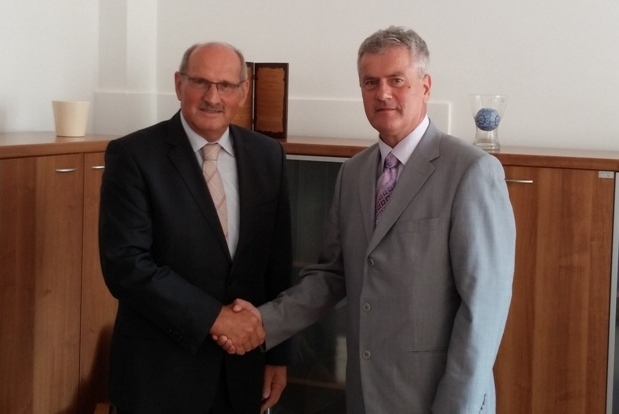
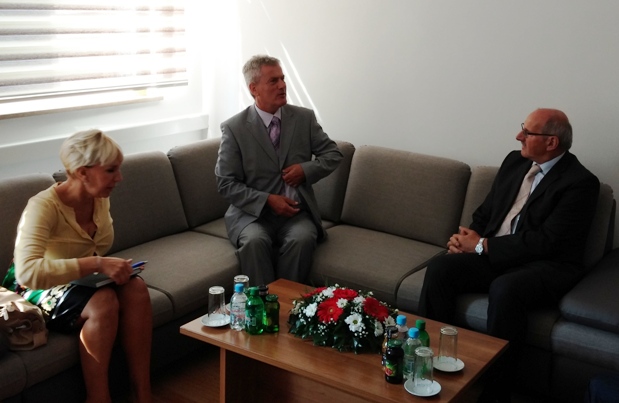
AMBASSADOR OF THE KINGDOM OF SAUDI ARABIA IN BOSNIA AND HERZEGOVINA
HIS EXCELLENCY EID BIN MOHAMMED ALTHAKAFI VISITED INSTITUTE
August 20, 2014
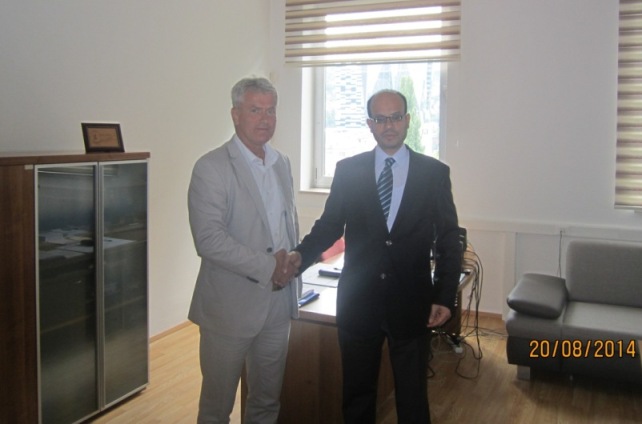
Ambassador was hosted by the director of the Institute, Dr. Rasim Muratovic, and after the meeting was concluded with mutual understanding and wish for further cooperation, they visited library and archive of the Institute.
The director of the Institute is very grateful to Ambassador for this visit, and welcomes further meetings and cooperation.
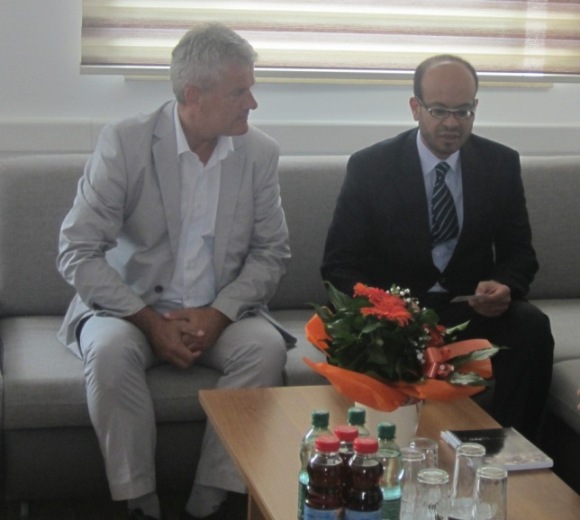
PUBLIC NOTICE
July 9, 2014
On 09. 07. 2014, Mr. Ivar Amundsen, the Honorary Consul of Bosnia and Herzegovina in the Kingdom of Norway was in the official visit to the
Institute for Research of Crimes against Humanity and International Law of the Sarajevo University. After meeting with Dr. Rasim Muratovic,
the director of the Institute for Research of Crimes against Humanity and International Law, the Honorary Consul visited the official
archive of the Institute and expressed the pleasure of having such meeting. The conclusion
of the meeting is that both sides expressed the satisfaction and will to continue with the cooperation.
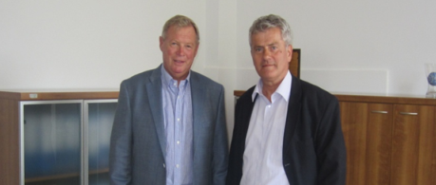
Ivar Amundsen and Ph.D. Rasim Muratović
ELECTED NEW DIRECTOR OF THE INSTITUTE
Posted on June 5, 2014
We would like to inform the public that, on the basis of a public competition conducted procedure of electing the director of the Institute for Research of Crimes against Humanity and International Law, University of Sarajevo, on the basis that Ph.D. Rasim Muratović, senior research scientist to the Institute, elected for the Director of the Institute. As Director of the Institute Ph.D. Rasim Muratović will perform in the next four years, with effect from 1 June of 2014. Decision on the appointment of Ph.D. Muratović presented the rector of the University of Sarajevo, BA. Ph.D. Muharem Avdispahić, at the 22nd session of the Senate of the University of Sarajevo, on 4 June 2014th year.
Ph.D. Rasim Muratović was born on March 1, 1956th year in the Olovo. Faculty of Political Sciences, Department of Sociology, he finished 1978th, and 1985th year he defended his master's thesis at the Interdisciplinary graduate school. In September, the 2005th year, the Faculty of Political Sciences in Sarajevo, defended his doctoral thesis on the topic: " The Holocaust against the Jews and genocide against Bosniaks ", after he was hired as The external collaborator, and from April 1, 2006th, as a permanent employee of Institute for research of Crimes against humanity and International Law, University of Sarajevo. Ph.D.Rasim Muratović so far published 11 books ( of which 5 are translate from Norway, while the remaining six make copyright works ), of which the most notable works of "Genocide in Ahmići 1993" and "Milošević in the Hague war - documentation", a translation of the famous Norwegian author Kjell Arild Nielsen . He is the author of 33 scientific papers and essays on the Norwegian and Bosnian language. He has also published two novels and worked at three research projects, and participated in 11 international and 18 national scientific conferences.
Institute for Research of Crimes, as a member of the University of Sarajevo, is the only academic institution in Bosnia and Herzegovina, which is a basic vital scientific research interest, Research of Crimes against Humanity and International Law. Formed in September 1992 in an extremely complex and difficult social, political , economic, military, and security conditions and international relations. The Institute has over two decades of existence thanks to the results of scientific research, achieved remarkable results, and scientific and professional recognition and respect in our country, Europe and the world .
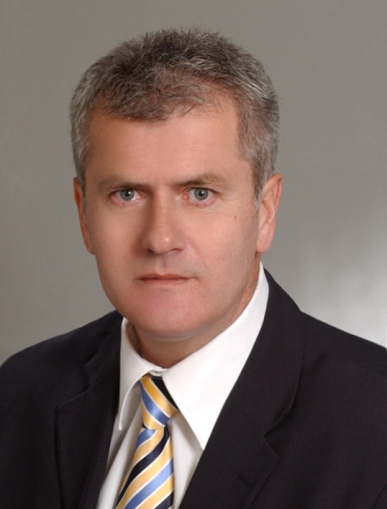
Ph.D. Rasim Muratović
BIOGRAPHY PhD RASIM MURATOVIĆ
BIOGRAPHY.doc
AWARDS PhD RASIM MURATOVIĆ
AWARDS.doc
OTHER ACTIVITIES PhD RASIM MURATOVIĆ
OTHER ACTIVITIES.doc
PUBLISHED WORK PhD RASIM MURATOVIĆ
PUBLISHED WORK.doc
A LECTURE GIVEN BY DR. ARNE JOHAN VETLESEN “LOGIC OF GENOCIDE: BETWEEN COLLECTIVE AND INDIVIDUAL ACTION”
1 June 2016
Having been organized by the Institute for Research of Crimes against Humanity and International Law in Sarajevo, on Tuesday, 31 May 2016, at the Faculty of Political Sciences in Sarajevo, Dr. Arne Johan VETLESEN gave a lecture on "The logic of genocide: between collective and individual action."
Dr.Rasim Muratovic, director of the Institute for Research of Crimes against Humanity and International Law, University of Sarajevo, as well as Dr. Smail Cekic briefly addressed students, members of the academic community, and many guests from the public and cultural life who were present there.
Professor Arne Johan VETLESEN is one of the most famous Norwegian philosophers. He is a professor of Political philosophy at the University of Oslo. He is an author of twenty books and numerous research papers and essays in which he studies the concept of evil.
In the honor of his continuous work on the study of evil, and human dignity, he was awarded Fangenes testamente (Camp-inmate’s testament, 2004), which is awarded annually by the Norwegian Institute for Peace to researchers who have made a special contribution in the fight against evil. Professor Vetlesen in his broad scientific work offered scientific and wider public the scientific truth about the events in Bosnia 1992-1995.
He has published numerous books including Evil and Human Agency, Understanding Collective evildoing (2005), Death (2004), Moralens sjanse i markedets tidsalder (2003). Vetlesen’s scientific essays are an attempt for science to be used in understanding the barbarity and criminal instincts which result in genocide, aimed at understanding causes, objectives and scale of the genocide and the prevention of genocide as a crime and evil of the highest rank.
INSTITUTE FOR RESEARCH OF CRIMES AGAINST HUMANITY AND INTERNATIONAL LAW SARAJEVO WAS DONATED FIVE THOUSAND MARKS
1 June 2016
The budget of the Municipality of Sarajevo Center provided the Institute for Research of Crimes against Humanity and International Law Sarajevo with five thousand marks.
Protocol on the implementation of these funds which will be spent for the purchase of computer and related equipment, was signed by the Mayor of Sarajevo Centre, Dzevad Becirevic and director of the Institute for Research of Crimes against Humanity and International Law Sarajevo, Dr. Rasim Muratovic.
On this occasion, Director Muratovic and Secretary of the Institute for Research of Crimes against Humanity and International Law Sarajevo, Fuad Jasarevic, visited on 31 May 2016, the Municipality of Centre where Jasna Beba, secretary of the municipal administration and Mustafa Resić, adviser to the head of municipality, gave them the stated Protocol.
Director Muratovic thanked Mayor Becirevic and the Municipal Council for the support provided for the Institute for several years.
-“Donated means mean a lot to us and this is not the first time that the Municipality Centre helps us. Support of this Municipality has become traditional and this encourages us. In the hardest times, the Municipality Center was with us and I hope that such cooperation will continue in the future”, said Muratovic.
NORWEGIAN TEACHERS VISIT THE INSTITUTE
6 May 2016
On Friday, 6 May 2016, the Institute for Research of Crimes against Humanity and International Law, University of Sarajevo, was visited by the group of Norwegian teachers. Dr Rasim Muratovic, the host of the meeting and director of the Institute, presented the guests to the activities of the Institute along to the facts about the aggression against the Republic of Bosnian and Herzegovina 1992-1995.
The new editions of the Institute for Research of Crimes against Humanity and International Law were also displayed to the visitors which include the translations of famous Norwegian authors into Bosnian language by dr Rasim Muratovic.
MR AMINA DZUVIC - RIZVANBEGOVIC, DIRECTOR OF THE BOSNIAK INSTITUTE - ADIL ZULFIKARPASIC FOUNDATION VISITS THE INSTITUTE
28 April 2016

On Thursday, 28 April 2016, the Institute for Research of Crimes against Humanity and International Law, University of Sarajevo, visited Mr Amina Dzuvic- Rizvanbegovic, the director of the Bosniak Institute- Adil Zulfikarpasic Foundation.
The host of the meeting was dr Rasim Muratovic, director of the Institute and during the meeting they discussed the cooperation in connection with the marking the 21st anniversary of the genocide in Srebrenica.
DIRECTOR OF THE INSTITUTE VISITS THE CROATIAN MEMORIAL AND DOCUMENTATION CENTER OF HOMELAND WAR IN ZAGREB
25 April 2016


On 22 April 2016 the director of the Institute for Research of Crimes against Humanity and International Law, University of Sarajevo, while in working visit to the Croatian memorial and documentation center of Homeland War in Zagreb, met the director of the center, dr Ante Nazor. The joint meeting's goal was to introduce a host to the projects which were realized and are about to be realized by the Institute.
At the meeting, the director Rasim Muratovic met the director of the Centre, Dr Nazor with the activities and projects that the Institute caried out and the projects in preparation. The mutual interest in projects which had been carried out by both research institutions was displayed. During the meeting it has been concluded that there are a lot of points of reference on which there is a need for cooperation.
The further activities for improving cooperation and specific projects which these two research institutions will mutually implement, were agreed.
PRESS RELEASE
1 April 2016
On the occasion of the Judgment of Vojislav Seselj by the ICTY on 31 March 2016, the Institute for Research of Crimes against Humanity and International Law, University of Sarajevo, is givin a brief Press Release: - Firstly, the researchers of genocide and other forms of crimes against humanity and international law have been surprised, shocked and outraged by the first-instance verdict;
- Secondly, the verdict is completely in contrast to the norms of the International humanitarian law as well as contrary to relevant evidence and relevant, reliable, significant and sustainable data- factual and empirical;
- Thirdly, we expect the Appeals Chamber would correct the crucial mistakes, omissions and drawbacks of what had been wrongly concluded, namely the misinterpretation, significance and meaning of all relevant evidence and facts- factual findings i.e. arguments.
Dr, Rasim Muratovic, scientific advisor

Radovan Karadzic sentenced to 40 years in prison by the first-instance verdict
28 March 2016

The International Criminal Tribunal for the former Yugoslavia (ICTY) sentenced Radovan Karadzic to 40 years in prison on 24 March 2016 by the first-instance verdict for the genocide, crimes against humanity and violations of laws and customs of war.
Karadzic, the first president of the Republic of Srpska and the supreme civilian commander of the Army of the Republic of Srpska during the Serbian aggression against the Republic of Bosnia and Herzegovina 1992-1995, was found guilty of 10 out of 11-count indictment at a UN tribunal in The Hague.
He was found guilty of a joint criminal enterprise in connection with the siege of Sarajevo 1992-1995 for which he bears full individual and criminal responsibility.
The Trial Chamber of the ICTY convicted Karadzic guilty of taking the UN observers hostages during the NATO air strikes on the positions of the Army of the Republic of Srpska (ARS) in 1995.
The Trial Chamber of the International Criminal Tribunal for the former Yugoslavia has decided that Radovan Karadzic is not guilty for the genocide in seven municipalities in Bosnia and Herzegovina: Bratunac, Foca, Kljuc, Prijedor, Sanski Most, Vlassenica and Zvornik which was the first of two charges of genocide.
The Trial Chamber found that the accused bears the full individual and criminal responsibility for persecution, extermination, murder, deportation and forcible transfer as the crimes against humanity and murder as a violation of the laws and customs of war for seven municipalities.
The Council stated that the members of the Bosnian Serb forces had the intention to destroy the Bosnian Muslims in the Srebrenica enclave, as such. Among other things, the Council concluded that Karadzic was the only person in the Republic of Srpska who had the power to intervene in the killing of Bosnian Muslims, but he “not only failed to prevent the killing but personally ordered the Bosnian Muslims to be transferred from Bratunac to other places in order to be killed in the Zvornik area”.
The Trial Chamber agreed that Karadzic declared war on the territory of Srebrenica on 14 July 1995- i.e. in Skelani, which allowed Drina Corps of the Army of the Republic of Srpska to use all material resources and facilitate the actions of killing.
The evidence in this case showed, as concluded by the Council, that at least five thousand (5 000) Bosnian Muslims were killed in the events specified in the part of the indictment relating to the crimes committed in Srebrenica.
When it comes to the siege of Sarajevo, the shelling and sniping campaign against civilians and civilian targets in Sarajevo, the Trial Chamber found that civilians were the direct target of the Sarajevo-Romanija Corps (SRC) of the Army of the Republic of Srpska as illustrated by sniper incidents or they were exposed to indiscriminate and excessive fire as when SRC threw air bombs and fire grenades at the locations of assembly civilians.
The three-judge panel rejected the claims of the accused that the “Bosnian forces deliberately targeted its own civilians in order to draw the international intervention.”
"The accused, Radovan Karadzic, bears individual and criminal responsibility for murder, unlawful attack on civilians and spreading terror as a violation of the laws or customs of war and murder as a crime against humanity", ruled the Trial Chamber in the part of the judgment against Karadzic referring to the holding in the siege, shelling and sniping of civilians.
The Council concluded in the part of the judgment that which founded Karadzic guilty of taking members of UN troops hostage, that Karadzic has contributed to the common goal for the UN members to be taken hostage in order to distract NATO from further airstrikes. The judges found that Karadzic was directly involved in the operation of taking UN hostages. During the reading of the judgment it was stated that Karadzic oversaw the hostage-taking, receiving reports, and presented the conditions for the release of members of the UN forces.
Karadzic's trial began in 2009 and took more than five years. Until October 2014, Karadzic was under a false name, Dragan Dabic, and after more than 13 years, was arrested in Belgrade in 2008 and transferred to the ICTY detention unit.
As witnesses for the prosecution and the defense, numerous victims, international and local experts and officials, members of UNPROFOR, as well as persons previously convicted of crimes by The Hague Tribunal appeared in the trial.
Verdict of Radovan Karadzic before the Hague Tribunal was watched by around 300 people. The director of the Institute for Research of Crimes against Humanity and International Law, University of Sarajevo, dr Rasim Muratovic, was also present and he traveled there by the organization of the Association of Victims and witnesses of genocide and the Association of Mothers of Srebrenica and Zepa. With them, there also traveled the representatives of the students of Bosanska Krajina, the representatives of missing persons from Kozarac and Prijedor, the Association of children killed in Sarajevo, the Association of peace, justice, return and reconciliation, as well as the representatives of missing and murdered persons from Zepa and the Potocari Memorial Centre.
In the premises of the Institute, the direct monitoring of verdict was organized and attended by the employees of the Institute, representatives of the Association of parents of children killed in Sarajevo, numerous guests and media representatives.
PDF KARADZIC - JUDGEMENT
 Dr Rasim Muratovic, director of the Institute and Amir Ahmic, Bosniak liaison officer in The Hague tribunal
Dr Rasim Muratovic, director of the Institute and Amir Ahmic, Bosniak liaison officer in The Hague tribunal
GOING TOWARD THE JUDGEMENT: Radovan Karadzic from Durmitor to The Hague
21 March 2016

There were more than 700 mass graves: 1200 buildings of Islamic architecture were systematically destroyed and looted; 500 buildings owned by the Catholic Church and several dozens of Jewish religious sites, hundreds of thousands of houses and flats were looted, destroyed and burned to the ground.
The one who flies high, falls low. Radovan Karadzic made himself see this proverb by “flying” over the Durmitor mountain heights to the Dutch sandy plains… flying over Sarajevo in which he came in 1960 as a fourteen-year-old boy after finishing primary school in his native Petnjica, the village between Zabljak and Savnik.
Without any problems, firstly he enrolled the Medical secondary school and subsequently the Medical faculty, University of Sarajevo. For many young people of that time enrolling one or the other, especially both the school and faculty of this kind was just an abstract noun. A secret hand opened widely the door of Sarajevo to Vuk’s son, a member of the fascist Chetnik movement of Dragomir Drazo Mihailovic during WWII.
He didn’t like cities
…And not just the door of Sarajevo was opened for him. The student’s volunteering in Denmark is what followed as well as the medial specialty in the USA etc. He got employed at the state University Medical Centre in Sarajevo immediately after graduation. Then he got married and was given the apartment in the center of Sarajevo, fifty meters away from the Central Committee building of the League of Communists of Bosnia and Herzegovina, at the street of the revolutionary name Sutjeska 2, and max three hundred meters away from the Clinic where he was everything but the director.
Radovan didn’t like cities that was written down in one of his poems on the eve of nineties: “Down to the cities to fight the bastards”. Radovan especially didn’t like Sarajevo justifying it by one of the Serbian myths according to which Sarajevo “was built on the holy Serbian land”. Radovan was spreading hatred and igniting the fire of nationalism, chauvinism and fascism by his myth-based speeches which were well accepted in the time of decaying of a system and state disintegration. In that vacuum Radovan Karadzic and his cooperatives were daily directed from the highest places in Belgrade while they behaved as protectors of Serbianism, Christianity and Europe in exchange for the destruction of those who were engineered barriers and opposite of all these i.e. Bosniaks.
“For just a few day Sarajevo will be destroyed to the ground and 500 000 of them will be dead. Within a month, Muslims of Bosnia and Herzegovina will be destroyed.” These are the words which Radovan Karadzic told his close ally Momcilo Mandic, in early October 1991 (i.e. six months before the start of the Bosnian war) and therefore mathematically precise he explained genocidal and mapped plan of Belgrade Greater politics and his mathematically projected consequences by the logic of the Holocaust. The consequences were the following: 2 200 000 persons were displaced which makes more than a half of total population of the Republic of Bosnia and Herzegovina. According to the census of March, more than 100 000 people were killed; around 30 000 women, young girls and men were raped and sexually abused; 650 of concentration camps were formed through which about 200 000 inmates passed out of which 200 were killed. There were more than 700 mass graves and 1 200 buildings of the Islamic architecture were systematically destroyed and looted; 500 buildings owned by the Catholic Church and several dozens of Jewish religious sites, hundreds of thousands of houses and flats were looted, destroyed and burned to the ground. Between 60 and 70 percent of the total housing units were damaged in the Republic of Bosnia and Herzegovina; various infrastructure facilities in the field of transport and communication were destroyed while numerous industrial buildings, farms, hotels, motels and tourist centers as well as various small private craft and shopping outlets were destroyed and damaged. 60 percent of industrial facilities and 55 percent of health facilities were destroyed while 349 doctors were killed and almost all educational, scientific, cultural and sports facilities were destroyed. The National Library was burned down as well as the Oriental institute.
These are just fundamental results of the ground Serbism and geopolitical grand-mania, fascist, dark and aggressive-conquering mentality of the Serbian duo Slobodan Milosevic from the Left River and Radovan Karadzic from Petnjica on Durmitor mountains. They were of rural mentality which (led by the logic of plowing boundaries and brigandage of neighbor’s fields) was seen in each of their gestures. Even limited military mind of Ratko Mladic even from the conceptual stage of the Great Serbian project called everything that was listed by genocide, asking himself at one of the military-political meeting:” I don’t know how Krajisnik and Karadzic will explain this to the world. This is genocide, dear people.”
In the third amended indictment of the International Criminal Tribunal for the former Yugoslavia in The Hague, Radovan Karadzic was charged, among others, with genocide, crimes against humanity and international law and violation of the laws and customs of war, as follows:
Article I- Genocide: Radovan Karadzic by prearrangement committed, planned, instigated and/or aided and abetted genocide over the part of the national, ethnic and/or religious groups of Bosnian Muslims and/or Bosnian Croats as such. Radovan Karadzic participated in joint criminal enterprise to permanently remove Bosnian Muslims and Bosnian Croats from the area of Bosnia and Herzegovina which were the Serb-claimed territories. The intention to partially destroy these groups is manifested in the most extreme way in Bratunaac, Foca, Kljuc, Prijedor, Sanski Most, Vlasenica and Zvornik.
Article II: Genocide: Radovan Karadzic participated in joint crirminal enterprise to eliminate Bosnian Muslims by killing men and women from Srebrenica as well as by forcible removal of women, girls and the part of older men.
Article III- Persecution: Radovan Karadzic is specifically charged with the persecutions in the following municipalities: Banja Luka, Bijeljina, Bosanski Novi, Bratunac, Brcko, Foca, Hadzici, Ilidza, Kljuc, Novi Grad, Novo Sarajevo, Pale, Prijedor, Rogatica, Sanski Most, Sokolac, Visegrad, Vlasenica, Vogosca, Zvornik as well as persecutions from Srebrenica.
Articles IV, V, VI. Extermination, murder: Radovan Karadzic by arrangement with others committed, planned, instigated, ordered and abetted the extermination and murder of Bosnian Muslims and Bosnian Croats from Srebrenica and Sarajevo.
Articles VII, VIII- deportations, inhumane acts: Forced displacement of Bosnian Muslims and Bosnian Croats from Bosnian Serb-claimed territory by means which included the crimes of forcible transfer and deportation.
Articles IX, X- Terror and unlawful acts: Radovan Karadzic participated in joint criminal enterprise to establish and carry out the campaign of sniping and shelling against the civilian population of Sarajevo. By sniping and shelling thousands of civilians of both sexes and of all ages, including children and the elderly were killed and wounded.
Article XI- taking of Hostages: Radovan Karadzic by arrangement with others committed, planned, and instigated, ordered and/or aided and abetted taking the UN military observers and UN peacekeepers as hostages. Between approximately 26 May 1995 and 19 June 1995 ARS detained over two hundred peacekeepers and UN military observers in various locations including Pale, Sarajevo, Banja Luka and Gorazde and held them hostage at various locations.
General Allegations: All acts and omissions the accused was charged with as the crimes against humanity and international law, with the exception of the one as the part of the campaign of sniping and shelling of Sarajevo, were the part of a widespread and systematic attack directed towards the civilian population of Bosnia and Herzegovina. Victims of all crimes that were alleged as violations of common article II of the Geneva Conventions of 1949 were persons taking no active participation in hostilities.
They are all guilty
What has been known as a scientific fact for a long time is that Radovan Karadzic as the president of the Republic of Srpska and Supreme Commander of the Armed Forces was an exponent of Belgrade and the Serbian political, military and police regime. This regime planned, organized, prepared and carried out the aggression against internationally recognized country, the Republic of Bosnia and Herzegovina. Radovan Karadzic was encouraged and helped by JNA and he performed political and armed rebellion against the constitutional order of the Republic of Bosnia and Herzegovina which represents the most serious offense in all socio-political systems.
The main objective of this aggressive war-mongering politics, led by Millosevic and Karadzic as his assistant in the case of Bosnia and Herzegovina, was the war with the purpose of conquering territory as well as expulsion and physical liquidation and elimination of non-Serbs from criminally conquered areas. All these acts were done under the flag of fascist ideological fanaticism of the “national threat”. Under that motto the wars from Slovenia to Kosovo were led along with the systematic and media propaganda about the alleged “demonization of the Serbs”. All were to blame: Muslims, Croats, Albanians, Ustashas, Bali, KLA, and the Green Berets, the mujahedeen, NATO, CIA, the intelligence services of France, Germany, the Vatican, and Tehran… All but them were guilty. Shortly, a lie is ubiquitous and methodologically designed constant that verbally supports and evaluates every war option, massacre and each and every crime. At the same time, the Serbian “victories” and eulogies were counting.
Crimes which preceded those “victories” were displayed as a suicide treacheries of the victims themselves:
Muslims are shelling themselves, KLA is displacing, and NATO makes people flee, French secret services organized the genocide in Srebrenica.
This is, namely, the essence of the Greater expansionist, aggressive and warrior, criminal and genocidal policies and practice, drenched in blood and violence of logic of fascistic-drawn “ethnic cleansing”. When the results of Milosevic and Karadzic’s evil are inspected thoroughly today, it is logical to wonder: What were those men like? What were the millions of those who obediently followed, extolled and celebrated them like?
“Are those people different from all of us” is what Stenley Milgram, the American psychologist at Yale University wondered studying the psychological profile of Nazis in WWII. “Were those people corrupted, damaged and ready for commission of evil? Or was it just an unfortunate combination of various factors which created a defective and sick person?” It is not impossible that the case of Milosevic and Karadzic, in the social broadest sense of the word, is about “the ideas and beliefs that must be considered as mental illness in the world of modern civilization.”
It suggests that some views and values, despite its commonsense abnormalities in certain areas are being cared for as dominant not allowing others to be developed. It produces catholicity of personal mutual similarity of a number of individuals which will ease the division of the planned set of roles. Certain personality types correspond to each other and to a particular time. It was noticed that the neurotic and hysterical characters could be found together. Radovan, just like Slobodan legitimated themselves as the people of lies, hatred and exclusion. A hundred and thousands were killed, millions of marginalized and displaced non-Serbs were the price of their ethnic pride and ethnic Nazis complacency. However, everything was for nothing. Great-objective was not achieved. Eventually, a normal man is to be asked: “What for were all those dead heads and permanent unfinished wars?”
It remains for science the task to investigate the social, economic, political, psychological, historical and all other assumptions that have contributed to the biggest crimes at the end of the XX century. The accused war criminal Radovan Karadzic will be sentenced on Thursday, on the eve of Good Friday (according to Gregorian calendar), on 24 March 2016, for all crimes against humanity and international law committed by the formations, the police and army of the Republic of Srpska whose supreme commander was Karadzic. According to the rules of the International Criminal Tribunal for the former Yugoslavia the penalty for the crimes the accused Karadzic is charged with can be life imprisonment or 40 years in prison. For him, personally, it is almost irrelevant which of the two penalties would be imposed.
For victims, a life sentence for Karadzic would be something that is implied and a minimum below which there is nowhere to go. Life sentence would be a glimmer of comfort for victims, a little satisfaction and great hope that justice is still attainable and that it is still over injustice in this mute and unjust world. Whatever the judgment is, it will be of great importance, especially for science. Holocaust was a “dumb” tragedy that began to truly unfold only when there appeared valued sociologists, anthropologists, historians, poets, writers and philosophers who gradually created the vocabulary for its articulation because suppression of any form of verbiage is nothing but a form of dehumanization.
We, at the Institute for the Research of Crimes against Humanity and International Law, University of Sarajevo, want to explore the problem of crimes of this kind and talk about it in a scientific way. We are not interested in that problem from the political, moral or penal standpoint, but in a particular event which we want to explore and display scientifically i.e. objectively. The scientific method of research must be objective, quantified, non-ideological, non-political and not necessarily historical. Science is not the field where the competition of who has suffered the most victims and been an object of criminal actions of the “others “should take place, but the science is an attempt for the resources and power of science to be used for sudden, but regular burglary barbarism and criminal instinct in a large number of people to be understood and eventually to be blocked. Is there a more relevant sample than that of Radovan Karadzic, the president of the Republic of Srpska in the period from 17 December 1992 to 19 July 1996?
(The text of the director of the Institute for Research of Crimes against Humanity and International Law, University of Sarajevo, dr Rasim Muratovic, having been published in Oslobodjenje on 19 March 2016 (pp. 26,27); the text is also available on the web page of Oslobodjenje at: http://www.oslobodjenje.ba/pogledi/u-susret-presudi-radovan-karadzic-od-durmitora-do-haaga)
DIRECTOR OF THE INSTITUTE HAS VISITED PALESTINIAN EMBASSY
19 February 2016

Director of the Institute for Research of Crimes against Humanity and International Law, University of Sarajevo, dr. Rasim Muratovic along with the scientific advisor mr Ermin Kuka, aa senior associate came on an official visit to the Embassy of the State of Palestine in Bosnia and Herzegovina on 19 February 2016. On that occasion they had a meeting with the Ambassador of the State of Palestine in Bosnia and Herzegovina, Nj.E. Rezeq Namoore.
During the meeting the projects of the Institute were discussed as well as the importance of research of crimes against humanity and international law in Bosnia and Herzegovina with the special emphasis having been put on crimes which were committed against the Palestinian people. They discussed the possibilities of cooperation between scientists and researchers from these two countries, as well.

HIGH-SCHOOL GRADUATES OF „OBALA“ VISIT THE INSTITUTE
15 February 2016

Institute for Research of Crimes against Humanity and International Law, University of Sarajevo, was visited by High-school gradutes on 15 February 2016.
High school studentss have payed a visit accompanied by the History teacher, Mrs. Snjezana Melunovic.
The host was the director of the Institute, dr Rasim Muratovic who introduced students to the history and activities of importance of the Institute.
Mr Ermin Kuka, a senior associate of the Insititute gave a presentation entitled „Methods of collecting data on crimes and relevant data sources“ using the project „The genocide in Brcko 1992-1995“ as the exemplary study. Mr Muamer Dzananovic, a senior associate of the Institute, as well, gave a lecture entitled “Methodology of field research on the example of the Crimes against children in Gorazde during the siege 1992-1995”.
After the lectures, the discussion took place and the Institute made a present of its most important publications to the students as well as the library of High school “Obala”.




THE DEBATE HELD ON THE OCASSION OF THE INTERNATIONAL DAY OF HOLOCAUST REMEBRANCE
3 February 2016

On the occasion of January 27- International day of Holocaust remembrance, Institute for Research of Crimes against Humanity and International Law, University of Sarajevo, in cooperation with the vice-chancellor’s office organized debate on the Holocaust remembrance on 3 February 2016, Wednesday, at the Conference Hall.
The following scientists participated in the debate with their presentations:
Dr. Elias Tauber, Anti-Semitic propaganda through writing of Novi list,
Mr Sabina Subašić- Galijatović, Institute for Research of Crimes against Humanity and International Law, University of Sarajevo, The suffering of children in the Holocaust,
Mr Zilha Košuta, Institute for Research of Crimes against Humanity and International Law, University of Sarajevo, Mostar- the place of rescuing Jews from Yugoslavia.
The Vice-Chancellor for scientific and research/artistic and research field of University of Sarajevo dr. Faruk Mekic and dr Rasim Muratović, director of the Institute for Research of Crimes against Humanity and International Law addressed the audience. The presentations were attended by senior students from several secondary schools along with the numerous guests from academic, public, cultural and political life in Sarajevo Canton.





DEAR BOSNIANS FROM THE DIASPORA,
1 January 2016
Twenty years after the aggression against Bosnia and Herzegovina, a great number of Bosnians in many countries all around the world from Canada to New Zealand have established themselves in various fields of academic, economic, cultural and political life. We are aware of the fact that Bosnia and Herzegovina is deep in your heart and that you, in many ways, make a great contribution to the development of Bosnia and Herzegovina along with the spreading truth about what happened during the aggression 1992-1995.
Institute for Research of Crimes against Humanity and International Law, University of Sarajevo, as the institution of considerable importance, the main aim of which is scientific establishment of facts about crimes against humanity and international law committed on its soil, has published 103 scientific papers, out of which 14 were translated into foreign language (English and Norwegian) for more than two decades of its existence.
In contrast to that, Institute has translated five editions from English, four editions from Norwegians and one edition from German into Bosnian language. Institute has so far released ten of its editions bilingually (English-Norwegian). You would agree that this is quite unpretentious. Therefore, we refer this letter to you, our dear Bosnians from the Diaspora, and we kindly ask you to make an extra effort and translate at least one work published by the Institute into the language you speak in the country of your residence.
We are also aware of the fact numerous publications came out in languages of the country where you live which are closely related to Bosnia and Herzegovina, therefore, we kindly ask you to translate the works which are close to your vocation into Bosnian language. We remind you of the fact that there are institutions in every country which support, partly or fully, the projects of this kind. For any further information, feel free to contact us.
With respect,
D I R E C T O R
Dr. Rasim Muratović, scientific adviser

IT WAS HELD THE PROMOTION OF THE BOOK “BOSNIA IS APPROACHING THE PEACE WITH ITSELF”
15 December 2015

The book titled “Bosnia is approaching the peace with itself” by the academician and respectable professor Dr Omer Ibrahimahic was promoted at the Faculty of Political Sciences in Sarajevo on 15 December 2015 and published by the Institute for Research of Crimes against Humanity and International Law.
The book was promoted by Dr. Rasim Muratovic, director of the Institute for Research of Crimes against Humanity and International Law, University of Sarajevo, Dr. Esad Zgodić, a full-time professor at the Faculty of Political Sciences and Ibrahim Spahić. The moderator of the promotion was the academician, Dr. Smail Cekic while the audience was addressed by the author himself, as well.
The promotion was attended by numerous people from the academic, cultural and public life of Bosnia and Herzegovina, as well as a great number of students of the Faculty of Political Sciences in Sarajevo.
The promotion was also attended by the students of High Music School in Sarajevo who performed two compositions.
J.S.Bach : two-voiced invention
Duet of saxophonists:
Mirza Sijerčić, 1st grade
Enida Guja, 4th grade
Professor: Adnan Cico
A.Piazzolla : VIOLENTANGO
Quartet of accordions:
Mirza Maguda, 4th grade
Asmir Hamzić, 4th grade
Ivor Javor-Korjenić, 2nd grade
Haris Kaltak, 2nd grade
Professor: Alen Hodžić



DAVID PETTIGREW VISITS INSTITUTE
27 November 2015

David Pettigrew, PhD, Connecticut State University, USA, visited the Institute for Research of Crimes against Humanity and International Law on Friday, 27 November 2015.
On that occasion, he discussed with Dr Rasim Muratovic, the director of the Institute, the current projects of the Institute, the importance of the investigation of crimes against humanity and international law in Bosnia and Herzegovina and worldwide, as well as the issues of the denial of genocide.
PROMOTION OF THE MONOGRAPH "CRIMES AGAINST CHILDREN in Gorazde during the siege 1992-1995"
4 November 2015

On Wednesday, 04 November 2015 in the Multimedia Room of Novi Grad, Sarajevo, it was promoted the monograph of “Crimes against children in Gorazde during the siege 1992-1995” by Muamer Džananović, MA, which was published by the Institute for Research of Crimes against Humanity and International Law, University of Sarajevo.
The monograph is the result of author’s five-year-long empirical research, in which all the facts about crimes against children in Gorazde during the siege 1992-1995 were set out in serious and scientifically-based methods.
The book was promoted by Dr. Rasim Muratovic, director of the Institute for Research of Crimes against Humanity and International Law, University of Sarajevo, Dr. Ibraković Dzelal, professor at the Faculty of Political Sciences in Sarajevo and Avdo Huseinovic, the publicist. It was particularly noted the addressing of Naza Gazibara, the mother to whom the aggressor from the same shell in Gorazde on 20 April 1994 killed two sons, Nermin (1985) and Amir (1989) as well as her cousin Pilav Dženita (1984) while her husband and her were seriously injured with the implications even today. During the siege of Gorazde, in 1993, her sister, Dženita’s mother was also killed.
The promotion was attended in the crowded Multimedia Room of Novi Grad Municipality, Sarajevo, by parents and relatives of children who were killed in Gorazde, people from the political, cultural and public life, numerous guests and several hundred citizens of Sarajevo. The promotion was opened by performing the composition by Johann Sebastian Bach, "Prelude from Suite no. 2 ", by Alek Isakovic playing the cello, a student of the Music High School in Sarajevo in the class of Professor Anela Smajic.
Mr. Muamer Džananović was born in Gorazde in 1985. He works as a senior associate at the Institute for Research of Crimes against Humanity and International Law, University of Sarajevo. He graduated from the Department of Philosophy and Sociology at the Faculty of Philosophy, and gained MA degree at the Faculty of Political Sciences in Sarajevo. He is currently a PhD student at the same university.




Mr. FEHIM ŠKALJIĆ VISITS INSTITUTE
16 October 2015

Fehim Škaljić, the member of the House of Representatives of the Parliamentary Assembly of Bosnia and Herzegovina visited the Institute for Research of Crimes against Humanity and International Law, University of Sarajevo, on Friday, October 16, 2015.
At the meeting Dr. Rasim Muratović, the director, made Mr. Fehim Škaljić acquainted with the most important research projects of the Institute, which were realized or the implementation of which is still in progress. They also talked about the need to launch new research projects in order to fully illuminate the scientific truth about the crimes against humanity committed during the period 1992-1995.
On Mr. Fehim Škaljić’s initiative they also discussed about the need for Institute to launch the initiative to hold an international scientific conference on the phenomenon of modern migration and mass appearance of the arrival of refugees in Europe.
THE PROMOTION OF MONOGRAPH "Crimes against children in Gorazde during the siege 1992-1995"was held in Gorazde
19 September 2015

Today (Saturday, 19 September 2015) at the Great Hall of the Center for culture Gorazde was promoted the monograph“Crimes against children in Gorazde during the siege 1992-1995” by the author Mr. Muamer Džananović. It was published by the Institute for Research of Crimes against Humanity and International Law, University of Sarajevo.
The monograph is the result of author’s years-long scientific and empirical research, in which all the facts about crimes against children in Gorazde during the siege 1992-1995 were set out by a serious and scientifically-based approach.
The book was promoted by Dr. Rasim Muratovic, director of the Institute for Research of Crimes against Humanity and International Law in Sarajevo, Mr. Emir Oković, Prime Minister of BPC Gorazde, Hamid Bahto, the general of ARBiH, and efendi
In the crowded hall of the Culture Centre of Gorazde the promotion was attended by parents and relatives of children killed in Gorazde and people from political, cultural and public life of Bosnian-Podrinje Canton, numerous guests and several hundred citizens of Gorazde.
Mr. Muamer Džananović was born in Gorazde in 1985. He works as a senior associate at the Institute for Research of Crimes against Humanity and International Law, University of Sarajevo. He graduated from the Department of Philosophy and Sociology at the Faculty of Philosophy, and gained MA degree at the Faculty of Political Sciences in Sarajevo. He is currently a PhD student at the same university.





Delegation from the Institute along with the guests of the Conference visited Visegrad
14 July 2015

Employees of the Institute Mr. Ermin Kuka and Ilvana Salic, along with the participants of the conference 'SREBRENICA 1995-2015: EVALUATION OF HERITAGE AND LONG-TERM CONSEQUENCES OF GENOCIDE" and Dr. David Pettigrew (Southern Connecticut State University, USA), Dr. Benjamin Moore (Fontbonne University, USA) and Mr. Marketa Slavko (University of Prague, Czech Republic) visited Visegrad on Tuesday, 14 July 2015.
On that occasion they met Mr. Hasecic, the president of the association "Women-Victims of War", and they toured the living pyres in Bikavac and Pionirska Street, where dozens of Visegrad Bosniaks in 1992 were burned alive. The delegation also visited the cemetery "Stražište", where there is a monument to the victims of Visegrad.


Organizing committee for marking the 20th anniversary of the Srebrenica genocide condemns attack on Vucic
14 July 2015

An emergency meeting of the Organizing Committee for marking the 20th anniversary of the genocide in Srebrenica was held today (14th July) in the Potočari Memorial Centre. Due to the occasion of unfortunate events and attacks on Serbian Prime Minister Aleksandar Vucic Organizing Committee has issued a number of conclusions.
The Organizing Committee has concluded that they did everything in their power for the commemoration and funeral to be organized as well as possible.
According to the second conclusion the Organizing Committee strongly condemns the attack on Prime Minister Vucic who was received by the victims of genocide have with dignity that belongs to all state officials regardless of which country they come from.
The third conclusion is that the Organizing Committee will continue to do everything in its power for commemoration and funeral to be organized even better in order to avoid incidents that could affect the coexistence in Srebrenica.
The fourth conclusion is that the Organizing committee would like to thank the distinguished Grand Mufti Husein efendi Kavazovic for his personal contribution to the improvement of the situation that happened on 11 July 2015.
The Organizing Committee stated that funeral was attended by some 70,000 people who came by 392 buses and around 6,000 passenger cars. The funeral was attended by 10,000 participants of Peace March and 500 motorcyclists and 300 cyclists. In addition to that, more than 100 delegations were there.
The meeting of the Organizing Committee was attended by Mr. Muamer Džananović, a senior associate at the Institute.
THE INTERNATIONAL SCIENTIFIC CONFERENCE “SREBRENICA 1995-2015: EVALUATION OF HERITAGE AND LONG-TERM CONSEQUENCES OF GENOCIDE” WAS MARKED
13 July 2015

Institute for Research of Crimes against Humanity and International Law, University of Sarajevo, the Memorial Centre Srebrenica - Potocari Memorial and Cemetery for the victims of the genocide of 1995, University of Tuzla and University of Sarajevo organized a three-day International scientific conference:
"SREBRENICA 1995-2015: EVALUATION OF HERITAGE AND LONG-TERM CONSEQUENCES OF GENOCIDE"
Sarajevo - Tuzla - Srebrenica (Potocari): 9-11. July 2015, that was attended by more than 80 renowned researchers from the country and the world.
The opening ceremony of the Conference took place on Thursday, 9 July 2015, in the Great Hall of the Parliamentary Assembly of Bosnia and Herzegovina where, in addition to the participants, many guests from the political, public and cultural life attended.
On the first day of the Conference within 6 separate but interrelated sessions, more than 48 participants of the Conference presented.
The second day of the Conference was held on Friday, 10 July 2015 in Tuzla, where twenty-seven participants from the country and the world held speeches within two sessions. The participants of the Conference also visited Identification centre (PIP) in Tuzla.
The final day of the Conference was held on 11 July in Potocari, Srebrenica. The members of the Conference visited the exhibition “Ars memoriae” by the famous Bosnian sculptor Adis Fejzić which was staged under the sponsorship of the Bosniak Institute-Adil Zulfikarpašić Foundation in the Battery factory as the part of the Conference program.
Participants also attended the commemoration and burial genocide victims. The Conference was closed in Potocari with award presentation ceremony for the institutions which made the greatest contribution to the organization of the Conference.
The address by the Director of the Institute for Research of Crimes against Humanity and International Law Dr.Rasim Muratovic was attached.
Attached is the address by the Director of the Institute for Research of Crimes against Humanity and International Law Dr . Rasim Muratovic.




THE NINTH MEETING OF THE ORGANIZING COMMITTEE MARKING THE 20TH ANNIVERSARY OF GENOCIDE IN SREBRENICA WAS HELD
7 July 2015

In the Potocari Memorial Centre it was held today (7 July) the ninth i.e. the last meeting of the Organizing Committee celebrating the 20th anniversary of the genocide in Srebrenica. It is expected that collective funeral and memorial service on July 11, marking the 20th anniversary of the genocide in Srebrenica, will be attended by more than 50,000 people, and there will be buried 136 recently found victims of the genocide.
We recall that the International scientific conference "Srebrenica 1995-2015: Evaluation of heritage and long-term consequences of genocide", is the part of the official program which will be held in Sarajevo, Tuzla and Potocari from 9 to 11 July 2015. The conference organizers are the University of Sarajevo - Institute for Research of Crimes against Humanity and International Law, Memorial Center Srebrenica - Potocari Memorial - Memorial and Cemetery for the victims of the genocide of 1995 and the University of Tuzla.
Program and abstracts of the participants can be found at the home website of the Institute.
The meeting of the Organizing Committee was attended by Mr. Muamer Džananović, a senior associate at the Institute.
The eighth meeting of the Organizing Committee marking the 20th anniversary of Genocide in Srebrenica was held
29 June 2015

In the Memorial Centre Potocari, today on 29th June, the eighth meeting of the Organizing Committee marking the 20th anniversary of genocide against Bosniaks in Srebrenica was held.
The following conclusions were drawn: the main goal of the Organizing Committee is to organize a dignified burial for 135 newly-identified victims of the genocide and to allow families, friends and citizens from more than 40 countries around the world, who come to the funeral, to graciously honor the victims.
They pointed out that all other people who want to come to Srebrenica are welcome. The members of Organizing Committee are satisfied that the security measures are at highest level and the preparations proceed according to planned schedule and program.
Mr. Muamer Dzananovic, research associate, attended the meeting on behalf of the Institute for Research of Crimes against Humanity and International Law.
The seventh meeting of the Organizing Committee marking the 20th anniversary of genocide in Srebrenica was held
23 June 2015

The seventh meeting of the Organizing Committee marking the 20th anniversary of the genocide against Bosniaks in Srebrenica was held today (23rd June) in the Potočari Memorial Center.
The only topic of today’s meeting was the arrest of the commander of defense of Srebrenica Naser Orić. After addressing of several members of the Organizing Committee, the following conclusions were made:
1. Organizing Committee fully supports all attitudes and actions of the President of the Organizing Committee
2. Organizing Committee was were concerned about the latest developments regarding the arrest of the symbol of the defense of victims of genocide, Naser Orić, and about complete security situation in the Municipality of Srebrenica;
3. Organizing Committee urges the authorities of Bosnia and Herzegovina to immediately get in touch and meet the authorities of Switzerland in order to resolve the problem of Naser Oric’s arrest.
4. According to the opinion of the Organizing Committee, if the case of Naser Orić is not positively solved in the following days, they will have to postpone all activities planned for July 11 due to moral, security, rational and other reasons.
The conclusions were unanimously supported by all members of the Organizing Committee. On behalf of the Institute for Research of Crimes against Humanity and International Law, University of Sarajevo, Muamer Džananović, research associate, attended the meeting.
Visit of the representatives of Institute for Islamic tradition of Bosniaks
17 June 2015
On 17 June 2015 the representatives of the Institute for Islamic tradition of Bosniaks i.e. director of the Institute Dr Dževada Šuško and Dr Elvir Duranović, research associate, visited the Institute for Research of Crimes against Humanity and International Law, University of Sarajevo.
During that meeting, they talked about possible cooperation and participation in scientific-research projects with the director of the Institute Dr Rasim Muratović. They also agreed about the exchange of publications between these two institutes.
Members of International Multi-religious Intercultural Centre (IMIC) visit the Institute
16 June 2015

The members of International Multi-religious and Intercultural Centre (IMIC) Marko Oršolić, MoriC Albahari, Zilka Spahić-Šiljak, Goran Bubablo and Slobodan Šoja visited the Institute for Research of Crimes against Humanity and International Law, University of Sarajevo, on Tuesday 16 June 2015.
The host of the meeting was the director of the Institute Dr. Rasim Muratović, and at the meeting the mutual cooperation was primarily discussed. They were agreed about the implementation of the joint project “Dealing with the past in the northeastern Bosnia”.

The sixth meeting of the Organizing committee for marking the 20th anniversary of genocide in Srebrenica
4 June 2015

The sixth meeting of the Organizing committee for marking the 20th anniversary of the genocide against Bosniaks in Srebrenica was held today at the Memorial center in Potocari.
The chairman of the committee for marking the 20th anniversary of genocide against Bosniaks, Ćamil Duraković, announced the audience that all segments of organization of this event are according to schedule in order for commemoration to be done gracefully.
The organizing committee enacted the program of marking the anniversary. Untill today, 115 of victims were identified and they will be buried in the Memorial Centre Potocari on 11 July 2015.
The Organizing Committee decided that guests will not lay wreaths at the day of commemoration and burial i.e. on 11 July 2015. The members stated that all guests who came to worship the victims of genocide would be given a flower they would be able to lay it at the Memorial Center. The goal of this decision is that all activities are according to planned schedule.
We remind you of the part of the official program of the international and scientific conference “Srebrenica 1995-2015: Evaluation of heritage and long-term consequences of genocide” which will be held in Sarajevo, Tuzla and Potocari in the period of 9-11. July 2015. The organizers of the conference are: Institute for Research of Crimes against Humanity and International Law, University of Sarajevo, Memorial centre Srebrenica, Potočari Memorial-Memorial and Cemetery for the victims of the genocide of 1995 and the University of Tuzla.
The meeting of the Organizing Committee was attended by Mr. Muamer Džananović, Senior Associate of the Institute.
The award for peace and progress of the University of Sarajevo was awarded today to Dr Arne Johan VETLESEN
27 May 2015

Dr Arne Johan VETLESEN received the Award for Peace and Progress of the University of Sarajevo for outstanding contribution to promotion and reputation of the University of Sarajevo in the country and abroad, and the development of peace, humanism and progress. The award was organized on Wednesday, May 27, 2015 at the hall of Rectorate of the University of Sarajevo.
The Award for Peace and Progress of the University of Sarajevo was handed to Dr VETLESEN by Prof Muharem Avdispahić, Rector of the University of Sarajevo.
Professor Arne Johan VETLESEN is one of the most famous Norwegian philosophers. He is a professor of Political philosophy at the University of Oslo. He is also the author of twenty books and numerous scientific papers and essays in which studies the concept of evil.
Due to his continuous work on the study of evil, and human dignity, he was awarded by Fangenes wills (camp inmates testament, 2004) which is an annually award giving by the Norwegian Institute to the Peace researchers who have made a special contribution in fighting against evil. Professor VETLESEN in his broad scientific opus has offered to the scientific and general public the logical truth about the happenings in Bosnia in 1992-1995.
He has published a number of books including the Evil and Human Agency, Understanding Collective Evildoing (2005), Smerte (2004), Moralens Sjanse and Markedets Tidsalder (2003). VETLESEN scientific essays are attempts of understanding the barbarity and criminal instincts that enda with genocide, with the aim of understanding the causes, objectives and scale of the genocide, and the prevention of genocide as a crime and evil of the highest rank, said the Department of Public Affairs, University of Sarajevo.
Dr Rasim Muratovic, director of the Institute for Research of Crimes against Humanity and International Law, translated the book authored by Dr. VETLESEN "What is ethics" on Bosnian language.
Bosnian translation of the book “What is Ethics” authored by Arne Johan Vetlesen has launched
26 May 2015

The promotion of the book "What is Ethics" written by leading Norwegian philosopher Arne Johan VETLESEN was held on Tuesday, May 26, 2015 at the Conference Hall of the Rectorate of the University of Sarajevo. The Institute for Research of Crimes against Humanity and International Law, University of Sarajevo published the book.
Prof Ugo Vlaisavljević and Prof Asim Mujkic were promoters of the book. Dr Rasim Muratovic addressed the audience on behalf of the publisher and as a translator of the book. Author himself, Arne Johan VETLESEN, also addressed the audience.
The promotion also participated the students of the Music High School in Sarajevo constituted by: Tarik Djurdjevic, Sheila SMRKOVIC Mensud Imamovic (violin); Aydin Mulabdić, Alexander Mirnić (viola); Selma Hrenovica, Emina Catovic (cello) and Ahmetspahić Adi (bass). Head of the ensemble was professor Marina Tomic who performed two compositions by Edvard Grieg, Norway's most famous composer (Aase's death and Anitra's Dance).
Many guests attended the promotion, and the translation of the book “What is ethics” in Bosnian language by the promoter assessed as a significant contribution in this area.

The launch of the book «Genocide in Brcko 1992-1995» authored by Dr Rasim Muratovic and Mr Ermin Kuka
25 May 2015

The launch of the book «Genocide in Brcko 1992-1995» authored by Dr Rasim Muratovic and Mr Ermin Kuka was held in Brcko on Friday, May 22. The Institut for Research Crimes against Humanity and International Law is the publisher of the book.
The audience were addressed by Dr Rasim Muratovic, director of the Institutte who gave speach on behalf of the Publisher while the book was promoted by Prof Mirko Pejanovic, Prof Asim Mujkic and Prof fra Mile Babic.
Director of the Institute Dr. Rasim Muratovic said that the book is a scientific study that contains causes, objectives and scope of the crimes committed in the Brcko area during the period 1992 -1995. The book contains the names of civilians who were killed in the region: 403 of them. Other crimes, such as deportation, rapes, and injuries are also mentioned in the book. The goal was to offer the lection for all who want to learn that this never happens again to nobody and nowhere.

THE FIFTH MEETING OF THE ORGANIZING COMMITTEE FOR COMMEMORATING THE 20TH ANNIVERSARY OF THE GENOCIDE WAS HELD IN SREBRENICA
21 May 2015

The fifth meeting of the Organizing Committee for commemorating the 20th anniversary of the genocide in Srebrenica was held today at the Memorial Centre Srebrenica-Potocari.
The President of the Organizing Committee for the comemoration of July 11 Camil Durakovic stressed that all segments of the organization are on schedule so that we can expect a well organized event which will be done in a dignified mode.
We remind that the International Scientific Conference “SREBRENICA 1995-2015: EVALUATING THE LEGACY AND LONG-TERM CONSEQUENCES OF GENOCIDE” is the part of the official program. The conference will be held in Srajevo, Tuzla and Potocari July 9-11, 2015. The conference will be organized by the University of Sarajevo – Institute for Research of Crimes Against Humanity and International Law in collaboration with the Memorial Center Srebrenica – Potočari, Memorial Center and Cemetery for the Victims of 1995 Genocide, and the University of Tuzla. Mr. Sc. Muamer Džananović, senior associate at the Institute, attended the meeting.
Commemoration 23 years from opening the concentration camp "Luka" BRCKO
7 May 2015

The Association of Detainees of Brcko District of Bosnia and Herzegovina has marked the 23rd anniversary from the opening the concentration camp "Luka" Brcko in Brcko on May 7, 2015.
On behalf of the Institute for Research of Crimes against Humanity and International Law, University of Sarajevo, Mr Ermin Kuka, senior associate addressed the audience. Mr Ermin Kuka spoke on topic "The concentration camp Luka - 23 years later".
The launch of the book “Negiranje genocida nad Bosnjacima” (Negation of Genocide Committed against Bosniaks) written by mr. Elvedin Mulagic
7 May 2015

The launch of the book “Negiranje genocida nad Bosnjacima” (Negation of Genocide Committed against Bosniaks) written by mr. Elvedin Muladic was held onThursday, 7th May 2015 at the Bosniak Institute - Foundation of Adil-beg Zulfikarpasic.
The Institute for Research of Crimes against Humanity and International Law was the publisher of the book. The book was promoted by academician Prof. Dr. Smail Cekic, Prof. Dr. Edina Becirevic and Dr. Admir Mulaosmanovic. The MSc. Mulagic's research is of great importance for Bosnia and Herzegovina, and his book deserves the attention of an experts and a wider readership - was concluded at the promotion, which was very well visited.


The fourth meeting of the Organizing Committee for commemorating the 20th anniversary of the genocide in Srebrenica was held
20 April 2015

The fourth meeting of the Organizing Committee for commemorating the 20th anniversary of the genocide in Srebrenica was held at the Memorial Centre in Potocari on April 20, 2015.
On the meeting, among the others, there were discussed the time schedule for the July 11, becouse a lot of guests has confirmed the presence. The members of the Organisational board agreed that the work on the commemoration starts April 21, in order to prepare for the arrival of a large number of guests. In addition, great attention will be paid to the organization of this year's "Peace March" in which they expect large number of participants.
Today's meeting was also attended by Edin Ramic, Minister for Refugees and Displaced Persons in the Government of the Federation of Bosnia and Herzegovina. He proclaimed to the members of the Organizing Committee that the Ministry, as it was seen in the previous years, will help in the organizing the 20th anniversary of the genocide.
We remind that the International Scientific Conference “SREBRENICA 1995-2015: EVALUATING THE LEGACY AND LONG-TERM CONSEQUENCES OF GENOCIDE” is the part of the official program. The conference will be held in Srajevo, Tuzla and Potocari July 9-11, 2015. The conference will be organized by the University of Sarajevo – Institute for Research of Crimes Against Humanity and International Law in collaboration with the Memorial Center Srebrenica – Potočari, Memorial Center and Cemetery for the Victims of 1995 Genocide, and the University of Tuzla.
Mr. Sc. Muamer Džananović, senior associate at the Institute, attended the meeting.
Information about the Launch of the Book written by Esad Bajtal
7 April 2015

The Book titled Crimes and Lies of Milosevic's Crypto-Politics written by Prof. Dr Esad Bajtal and published by the Institute for Research of Crimes against Humanity and International Law, University of Sarajevo was launched at the Bosniak Institute - Foundation Adil Bey Zulfikarpašić on Tuesday, April 7, 2015.
On behalf of the publisher, the audience was addressed by Dr Rasim Muratović, director of the Institute, while the book was presented by prof. Dr Nerzuk Ćurak, Miss. Florence Hartmann, and by the author himself. The promotion was attended by many prominent personalities from political and public life of Bosnia and Herzegovina.
The book of Dr Esad Bajtal represents a major contribution to shedding light on the policy of Slobodan Milosevic, as it was mentioned before.


PRESS CONFERENCE "WAR CRIMES IN BRCKO 1992-1995." WAS HELD IN BRCKO
3 April 2015

The press conference titled "WAR CRIMES IN BRCKO 1992-1995." organized by the Association of Wartime Prisoners of the Brcko District of Bosnia and Herzegovina, was held in Brcko on April 3, 2015.
On behalf of the Institute for Research of Crimes against Humanity and International Law, University of Sarajevo the press konference was attended by Mr. Ermin Kuka, senior associate. Mr. Kuka gave speech, among the others, about the genocide committed in Brcko in period 1992-1995., and announced the short coming book titled “Genocid u Brčkom 1992-1995” (The Genocide in Brcko) that will be published by the Institute.
The Event for the Collective Awards “Šestoaprilska nagrada” and the Honorary Citizen of the City of Sarajevo
3 April 2015

The Institute for Research of Crimes against Humanity and International Law proposed the Association of Parents of Murdered Children of Besieged Sarajevo 1992-1995 for the Collective Awards “Šestoaprilska nagrada” (The sixth of April) to the Sarajevo City Council. The Institute also proposed Miss Florence Hartman for the Honorary Citizen of the City of Sarajevo. The both Institute’s proposals were accepted.
On Friday, 03 April 2015 at 10.00 AM, the Institute hosted Miss Florence Hartman and the Association of Parents of Murdered Children of Besieged Sarajevo 1992-1995.
The Institute expressed its satisfaction that both initiatives were recognized as valid. The Institute believes that this award was given to the real fighters for the truth and justice.



The meeting to commemorate the 12th anniversary of the first burial of genocide victims was held at the Memorial Centre in Potocari
31 March 2015

A commemoration meeting marking the 12th anniversary of the first burial of victims of the Srebrenica genocide was held at the Memorial Centre in Potocari today. 600 victims that had been killed in July 1995 were buried twelve years ago.
The Potocari Memorial Centre was officially opened by the former President Bill Clinton, the former President of the United States in September 2003. 6,241 victims of Genocide have been buried in the Potocari Memorial Center so far.
The anniversary was marked by laying flowers and reading of Tawheed. The commemoration on behalf of the Institute for Research of Crimes was attended by Džananović mr. Muamer, Senior Associate, and Efendić dr Nirha, external associate at the Institute.

The Premiere of the Movie “Stupica nevidljivog djeteta (A trap of invisible child)”
23 March 2015

The premiere of the movie “Stupica nevidljivog djeteta (A trap of invisible child)” was held in the Big Hall of the Centre of Culture in Gorazde on March 23, 2015.
The film "A trap of invisible child", directed by Semsudin Gegic, follows the life story of Alen Muhic. His mother was a rape victim from Foca and she, after delivering her baby, left him in the war hospital in Gorazde.
The movie is a part of project titled “Oral BiHistory” which is run by The Institute for Research of Crimes against Humanity and International Law

A conference was held announcing BH premiere of the film “Stupica nevidljivog djeteta (A trap of invisible child)”
20 March 2015

A conference was held at the Institute for Research of Crimes against Humanity and International Law (University of Sarajevo) following the announcement of BH premiere of the film “Stupica nevidljivog djeteta (A trap of invisible child)” produced by the Institute on Friday, March 21, 2015. The film "A trap of invisible child", directed by Semsudin Gegic, follows the life story of Alen Muhic. His mother was a rape victim from Foca and she, after delivering her baby, left him in the war hospital in Gorazde.
The audience was addressed by:
Dr Rasim Muratovic, director of the Institute for Research of Crimes against Humanity and International Law (University of Sarajevo);
Semsudin Gegic, director of the movie "Trap door of invisible child";
Alen Muhic, the real person;
Armin Omerovic, the main actor;
Emir Okovic, the Prime minister of Bosnian-Podrinje Canton, one of the sponsors of the BH premiere;
Damir Žuga, The Minister of Education, Youth and Science of Bosnian-Podrinje Canton, one of the sponsors of the BH premiere;
Muhamed Ramovic, the Mayor of the City of Gorazde, one of the sponsors of the BH premiere.
The BH premiere of the movie will be on Monday, March 23, 2015 in the Big Hall of the Centre of Culture in Gorazde, 07: 30 PM.

THE THIRD MEETING OF THE ORGANIZING COMMITTEE FOR COMMEMORATING THE 20TH ANNIVERSARY OF THE GENOCIDE IN SREBRENICA WAS HELD
18 March 2015

The third meeting of the Organizing Committee for commemorating the 20th anniversary of the genocide in Srebrenica was held in the Memorial Centre in Potocari, March 18, 2015.
On the meeting, among the others, the participant discussed all the activites related to the commmemoration. Twelve sub-commitee members were elected; the final program of the commemoration was defined – it will be implemented in the period June 21 – July 17, 2015. This program will be approved at the next meeting of the Organizing Committee.
We remind that the International Scientific Conference “SREBRENICA 1995-2015: EVALUATING THE LEGACY AND LONG-TERM CONSEQUENCES OF GENOCIDE” is the part of the official program. The conference will be held in Srajevo, Tuzla and Potocari July 9-11, 2015. The conference will be organized by the University of Sarajevo – Institute for Research of Crimes Against Humanity and International Law in collaboration with the Memorial Centre Srebrenica – Potočari, Memorial Centre and Cemetery for the Victims of 1995 Genocide, and the University of Tuzla.
Mr. Sc. Muamer Džananović, senior associate at the Institute, attended the meeting.
The Member of the European Parliament Tanja Fajon Visited the Institute
17 March 2015

Tanja Fajon The Member of the European Parliament visited the Institute for Research of Crimes against Humanity and International Law on Tuesday, March 17, 2015.
The meeting was hosted by Dr Rasim Muratovic, the director of the Institute. The meeting primarily discussed the organizational preparing for the International Scientific Conference “SREBRENICA 1995-2015: EVALUATING THE LEGACY AND LONG-TERM CONSEQUENCES OF GENOCIDE” which will mark the 20th anniversary of the Srebrenica genocide. The Conference will be held from July 9-11, 2015 in Sarajevo, Tuzla and Potocari. The Conference will be organized by Institute for Research of Crimes against Humanity and International Law – University of Sarajevo in collaboration with the Memorial Center Srebrenica – Potočari, Memorial Center and Cemetery for the Victims of 1995 Genocide, and the University of Tuzla. Mr. Hasan Nuhanovic MA, the member of the Organizational board attended the meeting.
Director Muratovic gave Ms Fajon call for participation at the International Scientific Conference at the end of the visit.

THE DIRERECTOR OF THE INSTITUTE DR RASIM MURATOVIC HAS VISITED THE REISU-I-ULEMA HUSEIN EF. KAVAZOVIC
11 March 2015

The University of Sarajevo – Institute for Research of Crimes Against Humanity and International Law in collaboration with the Memorial Center Srebrenica – Potočari, Memorial Center and Cemetery for the Victims of 1995 Genocide, and the University of Tuzla is organizing an International Conference “Srebrenica 1995 – 2015: Evaluating the legacy and long-term consequences of genocide”.
It was planned to hold the Conference in Sarajevo, Tuzla and Srebrenica (Potocari) on July 9-11, 2015.
The Director of the Institute, Dr Rasim Muratovic and two other members of the Conference organizational board – Dr Nirha Efendic and MA Hasan Nuhanovic – informed the Reisu-l-ulema Husein ef. Kavazović about the preparations of the Conference.
The Reisu-l-ulema supported the idea of the Conference and marked the importance of remembering of the genocide’s victims of Srebrenica. The Reisu-l-ulema also informed the guests about the activities of Islamic community in Bosnia and Herzegovina including organization of an International scientific conference, which will be on May 12-13, 2015. The Conference aims to treat the religious aspects of commemorating the further anniversaries of Srebrenica’s genocide.
During today's visit, Director of the Institute Dr. Rasim Muratović handed an invitation to the the Reisu-l-ulema to participate in the Conference from 9 to 11 July. The Director gifted him the most recent publications of the Institute for Research of Crimes against Humanity and International Law, University of Sarajevo.

Mr. Merisa Karović – Babić, the Genocide researcher: MASS KILLINGS IN SARAJEVO ON MORE THAN 230 LOCATIONES
3 March 2015

Mr. sci. Merisa Karović-Babić, Senior Associate at the Institute, gave an interview for the newspaper “Oslobođenje. We reveal some of its parts.
Merisa Karović - Babic (1983) did her master degree last year with the topic "The Mass Murder of Civilians in Sarajevo during the Siege 1992-1995", and recently, on the basis of the work, she has published the same name book. She is also co-author of the book titled "Crimes against Children of Sarajevo under Siege".
She is a Senior Associate at the Institute for Research of Crimes against Humanity and International Law of University of Sarajevo. Currently, Merisa Karović – Babic attends the doctoral program at the Department of History of the Sarajevo’s Faculty of Philosophy and within the program she explores the “UN safe zones” in Bosnia and Herzegovina 1993-1995.
According to her findings, mass murders were committed in Sarajevo at 230 locations, or more precisely; murders of two or more civilians were committed at one place at the same time.
http://www.oslobodjenje.ba/intervju/mr-merisa-karovic--babic-istrazivacica-genocida-masovna-ubistva-u-sarajevu-na-230-lokacija
The interview is available for reading in printed version of the newspaper: “Oslobođenje” March 2, 2015, pp. 4-5.
Mr. Muamer Džananović spoke at the Public Discussion "Remembering 1991 - 1995."
27 February 2015

Within the Program of celebrating March 1 - Independence Day of Bosnia and Herzegovina in the area of The Bosnian-Podrinje Canton Goražde, on Friday 27 March 2015 in the Small Hall of the Cultural Centre in Gorazde, there was a public debate "Memories 1991-1995".
Mr. Muamer Džananović, a senior associate of the Institute, spoke at the public debate.
Mr. Džananović introduced his own scientific and empirical researches he had done in his work titled "Activities of the Great Serbian aggressor in conquering Gorazde 1992 - 1995".

The Collected papers titled “The political and military importance of Sarajevo’s defense 1992-1995” is launched
24 February 2015

On Tuesday, 24 February 2015, in the BiH Armed Forces Hall (Dom Oružanih snaga BiH), there was a launch of the Collected papers titled “The political and military importance of Sarajevo defense 1992-1995”.
The Collected Papers, published by the Institute for Research of Crimes against Humanity and International Law, University of Sarajevo, is the collection of papers that had been presented at an international scientific conference under the same title. The conference was held in early 2012, which was attended by more than 60 renowned scholars from the country and the world.
The audience was addressed by Dr. Rasim Muratović, director of the Institute for Research of Crimes against Humanity and International Law, University of Sarajevo. The speech was also given by Ranko Čović, Deputy Mayor of the City of Sarajevo, while the promoters of the Collected papers were: Prof. Dr. Muhamed Filipović, the member of ANUBiH; Prof. Dr. Vladimir Premec; Prof. Dr. Mirko Pejanović, corresponding member of ANUBiH, and mr. Jakob Finci, President of the Jewish municipality in Bosnia and Herzegovina.



The second meeting of the Organizing Committee for commemorating the 20th anniversary of the genocide in Srebrenica was held
12 February 2015

The second meeting of the Organizing Committee for commemorating the 20th anniversary of the genocide against Bosniaks of "Safe UN zone“ Srebrenica was held in the Memorial Centre Srebrenica-Potocari on 12 February 2015.
The members of the Organizing Committee, among the others, have constituted twelve Subcommittees to commemorate 11 July 1995. Dr Rasim Muratovic, director of the Institute and M. Sc. Muamer Džananović, senior associate at the Institute, who attended the meeting, were elected as the members of the Subcommittee for scientific, cultural and publishing activities.
International Day of Remembrance of the Victims of Holocaust
10 February 2015

On Tuesday, 10 February 2015, there was a discussion forum titled Holocaust in Bosnia and Herzegovina, held in the Senate hall, University of Sarajevo.
The speakers were prof. Dr Ugo Vlaisavljevic, Vice-rector, University of Sarajevo; Dr Rasim Muratovic , the Director of the Institute for Research of Crimes Against Humanity and International Law of the University of Sarajevo; and Dr Elijas Tauber, Associate of the Institute for Research of Crimes Against Humanity and International Law.
University of Sarajevo commemorates each year the victims of Holocaust, both of Bosnia and Herzegovina and of the world.


The Remembering Victims of barbaric siege of Sarajevo
5 Februry 2015

The commemorative session of the Assembly of Sarajevo Canton, the City Council of Sarajevo and the municipal councils of municipalities of Canton Sarajevo was held at the National Theatre in Sarajevo on 5 February 2015. The session was held on the occasion of remembrance of all the victims of the barbaric siege.
On behalf of the Institute for Research of Crimes against Humanity and International Law, University of Sarajevo, the audience was addressed Merisa Karović-Babic M.A., who, among the others, spoke about the strategy and plans of the siege forces (SRK / VRS / VJ) and their endeavors to divide Sarajevo into two parts during four years; where they did not choose the means to achieve their objectives.
Apart from daily shelling, the inhabitants of the besieged city were deprived of water, gas, electricity, fuel and basic foodstuffs. “The killing of members of the whole family, such as, for example, 16 May 1992, in the ground floor room of their house, in the Velešići killed six members Bibić and Mekić family; then killing the youngest, babies of Sarajevo; destroyed incubators together with the bombing maternity hospital Zehra Muidović 26/27. May 1992; massacre in the bread queue in Vasa Miskin Street May 27, 1992 are just a few examples which predicted the ways and methods of warfare during the siege of Sarajevo in the first few months.” - Reminded Karović-Babic and reflected on the role of UN forces in 1992-1995 as well as the lack of prosecution of those responsible for the killing of Sarajevo citizens.
The presentation also discussed the bombing out the city by the modified air bombs, known as a weapon of terror, by which the president of the self-proclaimed Republic of Srbska was threatening that the war can be completed in two months. She pointed out that the use of these bombs was especially prevalent after the command of General Dragomir Milosevic, which reads: Rocket bombs to have ready for action at the city..., (14 April 1995) This kind of weapon, as it Russian rightists Vladimir Zhirinovsky threatened, is not leaving anything alive… and... could save Slovenianess and help the Serbs to defend themselves against west terrorists. (Vladimir Zhirinovsky, 7 February 1994)
Particularly frequent targets of these bombs were urban parts of the city, such as the tall building in the part of Sarajevo called Alipašino polje, where, bombs were flying from the direction Doglodi, 28 June 1995 and killed three civilians and destroyed the Chamber of RTV BiH and other locations in the city.
Also, Karović-Babic emphasized that the mass killings of civilians were committed at 230 locations, where at 93 locations were committed both killing of civilians and the whole families.
She concluded that the UN probe after these crimes well fit the political and military context, and their results correspond to the current state of UNOPROFOR forces on the field. Adoption of numerous resolutions of the Security Council of the UN, limited only to a verbal condemnation of the crimes, and the expressions of deep concern and words of condemnation for the siege and '' drowning '' Sarajevo, along with highly skilled diplomatic language, were a way to avoid concrete actions such as lifting of the embargo or military intervention. At the end of the presentation Karovic- Babic has concluded that many of the perpetrators are not prosecuted, victims' families does not provide the slightest satisfaction and that fact gives an amnesty to the planners, commanders, the perpetrators and their accomplices. After completing commemorative session, participants paid tribute to the victims and lay flowers at the Memorial at Markale.


DIRECTOR OF THE INSTITUTE HAS VISITED MALAYSIAN EMBASSY
29 January 2015

On 29 January 2015, Dr. Rasim Muratović, director of the Institute for Research of Crimes against Humanity and International Law, University of Sarajevo, visited the Embassy of Malaysia.
On this occasion, Dr. Muratovic spoke with the Ambassador of Malaysia in Bosnia and Herzegovina, His Excellency Anuar Kasman. Dr. Muratovic informed the Ambassador with the projects and the work of the Institute. The meeting was concluded to a mutual satisfaction and a wish for further cooperation.
International Day of Remembrance of the Victims of Holocaust
January 28, 2015

Regarding the 27.January - the International Day of Remebrance of the Victims of Holocaust, University in Sarajevo is organising a Discussion Forum "Holocaust in Bosnia and Herzegovina".
Speakers at the discussion forum will be:
- prof. dr. Ugo Vlaisavljević, provost of the University of Sarajevo, tenured professor of the Faculty of Philosophy of the Sarajevo University
- dr. Rasim Muratović, director of the Institute for Research of Crimes against Humanity and International Law of the Sarajevo University
- dr. Elijas Tauber, associate of the nstitute for Research of Crimes against Humanity and International Law of the Sarajevo University
Discussion Forum will be held on 10.February 2015, at the University of Sarajevo Senate, Obala Kulina bana 7/II, starting at 13:30.
The promotion of the book "Holocaust in Bosnia and Herzegovina" by Dr. Eli Tauber
January 21, 2015

The promotion of the book "Holocaust in Bosnia and Herzegovina" by Dr. Eli Tauber, took place on Wednesday, 21.January.2015, at the Bosniak Institute Adil beg Zulfikarpašić.
Dr. Eli Tauber is employee of the Institute for Research of Crimes against Humanity and International Law of the Sarajevo University, which is also the publisher of this work.
Promoters of this important work for the history of Bosnia and Herzegovina and the history of Holocaust were director of the Institute Dr. Rasim Muratović, Mr. Jakob Finci, president of the Jewish Community of B&H, and Dr. Husnija Kamberović, director of the Institute for History.
Many members of political and public elite and academic community of Bosnia and Herzegovina attended the promotion of the book.


Rasim Muratović: Dedijer wrote a book “Genocide against Muslims” using ads in Oslobođenje
January 5, 2015

In a year behind us, dr. Rasim Muratović became head of the Institute for Research of Crimes against Humanity and International Law of the Sarajevo University. What is his experience from the past few months? Does he regret coming there?
Experience with a lot of melancholy meditation over the “man’s destiny”, from which, sometimes, emerges a certain dose of sarcasm and satire arising from wonder, first of all. However, if I go deeper in that, I see this is the result of decades of hard work. Edina, you know very well. We studied together, at the time we were young, beautiful and smart … (laughs). You remember when you wrote 10 (A) in my student index before the exam, and after professor questioned me, he had no other option but to sign that grade. And that is who I am, whenever and whatever I do. And I really worked everything, from being a newsboy, window washer, book seller – to working at a prestigious Universities and Royal Military Academies. What I want to say: Hard and honest work pays off no matter how much it looks useless sometimes. Being hard and honest worker I came here, at the head of the important scientific institution. My function is the member of the Senate of the Sarajevo University. That is intellectual and scientific peak of our state. And that is what motivates me and gives me the strength, despite numerous of everyday problems which cause me headache.
Director of the Institute was dr. Smail Čekić for two decades. What are his current relations to this institution?
Prof. Dr. Smail Čekić was director of the Institute for 22 years. At this time, he is employer of the Institute with 20% working time, and 80% working time employed at the Faculty of Political Science of the Sarajevo University. That was his wish. Two of us know each other very good.
Bosnia has never stand better than now
From what you found, what is the most valuable for you?
The most valuable this is the existence of such institution as the Institute is. We have negative experience from the Second World War, when we, for the sake of better future, kept quiet about the crimes committed against us. That was wrong and counterproductive. Existence of this Institute, work and the results of work is the hope that we will finally learn one very important, if not the most important life lesson.
You stated recently that the position of the Institute have never been materially better? But does the statement that science in our state fell to the lowest branch deny your statement?
Yes. I have said that and that is not mistake. That is statement by one of our professors from April 1993, who said that Bosnia has never stand better! I keep with that statement when speaking about the Institute, and about the state. Employees of the Institute are full time employees, with regular salaries (as they are), with all the contributions including transportation, meals, equipment, offices, internet. Those who hold M.Sc. or Ph.D. title have endless possibilities to apply for grants, which can contribute to the overall position of the employees and the Institute. I argue that it is possible to live being scientist, under the condition to work on topics that society need, and if you are committed to science as the athletes are committed to their sport. Hard Work! Hard Work! Hard Work! Every single day.
Does that mean that the Institute should enter the market and fight for its position?
Ability to work in the profession, knowledge of foreign languages, computer competence and similar things – that is the intention and the perspective. Meaning, going forward, and not going backwards. Those times have passed, and never coming back. Those who understand this, they have opportunity to survive on the labor market, and those who cannot understand this – they will remain on the bottom complaining about their position. What I want to say, environment does not need to understand me, but needs to understand itself. I am aware that it is very hard to make money out of intelligence. It is much easier to try to buy the intelligence. But hard life changes by hard work, often with uncertain ending.
Everybody wants to live at the expense of the state
Scientists also bear the blame for the current position of the science, according to you?
Scientists should understand that they are intelligence, and not the state. The state is the mechanism which needs to provide them help. Scientists build the state, and not vice versa. In sociology it is called Sociology from bottom up. It is obvious that there is a lack of knowledge and understanding what is the science and what is the scientific work. One cannot be relevant scientist, researching topics that society doesn’t need, without hard work, without knowing foreign languages and IT illiteracy.
There are numerous organizations dealing with the research of crimes. What are the positives and negatives of that?
You noticed that very well. Dozens of associations, foundations, organizations, centers and I don’t know what else, want to life at the expense of the state, doing research of crimes. They have some private archives, and they think they can do it, and they know how to do it. It brings much more negatives than positives. That is the main issue in our field work. At every project we worked, we had at least two groups who hold some important research materials for us. It is important to have negotiation techniques in order to have result. We need strong state institutions in every field.
You support thesis that genocide was committed in every occupied area in Bosnia and Herzegovina?
Yes, and that is the standpoint of the science. Science is science, and law is profession. It is good when these two disciplines match, but it is not catastrophe when they don’t. Our goal is that justice and education institutions use our research materials. Our plan to have all the victims named, from every municipality. One day, everybody will be able to find everything they need regarding crimes committed in specific place, not only from the recent war, but also from the WWII, and WWI, with just one click on the internet. That is the plan. That is the wish. And we will do it!
Did Institute already formed special department for research of crimes in Eastern Bosnia, 1941 – 1945, and 1992 – 1995?
Yes, and we will have first results very soon. Do you know how Vladimir Dedijer wrote a book “Genocide against Muslims” in 1990? He sent ads in Oslobođenje newspaper. Please, find that ad. I think that was in second half of August, 1989, August 20th very possible. He stated, roughly: “I ask all those who know something about the crimes committed in WWII, to send me whatever they have on the following address”. I am doing the same thing now, in 2015. I invite anyone who have to offer something regarding the crimes against humanity and international law, to send to the Institute, or to come at the Institute. Address of the Institute is Halida Nazečića 4, 71000 Sarajevo. Our e-mail address is info@institut-genocid.unsa.ba .
Revision of the indictment is not done
This year is 20 years from genocide in UN Safe Zone Srebrenica. What are the activities of the Institute on this occasion?
Last October we remind everybody included in this project to start with activities on time. We have started already, as everybody else did. We arrange with the holocaust centers all around the world to have commemoration on 11th July. Besides, we are preparing scientific conference, summer school, and what is the most important, to be present in Potočari on that day. I am inviting institutions and individuals to plan activities in order to be present in Potočari on this day.
At the same year, 20 years of Dayton Peace Agreement
Those are two dates that are connected. I expect that law, as a profession, to hold the position about the Dayton Peace Agreement: Is it straitjacket, or necessary evil which we need to change? Unfortunately, we didn’t use full capacity of Dayton, nor we did change anything to better. This, in my opinion, will last for a long time. Only way out of this is to change Dayton Peace Agreement. That is my humble opinion.
Can we expect the revision of the indictment Bosnia and Herzegovina vs. Serbia, or that is done deal?
For us (the Institute) it is not done yet. Bosnia and Herzegovina have the possibility, until the February 2017, to revise the claim against Serbia and Montenegro, which is the priority. We need experienced professionals who are willing and able to do this job.
Tell us more about the activities on the project “Oral B&History”, which already recognized worldwide?
That is one out of many projects we started. We found inspiration for this project from Jews. This is very important for them. They named the testimonies of the survivals – oral history. Jews invest time and money to travel the world and find survivals from the Auschwitz or some other concentration camp, to record the testimony. No other nation have similar will to collect testimonies about what they experienced from 1939 – 1945. They have organized, systematic and detailed approach to this topic, and they do it with great care and love for their nation and state. In that context, we need to be more like Jews, and less like Palestinians.
One of the books you wrote is “Holocaust against Jews, and Genocide against Bosniaks”. How Jews sees that book?
They had positive reactions. Promotion of the first edition of the book was held on January 27th, 2007 at the premises of the Jewish community in Sarajevo, under the sponsorship of the Presidency of Bosnia and Herzegovina. That book is listed in the catalog Published by Oxford University Press in association with the United States Holocaust Memorial Museum. Besides that, dozens of publishers worldwide, including Tarmans Books, listed this book in catalog. This book can be found at the Yale University Library also.
Fra Ivan Šarčević recently stated, for our newspaper, that he is afraid of how Bosniaks will respond to their victim status in next decades. How realistic his statements are?
In legal sense, when speaking about the crimes 1941 – 1945, and 1992 – 1995, Bosniaks are victims. In WWII, Bosniaks are victims with 103.00 or 9,1% victims, meaning right behind the Jews. During the aggression against Bosnia and Herzegovina in last war, Bosniaks experienced the greatest victims. In every other sense, Bosniaks are not victims, they are winners. At the end, I want to personally testify that Bosnia and Herzegovina, and Bosniaks, never had better position than now. I am from Olovo, and I came to Sarajevo as a 14 years old boy, in 1971. I remember very well Sarajevo from that time, and I see Sarajevo today. I never regret to give everything I can to Sarajevo and to Bosnia and Herzegovina. I don’t regret anything. Because Sarajevo and Bosnia and Herzegovina pays back everything you give. Today, I am fully realized man. I am married for 32 years; I have grown up kids, and grandkids who love me. I published 13 books until now (6 translations from Norwegian, and I am author of 7). The book “Holocaust against Jews and Genocide against Bosniaks” have two editions. I am author of 33 scientific essays published in Norwegian and Bosnian language. Two radio novels I wrote are published and aired, and I had three scientific research projects. I participated in ten international scientific conferences outside of Bosnia and Herzegovina, and 18 scientific conferences and round tables in Bosnia and Herzegovina, on the topic crimes against humanity and international law. I have reviewed 10 books, edited 4. I have promoted 22 books, and had 25 TV and radio interviews, and 16 interviews to print media. Besides, I held 19 lectures on genocide and holocaust worldwide, and worked in 9 organizational boards. At the end, I want to thank to Oslobođenje newspaper, because you remind me on my childhood in Olove, in 60’s, when I was buying Oslobođenje for my old neighbor every single morning. Hatiđa hanuma, my neighbor, was the owner of the Bosnian coffe shop near the train station. She was always very generous, giving me a little bit more money than the Oslobođenje cost. That was for ice cream. In that sense, ice cream always reminds me on summer, on joy and optimism. It reminds me that we need to follow our dreams, not others dreams. One of the dreams I had is also this interview for Oslobođenje.
Full interview can be found in Oslobođenje, 04. January 2015. And web site of Oslobođenje: http://www.oslobodjenje.ba/intervju/dr-rasim-muratovic-dedijer-je-napisao-knjigu-genocid-nad-muslimanima-pomocu-oglasa-u-oslobodjenju
AKADEMICIAN ABDULAH SIDRAN VISITED INSTITUTE
December 23, 2014

On 23. December 2014, famous B&H’s writer, screenwriter and academician, Abdulah Sidran, accompanied by his daughter Miranda Sidran – Kamišalić, visited Institute for Research of Crimes against Humanity and International Law of the Sarajevo University.
On that occasion, academician Abdulah Sidran met the director of the Institute, Dr. Rasim Muratović.
Academician Abdulah Sidran was interested about the work of the Institute and current projects of the Institute. They both emphasized mutual desire for cooperation.
Round Table "Truth of Statehood of Bosnia and Herzegovina 1945 - 2025
December 15, 2014
On December 13.2014, director of the Institute for Research of Crimes against Humanity and International Law of the Sarajevo University, dr. Rasim Muratovic, participated at the Round Table "Truth of Statehood of Bosnia and Herzegovina 1945 - 2025".
Occasion for Round Table was 80 years of life and professional work of professor Emeritus Omer Ibrahimagic. Round Table was organized by Faculty of Law of the Sarajevo University.
Dr. Rasim Muratovic participated at this Round Table by presentation of the topic "Professor Omer Ibrahimagic role model for young people - sociological discourse"
FIRST MEETING OF THE ORGANIZING COMMITTEE ON THE 20th MEMORIAL DAY OF THE SREBRENICA GENOCIDE
December 15, 2014
July 2015 will be 20 years since the genocide was committed in UN Safe Zone Srebrenica.
Institute for Research of Crimes against Humanity and International Law of the Sarajevo University will mark this Remembrance Day with the series of activities. One of many projects planned for this activity includes multimedia exhibitions in Holocaust Museums around the world, as well as the lectures by the Institute staff and survived victims of genocide.
Project leader is dr. Eli Tauber, with assocciates on the project mr.Hasan Nuhanovic, M.Sc Meldijana Arnaut Haseljic, M.Sc Sabina Subasic Galijatovic, M.Sc Ermin Kuka, M.Sc Merima Omeragic and ms. Ilvana Salic.
MR. SCI. MUAMER DŽANANOVIĆ: Debt to killed and survivors
December 10, 2014

Interview with M.Sc. Muamer Dzananovic, research associate at the Institute for Research of Crimes against Humanity and International Law of the Sarajevo University, full text.
M.Sc. Muamer Dzananovic, research associate at the Institute for Research of Crimes against Humanity and International Law of the Sarajevo University, devoted last few years to research crimes committed during the siege of Gorazde. According to M.Sc. Muamer Dzananovic, first reason and motive to research this particular topic is professional, as he is employed at the Institute, and second reason is personal, as he is born in Gorazde.
Value of data
If we know that during the siege of Goraze, from autumn 1992 until the end of 1995, severe crimes against humanity and international law were committed against civilians and civil facilities were civilians seek for salvation and security, it is clear why this topic is interesting and important. Besides, among the victims of barbaric siege of Gorazde, some of the victims are my cousins, friends and acquaintances, explains M.Sc. Dzananovic, who collected some very valuable data. According to M.Sc. Dzananovic, the subject of his scientific and empirical research is the crimes committed against the socially most sensitive population, namely the children.
Besides mass graves and individual killings, children were wounded, with tremendous psychological consequences that are present even today; many of them misplaced, refugees and their living environment is completely changed.
- Their fate is shaped at the surrounding hills of Gorazde, and they were deprived of everything they should had, stated M.Sc. Dzananovic.
Part of his research has been presented in his master thesis, defended on 15th of July this year at the Faculty of Political Sciences of the Sarajevo University. Unfortunately, during the siege, 550 children, whose identities are known today, were killed and wounded by the artillery weapons (including sniper) and infantry weapons.
“This research requires a huge effort to complete the goal, meaning the truth. I have experienced great problems, 20 years have passed since the crimes are committed, many relevant sources disappeared fully or in part, and many witnesses died or fled. I had excellent cooperation with directors and employees of several institutions with seat in Gorazde that had more or less important for my research, and I could not implement this project without their help. I use this opportunity to sincerely thank them”, stated M.Sc. Dzananovic adding that during the research, many times he interviewed brother or sister of killed children.
Today, after 20 years have passed since tragedy, family members still have difficulties to speak about the crimes committed. Because of that, they often direct the researcher to some other empirical source.
“The pain they feel only they can understand, and our role is not to let the memory to remains only with them. It is necessary to memorize the innocent victims of GreatSerbia ideology and politics, and thus to warn the next generation coming about the truth and consequences of crimes. Genocide and other crimes against humanity and international law are the most complex phenomena in society, and it is difficult to handle and to deal with this phenomena. On one side, victims talk less about the crimes, for various reasons, mostly personal. On the other hand, those who are dealing with these phenomena are faced with the society which does not recognize the importance of this research. This and other similar research requires long term scientific research, adequate financial resources, including more staff, researchers and scientists”, states M.Sc. Dzananovic, who devoted his capacities to this topic.
UN Role
This book will contain the identities of killed children, and it will be, if not only then one of a kind for sure, which will present the identities of victims to the public.
“Among other things, this book will contain elaborated role of the international organizations whose nonchalance resulted in great number of victims. This book will prove that Gorazde was not the safe zone of UN. Some unpublished commands of the Republic of Srpska military will be published in this book, and public will know their true intentions”, stated M.Sc. Dzananovic.
Responsibility
“Unfortunately, we still have no convictions for committed crimes. Trial against Dragan Sekaric is in process before the Court of B&H, with charges for crime against humanity against nonserb civilians in the Gorazde and Visegrad area, including crimes committed in village Lozje, on May 22, 1992, when dozens of civilians were killed or wounded, including Advira Sahman, born 1980, killed. That is only trial for the crimes committed in Gorazde during the siege of Gorazde. Relevance of this research is that it will bring scientific arguments for trials, and to bring perpetrators before the courts”, states the author.
“it is proven, in this research, that almost every second day of the siege, one children average was killed or wounded. During the siege, mass murder was committed 14 times, or more than two children were killed by shrapnel of the same grenade. On August 18, 1992, Emina (1987) and Alija (1985) Kanlic, brother and sister, and Emina Turkovic (1987) were killed by shrapnel of the same grenade. Same scenario happened on September 7,1992, Irma (1990) and Alen (1986) Dzomba, brother and sister, and Amela Odobasic (1986). On September 21, 1992, three children were killed by grenade. They were 7 years and 3 monhts old, all three of them together (Edvin 1990 and Eldin 1992, brothers, and Jasmina Herak 1991). Survivors of the siege of Gorazde still carry mental and physical damages. Emina Dizdarevic is wounded on April 20, 1994, left with eye injury. Shrapnel of same grenade killed ten civilians, including Emina’s brother Nermin (1987) and her mother Sadeta. Her father Hajrudin was killed in 1992.
Full interview in Oslobođenje daily mail from 09.December.2014, or at the following link:: http://www.oslobodjenje.ba/vijesti/sarajevo/mr-muamer-dzananovic-strucni-saradnik-na-institutu-za-istrazivanje-zlocina-dug-prema-ubijenim-i-prezivjelim-
FIRST MEETING OF THE ORGANIZING COMMITTEE ON THE 20th MEMORIAL DAY OF THE SREBRENICA GENOCIDE
December 3, 2014

First initial meeting of the Organizing Committee for the organization of the 20th Memorial Day of the Srebrenica Genocide was held on 03.December 2014, at the Potocari Memorial Center.
On this occasion, Organizing Committee whose member is Institute for Research of Crimes against Humanity and International Law of the Sarajevo University appointed the president and vice-presidents of the Committee. Mr. Camil Durakovic, mayor of the Srebrenica, was elected as a president of the Committee, while Vahid Efendi Fazlovic mufti of Tuzla and Mr. Sadik Ahmetovic, Chairman of the Board of the Potocari Memorial Center are elected as vice-presidents.
M.Sc. Muamer Dzananovic, senior associate of the Institute, attended the meeting as a representative of the Institute at this meeting.
ERIH RATHFLEDER VISITED INSTITUTE
November 27, 2014

On November 27th.2014, prominent historian, journalist and author Mr. Erih Rathfelder , author of the movie „Zemlja tvrda, a nebo visoko“ (Hard Land, and the sky high) which will be aired on BHT on 28th.November.2014 at 21:30, visited Institute. This documentary deals with the genocide in Prijedor. Mr. Rathfelder is present in the Balkan as the correspondent for newspapers.
He was one of the first journalists who warned that war is inevitable on Balkans. Mr. Rathfelder is author of several books, such are „Sarajevo at the crossroads: 10 Years after the War“, and „Bosnia in focus: second political challenge for Christian Schwarz-Schilling”.
Dr. Rasim Muratovic, director of the Institute, hosted the meeting with Mr. Rathfelder. The topic of the meeting was the current work of the Institute, and the preparation of the 20th Remembrance Day of Srebrenica Genocide. Dr. Muratovic and Mr. Rathfelder agreed on several proposals for organization of Remembrence Day, as well as they agreed future cooperation.
Dr. Rasim Muratovic and Mr. Erih Rathfelder pointed out their satisfaction with the meeting. To remind, the movie by Mr. Erih Rathfleder will be aired on November 28th, 2014, at 21:30 on BHT.
AMBASSADOR OF THE REPUBLIC OF AUSTRIA VISITED INSTITUTE
November 26, 2014
On Monday, November 24th 2014, His Excellency Ambassador Martin Pammer, Ambassador of the Republic of Austria in Bosnia and Herzegovina visited Institute for Research of Crimes against Humanity and International Law of the Sarajevo University.
Director of the Institute, dr. Rasim Muratovic hosted the meeting with Ambassador Martin Pammer. Focus of the meeting was possible cooperation between the Institute and similar scientific and research institutions engaged in the research of the crimes against humanity and international law from the Republic of Austria.

REPRESENTATIVES AND MEMBERS OF ASSOCIATIONS AND INSTITUTIONS DEALING WITH THE GENOCIDE IN SREBRENICA VISITED INSTITUTE
November 21, 2014

On 20th November 2014, the director of the Institute for Research of Crimes against Humanity and International Law of the Sarajevo University, dr. Rasim Muratovic, organized and hosted a joint meeting with the representatives of associations and institutions dealing with the genocide in Srebrenica.
Attendants of the meeting, besides dr. Muratović, were; Mr. Amor Masovic, member of the Board of Directors of the Institute for Missing Persons in Bosnia and Herzegovina; Mr. Mersed Smajlovic, director of the Potocari Memorial Center; Ms. Munira Subasic, chairwoman of the “Association of the Mothers of Srebrenica and Zepa Enclaves”; Ms. Sabaheta Fejzic, member of “Association of the Mothers of Srebrenica and Zepa Enclaves”; Mr. Jasmin Meskovic, president of the “Association of the Concetration Camp Detainees of Bosnia and Herzegovina”; Ms. Hatidza Mehmedovic, president of the association “Mothers of Srebrenica”; Ermin Hadzimusic, vice president of the “Association of the Victims and Witnesses of Genocide”; Ms. Suhra Sinanovic, president of the “Association of Women of Podrinje”; and Ms. Hajra Catic, president of the association “Women of Srebrenica”.
The attendants at the meeting discussed, among many other things, the organization of the 20th Remembrance Day of Genocide in “UN-Safe Zone” Srebrenica, and other possibilities of cooperation.

PRESS ANNOUNCEMENT
November 10, 2014
 Director of the Institute Dr. Rasim Muratović with Consul General of Bosnia and Herzegovina in Istanbul, Mr. Hrvoje Kant
Director of the Institute Dr. Rasim Muratović with Consul General of Bosnia and Herzegovina in Istanbul, Mr. Hrvoje KantIn the period from 4th – 7th November 2014, the director of the Institute for Research of Crimes against Humanity and International Law of the Sarajevo University, dr. Rasim Muratović, attended the Third Congress of Balkan Federation in Istanbul, Turkey. The topic of the Congress was “Balkan Migrations”, organized by Istanbul University 1453 and Balkan Federation. Dr. Muratović held presentation on topic “Genocide and Migrations in Bosnia and Herzegovina at end of XX Century”.
During the Congress, Dr. Muratović presented five projects going on at the Institute for Research of Crimes against Humanity and International Law of the Sarajevo University to the president of Balkan Federation, Mr. Ayhan Bölükbaşı (Bolukbasi). In this regard, they agreed to sign a cooperation agreement.
Dr. Muratović visited Consulate General of Bosnia and Herzegovina in Istanbul, and had short and friendly meeting with Consul General, Mr. Hrvoje Kant.
At the end of Third Balkan Congress, Dr. Muratović was awarded for outstanding contribution to the Congress.


 Director of the Institute Dr. Rasim Muratović at the Consulate General of Bosnia and Herzegovina in Istanbul with Consul General, Mr. Hrvoje Kant
Director of the Institute Dr. Rasim Muratović at the Consulate General of Bosnia and Herzegovina in Istanbul with Consul General, Mr. Hrvoje KantSHOOTING SERIES "Oral B&History"
Oktober 27, 2014

Associates and researchers of the Institute, working on preparation of the production and scenario, are Fuad Jasarević, Elvira Toković, Ermin Kuka, Muamer Džananović, Sead Muhić, Almir Grabovica and Jasmina Zagorica.


ITALIAN AMBASSADOR IN BOSNIA AND HERZEGOVINA VISITED INSTITUTE
Oktober 23, 2014

On this occasion, Ambassador Ruggero Corrias had meeting with the director of the Institute, Dr. Rasim Muratovic. The meeting was focused specifically on the possibility of using European funds which are intended to support financially the various projects in the field of research the crimes against humanity and international law.

FLORENCE HARTMANN VISITED INSTITUTE
Oktober 22, 2014

Dr. Rasim Muratovic and Ms. Florence Hartmann discussed about work of the Institute, 20th Genocide Memorial Day, UN Safe zone, and various types of possible cooperation.
Ms. Florence Hartmann is a French journalist and author. In the period from 2000 till 2006 she was official spokesperson and Balkan adviser to Carla Del Ponte, chief prosecutor of the ICTY in The Hague. Her books, “Milosevic – la diagonale du fou” (Milosevic – Diagonal of a Madman) and “Peace and Punishment” gained great attention worldwide.
ANNOUNCEMENT
Oktober 20, 2014
The Institute for Research of Crimes against Humanity and International Law of the Sarajevo University, within own “Movie and audio-video center” start shooting the documentary “Oral BiHistory”. This project, as a series of ten short documentaries, aims to introduce the public with crimes commited over civilians in Bosnia and Herzegovina in Second World War, as well as in recent aggression against Bosnia and Herzegovina, from 1992 till 1995. Each of these short documentaries will include three testimonies, including all the relevant documentation. The first season of these documentaries will be recorded in the area of Eastern Bosnia.
“Along with the continuing of previous work of Institute, meaning publishing of books, studies, research, international scientific conferences and other activities, the Institute now decided to go in line with modern trends, and therefore we are starting multimedia presentation of our research in movie and audio-video form”, said Dr. Rasim Muratovic, the director of the Institute for Research of Crimes against Humanity and International Law of the Sarajevo University.
For this important project, the Institute hired a prominent B&H director Mr. Semsudin Gegic. Mr. Semsudin Gegic won a number of international awards for his work as a movie director, and he is dealing with these topics last three decades.
“I have recorded more than 30 documentaries in my professional life, all of them dealing with these topics, the drama and tragedy of the people of this area. Therefore, my great experience in these topics is the key in how to deal with enormous hardship of witnesses of personal tragedies and losses, as a man and as a professional”, said Mr. Semsudin Gegic.
Within overall activities, on Tuesday 21st October 2014, the Institute for Research of Crimes against Humanity and International Law of the Sarajevo University will post the documentary “Video business card of the Institute” on the YouTube channel.
AMBASSADOR OF THE REPUBLIC OF CROATIA IN BOSNIA AND HERZEGOVINA HIS EXCELLENCY IVAN DEL VECHIO VISITED INSTITUTE
September 10, 2014


AMBASSADOR OF THE KINGDOM OF SAUDI ARABIA IN BOSNIA AND HERZEGOVINA HIS EXCELLENCY EID BIN MOHAMMED ALTHAKAFI VISITED INSTITUTE
August 20, 2014

Ambassador was hosted by the director of the Institute, Dr. Rasim Muratovic, and after the meeting was concluded with mutual understanding and wish for further cooperation, they visited library and archive of the Institute.
The director of the Institute is very grateful to Ambassador for this visit, and welcomes further meetings and cooperation.

PUBLIC NOTICE
July 9, 2014
On 09. 07. 2014, Mr. Ivar Amundsen, the Honorary Consul of Bosnia and Herzegovina in the Kingdom of Norway was in the official visit to the Institute for Research of Crimes against Humanity and International Law of the Sarajevo University. After meeting with Dr. Rasim Muratovic, the director of the Institute for Research of Crimes against Humanity and International Law, the Honorary Consul visited the official archive of the Institute and expressed the pleasure of having such meeting. The conclusion of the meeting is that both sides expressed the satisfaction and will to continue with the cooperation.

Ivar Amundsen and Ph.D. Rasim Muratović
ELECTED NEW DIRECTOR OF THE INSTITUTE
Posted on June 5, 2014
We would like to inform the public that, on the basis of a public competition conducted procedure of electing the director of the Institute for Research of Crimes against Humanity and International Law, University of Sarajevo, on the basis that Ph.D. Rasim Muratović, senior research scientist to the Institute, elected for the Director of the Institute. As Director of the Institute Ph.D. Rasim Muratović will perform in the next four years, with effect from 1 June of 2014. Decision on the appointment of Ph.D. Muratović presented the rector of the University of Sarajevo, BA. Ph.D. Muharem Avdispahić, at the 22nd session of the Senate of the University of Sarajevo, on 4 June 2014th year.
Ph.D. Rasim Muratović was born on March 1, 1956th year in the Olovo. Faculty of Political Sciences, Department of Sociology, he finished 1978th, and 1985th year he defended his master's thesis at the Interdisciplinary graduate school. In September, the 2005th year, the Faculty of Political Sciences in Sarajevo, defended his doctoral thesis on the topic: " The Holocaust against the Jews and genocide against Bosniaks ", after he was hired as The external collaborator, and from April 1, 2006th, as a permanent employee of Institute for research of Crimes against humanity and International Law, University of Sarajevo. Ph.D.Rasim Muratović so far published 11 books ( of which 5 are translate from Norway, while the remaining six make copyright works ), of which the most notable works of "Genocide in Ahmići 1993" and "Milošević in the Hague war - documentation", a translation of the famous Norwegian author Kjell Arild Nielsen . He is the author of 33 scientific papers and essays on the Norwegian and Bosnian language. He has also published two novels and worked at three research projects, and participated in 11 international and 18 national scientific conferences.
Institute for Research of Crimes, as a member of the University of Sarajevo, is the only academic institution in Bosnia and Herzegovina, which is a basic vital scientific research interest, Research of Crimes against Humanity and International Law. Formed in September 1992 in an extremely complex and difficult social, political , economic, military, and security conditions and international relations. The Institute has over two decades of existence thanks to the results of scientific research, achieved remarkable results, and scientific and professional recognition and respect in our country, Europe and the world .

Ph.D. Rasim Muratović
BIOGRAPHY PhD RASIM MURATOVIĆ
AWARDS PhD RASIM MURATOVIĆ
OTHER ACTIVITIES PhD RASIM MURATOVIĆ
PUBLISHED WORK PhD RASIM MURATOVIĆ

